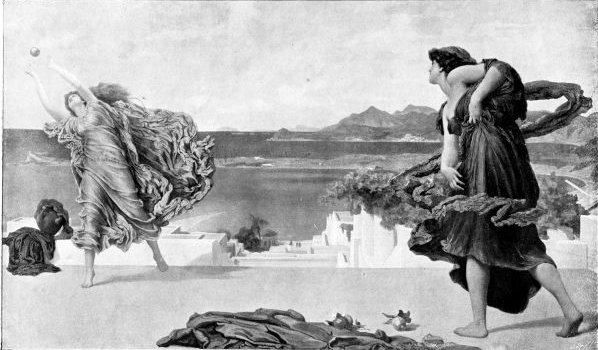 GREEK GIRLS PLAYING AT BALL.
GREEK GIRLS PLAYING AT BALL.From the Painting by the late Lord Leighton, P.R.A.
By Permission of the Berlin Photographic Co., Bond Street. W.
Title: The Harmsworth Magazine, Vol. 1, 1898-1899, No. 6
Author: Various
Release date: September 8, 2012 [eBook #40711]
Most recently updated: October 23, 2024
Language: English
Credits: Produced by Victorian/Edwardian Pictorial Magazines,
Jonathan Ingram, Nick Wall, Diane Monico, and the Online
Distributed Proofreading Team at http://www.pgdp.net
| "CHRYSANTHEMUMS CURLED HERE." | 579 |
| "OFF TO KLONDYKE." | 583 |
| LITTLE ROYALTIES. | 590 |
| LONDON'S LATEST LION. | 595 |
| THE HOME OF FOUR O'CLOCK TEA. | 605 |
| STATISTICS GONE MAD. | 609 |
| "A PRINCESS IN GREEN AND TAN." | 611 |
| 3,000 MILES ON RAILWAY SLEEPERS. | 619 |
| THE CURSE OF THE CATSEYE. | 623 |
| MICE WORTH THEIR WEIGHT IN GOLD. | 631 |
| A CROWDED HOUR | 634 |
| STRANGE KINDS OF MONEY. | 639 |
| CLEVER MRS. BLADON. | 645 |
| AN ENGINE MATCH BETWEEN ENGLAND AND AMERICA. | 651 |
| NATURE'S DANGER-SIGNALS. | 656 |
| IN PRAISE OF BABY | 661 |
| "MAN OVERBOARD!" | 662 |
| OUR MONTHLY GALLERY OF BEAUTIFUL AND INTERESTING PICTURES. | 665 |
 GREEK GIRLS PLAYING AT BALL.
GREEK GIRLS PLAYING AT BALL.A CHAT WITH A FLORAL BARBER.
By Alfred Arkas.
The chrysanthemum is the spoiled and petted darling of the floral world. She is as vain as any society beauty, and quite as much time is spent on her toilet and personal appearance. Though beautiful by nature, she scorns to show herself to her circle of admirers until the arts of the hairdresser and masseur have enhanced her loveliness.
Toilet goes a long way in this world, and many a social star owes half her triumphs to it. Particularly is this true of My Lady Chrysanthemum; for she well repays for any trouble that may be spent upon her.
You cannot paint the lily with any prospect of success, but the number of curls and frills and furbelows you may add to the dainty chrysanthemum bloom, and still leave room for the touch of a titivating hand, is endless.
There are tricks in every trade, and the same is true of most hobbies. Chrysanthemum showing and growing form no exception to the rule. You may have mastered the many little secrets of growing these glorious flowers to the best advantage, and yet be as far from inclusion in the coveted show prize list as though you were but a mere tyro.
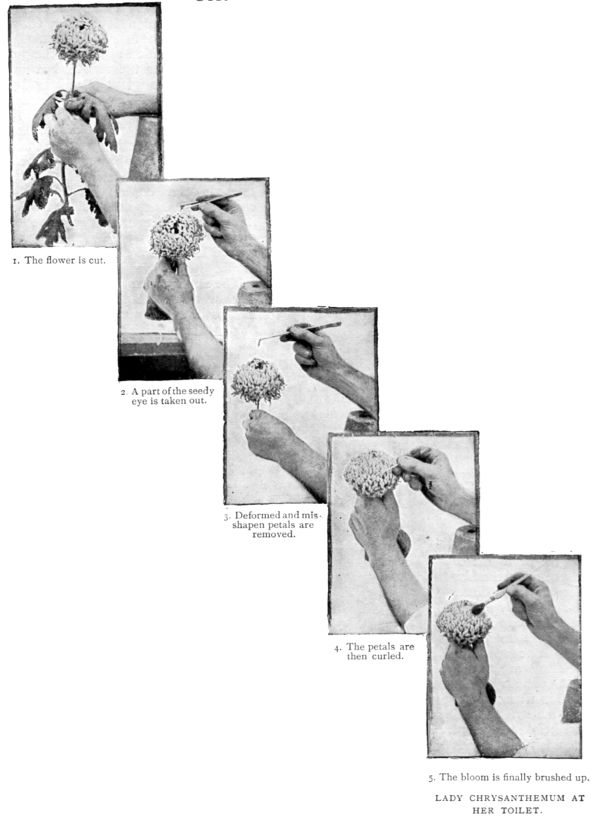 LADY CHRYSANTHEMUM AT HER TOILET.
LADY CHRYSANTHEMUM AT HER TOILET.As a matter of fact the best bloom that ever grew is one thing on the stalk and altogether another in the show box. If you saw some of the magnificent prize-winning and highly commended blossoms which are the feature of the great annual shows before they had been through the deft hands of the floral barber you would fail to recognise them. Glorious they are in their natural state; but, like a beautiful woman, their beauty is only set off the more by a fitting toilet.
How art may assist nature is admirably shown in the accompanying photographs illustrating My Lady Chrysanthemum in her natural state, and the same bloom dressed and cupped for show purposes. It will probably never have occurred to the majority of people that such dressing is a most important matter in preparing blossoms for exhibition, and it will be news to them that the preparation of this toilet is a matter requiring the greatest skill, and is only to be undertaken with complete success by the horticulturist who has made a special study of chrysanthemum growing and showing.
Such a one is Mr. Southard, who is at present growing prize blooms of all kinds for Mr. Kenyon, of Sutton, Surrey. Mr. Southard is one of the most successful growers in this country of the Japanese national flower. He is an exhibitor whose triumphs in the past are represented by innumerable first, second, and special prizes. And he is generally[Pg 580] recognised as one of the most expert chrysanthemum dressers to be found in a long day's march.
To him we are indebted for our knowledge of the secrets of floral barbering.
What a science this is may be more readily realised by a glance at our photograph of a set of instruments used for the purpose. These are specially made, and each has a special part to play in dressing the perfect specimen bloom.
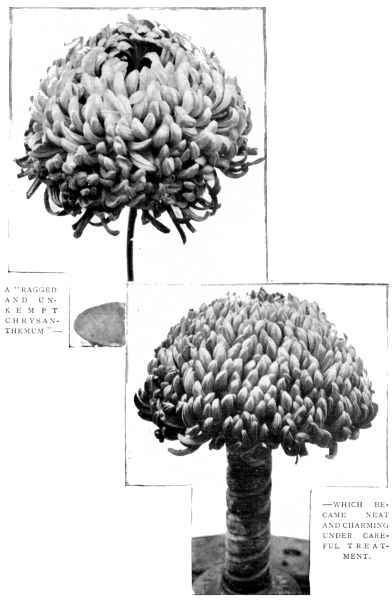 A "RAGGED AND UNKEMPT CHRYSANTHEMUM"—WHICH
BECAME NEAT AND CHARMING UNDER CAREFUL TREATMENT.
A "RAGGED AND UNKEMPT CHRYSANTHEMUM"—WHICH
BECAME NEAT AND CHARMING UNDER CAREFUL TREATMENT.
There are twenty-four varieties of chrysanthemums, but two in particular, the reflex and the incurved, are the subjects of artificial treatment. The accompanying series of photographs show the making of an incurved bloom's toilet from first to last. The first picture illustrates the cutting. To the uninitiated there would not appear to be anything particular about this; but mark one thing. The bloom is cut with a long stalk. This is an important matter: the reason will appear later on. The second photograph of the series illustrates the taking out of a portion of the seedy eye. This is a particularly telling part of the toilet, and goes a long way towards making the bloom show its best.
In the exhibition specimen the petals uniformly cover the flower, but as it appears on the plant it will probably show a considerable amount of centre; unless this is removed it causes an untidy hollow in the middle of the bloom. Portions of the seedy eye are generally removed while the flower is yet on the plant, and the petals then grow naturally towards the centre, and cover the cavity. However, in dressing the bloom it is usual to extract further portions, an operation performed by means of the special instrument shown in the photograph.
The next process is the removing of deformed and misshapen petals. Although not, perhaps, visible to the eye, there are sure to be a few of these lurking beneath the more perfect specimens. They must come out. If visible, they are an eyesore; if invisible, they prevent the others from falling into their natural positions, and so upset the harmony of the whole.
There is a steel forceps provided for this operation. However, the skill is not in using the instrument. Anyone can despoil the plumage of a fine bloom. The art lies in extracting the right petals, so as to give the exterior the best possible shape when finally dressed.
These various processes have taken a great deal of time, yet the bloom looks, if anything, less like a show specimen than it did when on the plant.
However, they are but a means to an end, and their use is soon apparent now that we come to the principal operation of[Pg 581] dressing. In this, order is evolved out of chaos, and in the hands of an expert the bloom immediately begins to assume an altogether different appearance.
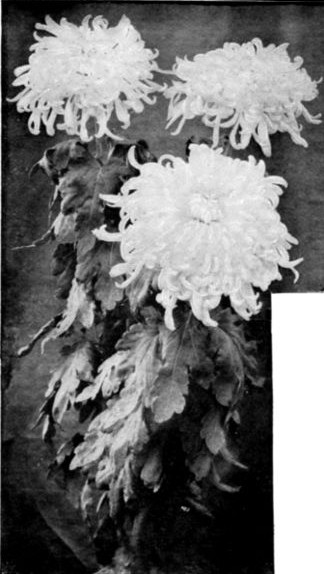 THREE SPECIMEN BLOOMS.
THREE SPECIMEN BLOOMS.
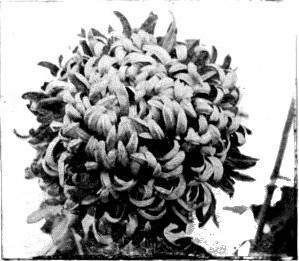 THIS "EDWARD MOLYNEUX" WAS NINE INCHES ACROSS.
THIS "EDWARD MOLYNEUX" WAS NINE INCHES ACROSS.
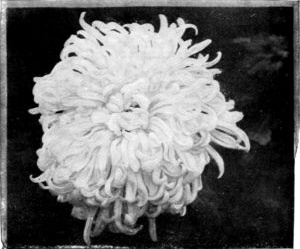 THE BLOOM HERE PHOTOGRAPHED—"MUTUAL FRIEND"—WAS TEN
INCHES IN DIAMETER.
THE BLOOM HERE PHOTOGRAPHED—"MUTUAL FRIEND"—WAS TEN
INCHES IN DIAMETER.
First it undergoes the operation of cupping. The cups are made of zinc, and vary in design according to the shape of the flower. The upper part closely resembles the socket of a candlestick. The outside is threaded, and screws into a cylindrical case containing water.
Now the reason of the long stalk is apparent. It is passed through the hollow till the lower petals of the bloom are pressed firmly on the plate, then the outer case is screwed on, and the flower is held as rigidly as though in a vice. The screw cup performs three functions: It waters the bloom, keeps it in position, and by pressing the under petals upwards accentuates its shape and size. The operation of dressing brings another instrument into use. It seems a simple matter to take hold of a ragged bloom and pat and stroke it into shape, curling a petal here, twisting another there. In reality it is a matter of great delicacy, and some years of experience are required before one may hope to obtain the best possible results, and even then some three hours may easily be spent in dressing a bloom.
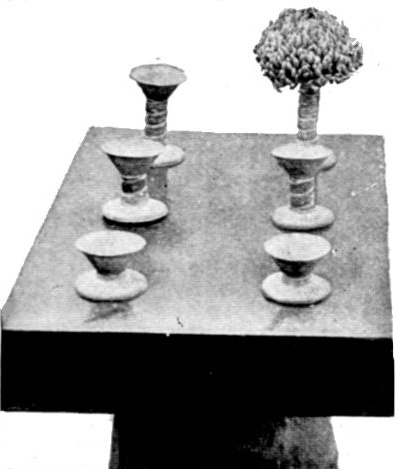 MY LADY CHRYSANTHEMUM'S TOILET TABLE.
MY LADY CHRYSANTHEMUM'S TOILET TABLE.
The imperfect petals underneath having gone, those outside readily respond to the touch of the instrument and spring into regular formation, while those at the top of the bloom are carefully curled to a common centre and effectively conceal all that was left of the seedy eye.
Under the deft touches of the master hand, the ragged bloom rapidly develops into a thing of greatest beauty. Each curl marks a great improvement, and when it is finished one readily realises how much there is in this as in other things for the amateur to learn.
A final brush up is now all that is necessary. A specially made camel-hair brush accompanies the set of instruments; with this the grower gently brushes the leaves till no speck dims their fair loveliness.
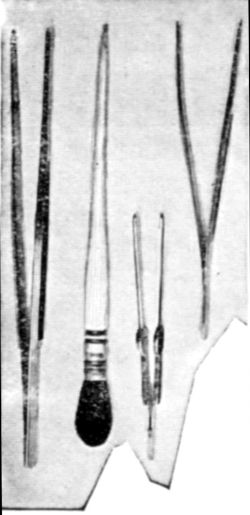 SOME USEFUL ARTICLES ON HER DRESSING-TABLE.
SOME USEFUL ARTICLES ON HER DRESSING-TABLE.
My lady's toilet is now completed, and she is forthwith placed in the show box, which is designed to hold six cupped blooms. This box consists of a slanting platform containing six holes, in which the cups are placed. The two at the top are partially unscrewed, the middle pair not quite so much so, while those at the bottom are screwed in tightly. This is called[Pg 582] setting-up, and is an art of itself. It arranges the flowers in tiers, so that those in front do not hide the blooms behind.
Skilled setting-up is worth several points, as it enables the blooms to show themselves off to the best possible effect, and at the same time favourably impresses the judge's eye.
The blooms are shown in specified numbers; generally, thirty-six, twenty-four, or twelve are required from each exhibitor. Nowadays, chrysanthemum blooms attain enormous sizes. We show two specimen blossoms. That known as "Mutual Friend," shown on the previous page, is ten inches in diameter; the other, "Edward Molyneux," at the left hand foot of the same page, is nine inches across. This is about the diameter of an ordinary plate.
Notable sizes are also attained in the plants themselves, and in preparing these for show there are divers little secrets.
In the illustration below Mr. Southard is standing between two specimen plants. Notice the difference in the general appearance of the twain. That on the left is ragged and unkempt, though it is in every way a show specimen. Compare it with the neat, charming effect of the plant to the right of the picture. Here is an instance of what a little show preparation will do for the plant itself. In the latter case, each bloom and stalk is trained up to a stick, and as a consequence perfect harmony is gained, and the plant shows at its best. In many cases these stalks have to be trained round corners, and describe wonderful curves in order to take up the places assigned to them. The space under the blooms and foliage is a forest of sticks, all engaged in carrying the long, pliable stalks to their rightful places.
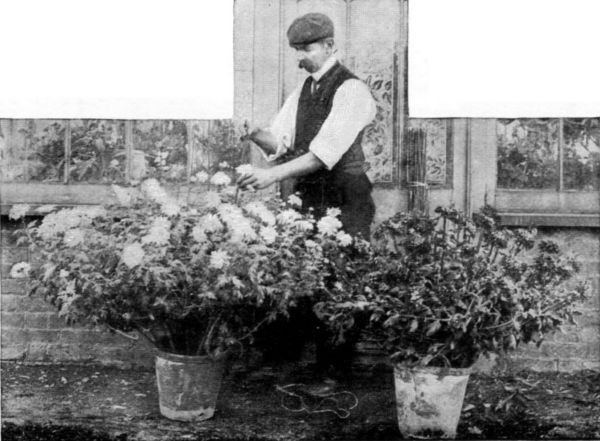 THE FLORAL BARBER AT HIS WORK. CONTRAST THE TWO PLANTS.
THE FLORAL BARBER AT HIS WORK. CONTRAST THE TWO PLANTS.
The untied plant on the left is a wonderful specimen. It measures over four feet across the top, grows from one stalk, and yet only occupies a twelve-inch pot.
Blooms from some of the choice plants are worth from three to five shillings apiece, while even cuttings will fetch the latter figure.
One of the great fascinations of show-chrysanthemum growing is the possibility of producing new blooms. Out of twelve exhibited flowers shown me at a recent show, nine were entirely new specimens. Like the orchid grower, the chrysanthemum lover is ever seeking floral novelties. In the ordinary way it takes some years to produce and fix a new flower. Endless patience, experiment, and knowledge are necessary to success; but here, as in most branches of floriculture, there is a strong element of luck, and the raw amateur sometimes purchases a cutting which turns out to be an extraordinarily fine specimen of a new variety.
This element of uncertainty undoubtedly constitutes one of the great charms of horticulture.
A STORY TO BE READ TO CHILDREN.
By Geo. A. Best.
Illustrated with novel Photographs from life by Arthur Ullyett,
Ilford.
"Wake up, Lessels!" said Stanley, in a hoarse whisper, shaking his younger brother as he spoke. "I've got a grand idea!"
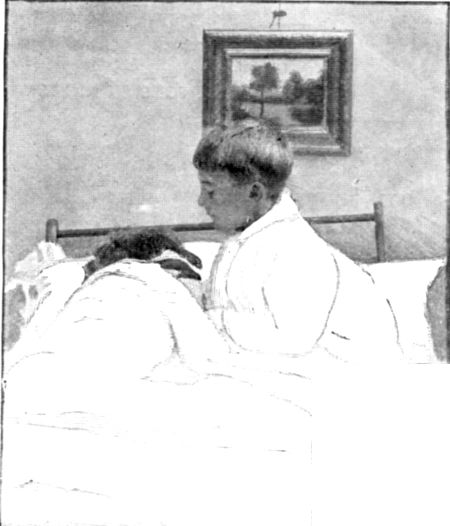 "'WAKE UP, LESSELS! I'VE GOT A GRAND IDEA!'"
"'WAKE UP, LESSELS! I'VE GOT A GRAND IDEA!'"
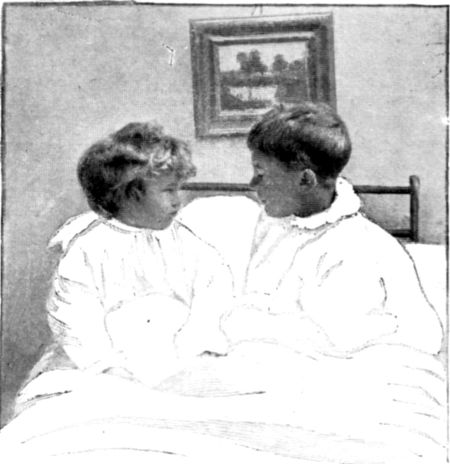 "'I'M OFF TO KLONDYKE, AND YOU'VE GOT TO BE MY PARD.'"
"'I'M OFF TO KLONDYKE, AND YOU'VE GOT TO BE MY PARD.'"
"Gimme a little bit then," answered Lessels, drowsily. "You had some of my chocolate cweam last night."
"You goose! Don't you know what an idea is?" retorted the elder boy, disdainfully. "It isn't anything to eat. It's a notion."
"Then you can have it all yourself," remarked Lessels, indifferently.
"Would you like a thousand pounds to spend on caramels and chocolate?" asked Stanley. "And a golden guinea to put in the bank till you are a man?"
"I'd like the chocolate," answered Lessels, with some show on interest. "An' I'd like a boxful of caramels; an' a barley-sugar lion; an' a real engine which would go by itself an' wun into things. An' I'd like a toy fire-engine, so that I could set fire to Madge's dolls' house an' put it out; an' a bucketful of ice cream, an'——"
"Don't speak so loud, you little duffer, or you'll get nothing at all!" interrupted the elder boy. "Just get out of bed at once, and dress yourself without dropping anything. We're off to Klondyke!"
"Off to what?"
"Klondyke—a place where you dig money out of the ground like coals. Big lumps of solid gold, what'll buy a whole shopful of toys, and tons of best London mixture and marzipan. See?"
"What about washin' our faces an' bweakfast?"
"Miners never wash themselves, silly; and they don't have proper breakfasts till they've made their pile."
"What's a miner, an' who's a pile?" asked Lessels, chasing himself across the room backwards to attach his braces to a rear button which was apparently running away.
"A miner's a man who digs gold up and washes it in a cinder-sifter," explained Stanley. "And he shoots everybody who comes near him except his pard. I'm off to Klondyke to be a miner before dada awakes, and you've got to be my pard."
"Who'll I shoot?" asked Lessels, with a defiant glare.
"Everybody but me," answered Stanley, condescendingly. "We'll want my best sixpence-ha'penny gun; several sticks of lead pencil to shoot; two spades; a cinder-sifter; an umberrellar to sleep under; our nightshirts; a loaf of bread, and a big knife."
"Shall we take Desmond in the mail cart?" asked the four-year-old "pard," innocently. "Desmond, an' a packet of sherbet, an' my toy engine, an' a chair to sit on, an' the kitchen lamp,[Pg 584] an' our bed, an' a few other fings to eat?"
"Babies and toys must be left at home," snapped the miner. "And how do you think we can carry a bed along? We must hunt for crabs to eat with our bread, and shoot birds and catch fish. Our Klondyke is really the beach, for I heard dada say last night that Southend was a regular Klondyke, as gold had been found on the sands. What a good job we live close to Southend, isn't it?"
"Hadn't we better tell dad we're going, an' get a penny to spend?" suggested the long-headed Lessels, ignoring his brother's question.
"A penny to spend!" echoed the elder boy, scornfully. "We'll have fifty thousand golden sovereigns to spend before this day week; and dad will forget to whack us when we buy him a new house, and a carriage with two horses and a footman, and an ounce of tobacco. And mamma shall have four splendid servants, and a sealskin jacket, and a bottle of scent, and a bicycle, and a new box of hairpins! I'm quite ready now, are you?"
Lessels answered with a somewhat doubtful nod, and the children crept silently downstairs. The kitchen door was successfully unbolted after a table and chair had been mounted by the intrepid Stanley, and the necessary materials for the outfit were rapidly collected from the neighbourhood of the washhouse.
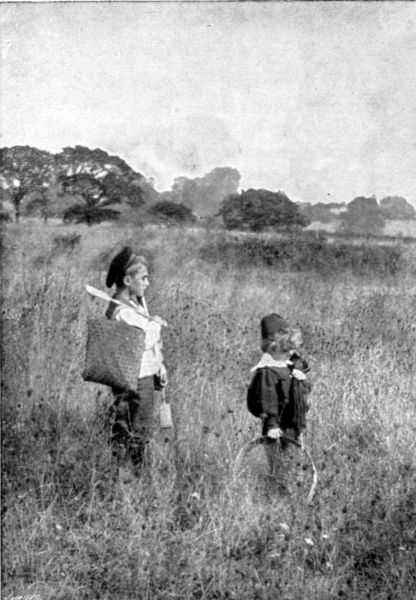 STANLEY AND LESSELS START FOR KLONDYKE.
STANLEY AND LESSELS START FOR KLONDYKE.
"I'll carry the umberellar, gun, and knife," whispered Stanley. "You can fetch along the cinder-sifter and the other things."
"I don't like to touch the shinder-sifter: it's got nasty worms and snails on," protested Lessels, whimpering. "An' if I can't carry the gun I shan't go, so there!"
"I've a great mind to put a lead pencil through you, you great baby!" hissed the miner, furiously. "You're a nice pard for a man to have, to be sure! Don't forget that my gun is loaded, and I'm not going to stand any nonsense, so just do as you're told. If you're afraid of a worm, what are you going to do when conger eels, sea serpents, and octopussys attack us?"
"Fight 'em to deaf!" answered the "pard," growing suddenly cheerful at the prospect of encountering large game. "Is the octopussy like other cats?"
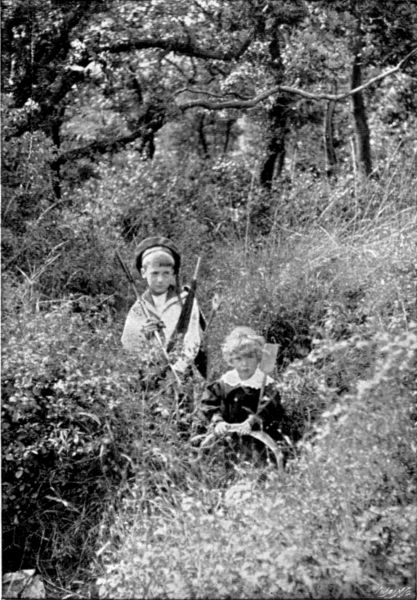 THEY MARCH THROUGH A DENSE JUNGLE.
THEY MARCH THROUGH A DENSE JUNGLE.
"It isn't a cat at all; it's a fish like a large spring onion with eyes in, and hundreds of roots which are all alive," explained[Pg 585] Stanley, as the expedition moved slowly across the first field.
After a long and painful march over a plain covered with thistles and long grass, succeeded by a dense jungle, the heavily laden "prospectors" reached the beach at a lonely spot some miles to the westward of Southend pier. Here the umbrella tent was erected, the gun reloaded, and the mining utensils carefully unpacked. The loaf was thoughtfully wrapped up in a nightshirt to preserve it from the effect of sun and salt water.
"We must stake out our claim at once," said Stanley, producing four clothes pegs from his pocket, and sticking one at each corner of a four-sided diagram hastily scratched on the sand with a spade. "All miners have to do this before they've been in Klondyke five minutes. And we must put up a notice that this claim belongs to us, so as to keep other gold hunters off. See?"
"Then we shan't have nobody to shoot," protested Lessels, in a disappointed tone.
"Dig up some sand, pard, and fling it into the cinder-sifter while I write out the caution in blue pencil," said Stanley. "And when all the sand has run through call me to pick out the gold."
And after seeing the first spadeful of sand fall into the sieve, the elder miner rapidly produced a notice worded as follows:—
"This is our clame. Tresspasers will be persecuted and shot. Vissitors are requested not to tuch the nugets."
"Anybody reading that warning won't dare to come within a mile of us," remarked the author, proudly, as he attached the notice to the ferrule of his "tent." "Any luck, pard?"
"Any what, Stan?"
"Luck—I mean have you found anything?"
"I've got a kwab, an' a cockle shell, an' an old shoe, an' a ginger-beer bottle," replied Lessels, with a yawn. "The bottle's got some beer left in, an' I'm very thirsty. Shall we have a dwop?"
"That isn't ginger-beer, it's sea water!" cried Stanley, warningly. "If you drink ever so little you'll go mad, and smash things and shoot yourself! Then I shall have to bury you in the sand, and put a wooden cross over your head, so that I can show dada where I left you."
"My head aches, an' I'm getting thirsty," protested the hard-working pard.
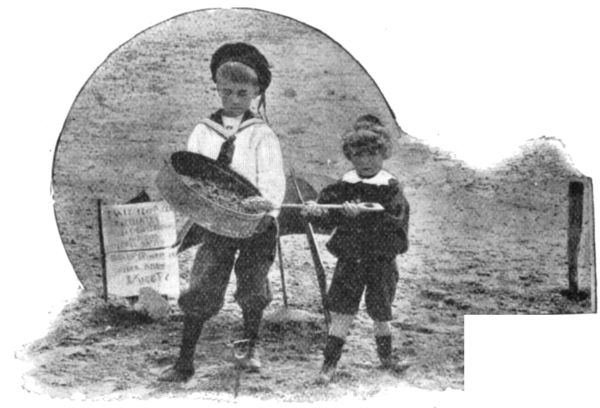 THEY DIG FOR GOLD, AND FLING THE SAND INTO THE
CINDER-SIFTER.
THEY DIG FOR GOLD, AND FLING THE SAND INTO THE
CINDER-SIFTER.
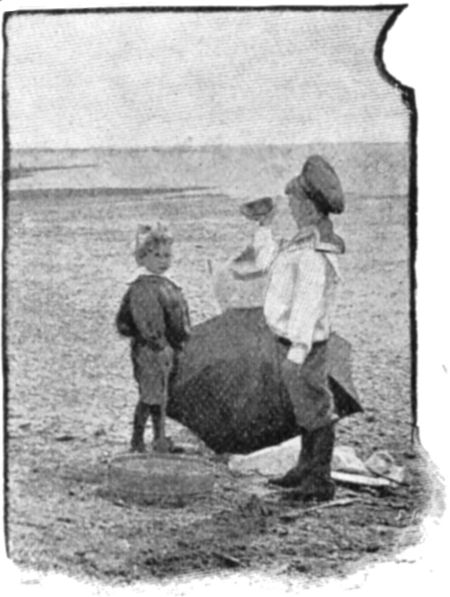 A BIG NUGGET IS DISCOVERED.
A BIG NUGGET IS DISCOVERED.
"You 'ave got gold fever, that's all!" said Stanley, impatiently. "All miners suffer from gold fever, but it doesn't often kill 'em. If we both work hard for a few minutes p'r'aps we'll find a tiny nugget that we can change for real ginger-beer and buns at the store. We'll have a splendid evening at the store after our day's work is done. All the boys will be there, and we'll drink more than is good for us, and fight and play poker."
"We haven't got any pokers to play with," argued the matter-of-fact Lessels. "An' there isn't any boys but us about;[Pg 586] an' there's no store where we can spend our nuggets, an' fight in. If you tell stories like that, Stan, you'll never get to——"
"The worst of you is you're so silly!" interrupted the elder boy, shaking the cinder-sifter vigorously as he spoke. "You never think anything's real that you can't see. When people get to know that there's millions of pounds under these sands there'll be cheap two-and-sixpenny excursion trains, full of wild miners, arriving here every few minutes."
"Will there be anything to eat an' dwink?" demanded the hot and thirsty pard, anxiously.
"Tons of it!" answered the senior digger, enthusiastically. "We shall use sweets an' sugar sticks for bullets, an' wash ourselves in real ginger beer. Miners always spend their money like that. They waste what they can't eat, and wash their faces in drink when they've had more than is good for them. It's a splendid life, isn't it, Lessels?"
"Which?" asked the pard, doubtfully.
"What's the use of explaining things to a fellow like you?" snapped Stanley. "Haven't I told you all about it?"
Lessels retired to the shelter of the tent without attempting to reply to either of these questions, and slowly divested himself of his shoes and socks.
"Now what are you going to do?" demanded the miner, angrily.
"Paggle," replied Lessels, pointing to the incoming tide, which was rapidly approaching the camp.
"Paddle!" echoed Stanley. "What sense is there in paddling before we've found a single ha'porth of gold? Hallo! Come here, quick!" he continued, excitedly, as something large and hard rolled from side to side of the sieve. "Oh, Lessels! I've found a monster nugget! Come and help me lift it out. Hurrah!"
"Wait till I get my sock off," replied Lessels, indifferently. "Is it weal gold?"
"Of course it is, you little duffer! Never mind your sock!" roared the excited miner. "It's a large, square nugget—yellow, and broken in two. I wonder who's stole the other half."
"Looks like a bwick," remarked the pard, suspiciously, after carefully surveying the find. "An' it isn't clean an' bwight like weal money."
"I tell you it's a nugget," replied the lucky miner, in a tone which was intended to put an end to all argument on the subject. "Keep the gun loaded; I guess we'll have some robbers along presently."
"Where can we spend it?" asked Lessels, anxiously.
"There's a stall where they sell ginger-beer and ice-cream, about half a mile along the beach," replied Stanley; "you can just see it in the distance. If you like, you can walk over there and bring back half a dozen of beer, three gipsy cakes, and about twenty sovereigns' worth of change. But don't let the storekeeper cheat you."
"I'll go!" declared Lessels, delighted by the prospect of obtaining some very necessary refreshment. "I'll go, Stan, and you can dig out plenty big nuggets, an' save 'em up till I come back. I'd better take the gun, so's I can shoot the man if he tries to cheat me."
"Don't forget the change!" cried Stanley, as he watched his little brother run rapidly away in the direction of the stall.
In ten minutes' time, a flushed and weary-looking little miner, hugging a piece of wave-worn brick, presented himself to the storekeeper, who was just in the act of[Pg 587] taking down the shutters of his timber-built shop.
"Well, my little man, what can I do for you?" asked the shopkeeper, cheerily.
"Half a dozen of ginger-beer, three gipsy cakes, and twenty sovereigns in change!" demanded the miner, breathlessly.
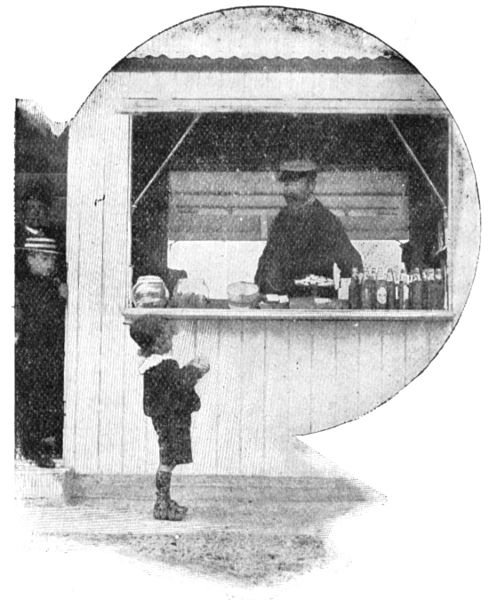 LESSELS TRIES TO CASH HIS NUGGET.
LESSELS TRIES TO CASH HIS NUGGET.
"Twenty sovereigns change!" echoed the man. "What do you mean, little one? Where's your money?"
"Here it is!" replied Lessels, boldly, laying the precious "nugget" on a plate of puff pastry, and assuming an attitude of defence. "Half a dozen of ginger cakes, three bottles of gipsy——"
"I can't give you all that for a brick," interrupted the shopkeeper, shaking his head. "You'd better run away and play."
"It isn't a bwick—it's a weal nugget," said the miner, with a scowl. "An' if you try to cheat me, Stanley said I must shoot you dead!"
"Here's a bottle of pop and your nugget for nothing," said the kind-hearted shopkeeper, with a laugh. "But don't bring any more brick ends or rubbish over here. Where are you going to take it to?"
"The camp."
"Where's the camp?"
"In Klondyke."
"Where's Klondyke?"
"On the beach, wight over there where Stanley is."
"Who's Stanley?"
"Stan's a miner, an' I'm his pard. We're diggin' up nuggets to spend in sweets, an' carriages, an' other fings for dada and mamma."
The tide had nearly reached the camp when Lessels returned.
"I haven't found any more nuggets, Lessels," said Stanley, despondingly. "Did you get the change all right?"
"No: I brought the gold back with me, 'cos the man said it was only a bwick!"
"Only a brick!" echoed Stan, with a dry sob. "I'm so thirsty and tired, Les."
"You've got gold fever, like I had," said Lessels, sympathetically. "Lie down an' west a bit while I dwink up the ginger-beer which the man gave me for nothing."
"All right, greedy!"
"I'm not gweedy, Stan, only thirsty. You can have a little dwop when I've cut the string an' shot the cork off. Then we'll go home to bweakfast, won't we?"
"It's nearly dinner time now, Lessels," said Stanley, sadly. "And we can't go home without a single nugget to buy presents with, or dada'll be sure to whack us."
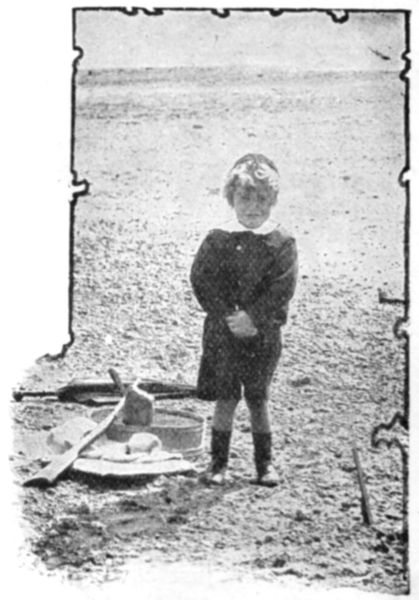 "'I DON'T LIKE KLONDYKE.'"
"'I DON'T LIKE KLONDYKE.'"
"I don't like Klondyke! I don't like Klondyke!" sobbed poor Lessels, a moment afterwards when[Pg 588] the ginger-beer cork flew skywards with a loud report, causing the bold miner to drop the bottle in dismay.
"You're a pretty pard to send on an errand!" cried the disappointed Stanley, as the greedy sand quickly absorbed the contents of the bottle. "Frightened of a ginger-beer cork! I wouldn't be such a cowardy custard! Here I am nearly dying of gold fever, and there's nothing to drink or eat but sea-water and dry bread."
"Poor old Stan!" said Lessels, with genuine concern. "Don't die an' leave me to find my way home all by myself. Let's lie down an' go to sleep a bit. Then we'll forget how hungwy an' thirsty we are, an' how dada'll whack us when we get home!"
"Dear old pard!" said Stanley, sleepily. "It was my fault bringing you here, and I ought to have all dada's smacks."
"Not all; nearly all," answered the loyal pard, with sublime condescension. "You can have all the biggest ones. I'm not gweedy! S'pose the tide comes up an' drownds us, what'll mamma say?"
"It serves us right," was the drowsy reply.
"An' dada?"
"Dada'll say he'll teach us to get drownded again!"
"An' baby Desmond?"
"Desmond'll say 'cuckoo'—he doesn't know any other words."
"An' the dog?"
The last question remained unanswered.
"Poor old Stanny's asleep," soliloquised Lessels. "I'll just cover him over with the nightshirts, an' the nugget bag what hasn't any nuggets in, so's he won't catch a cough an' keep me awake at nights. Then I'll lie down close to him, as I do in bed, an' have a west. I wish mamma was here to kiss me, an' I hope dad won't beat me harder than he can help!"
And in another moment absolute silence reigned in the camp, while the tide crept noiselessly and stealthily around the higher bank of sand which formed the children's Klondyke. The summer sun shone lovingly on a pair of still forms; and the warning to trespassers fluttered gently in the warm breeze.
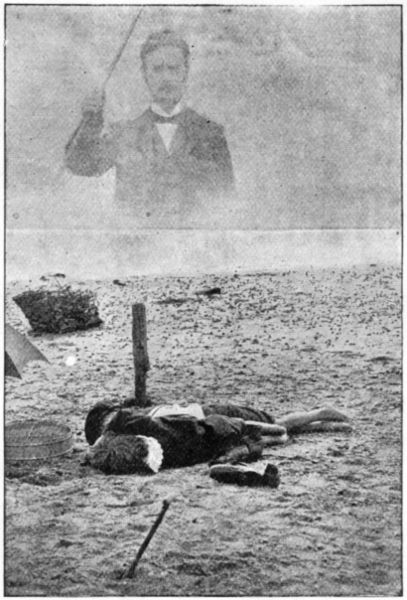 THE MINERS' DREAM OF HOME.
THE MINERS' DREAM OF HOME.
When a wave, bolder than the rest, broke against the bare feet of the younger miner, he awoke with a cry of alarm.
"Wake up, Stan! We're both drownded!"
"What's the matter?" demanded Stanley, sitting up and rubbing his eyes.
"We're in the miggle of the sea!" was the startling answer. "Our camp's all wet an' miserable, an' we can't shwim home, an' it's no use shoutin', cos there's nobody on the beach!"
"Lessels, we shall have to leave dada's umberellar, and the gold, and everything else, and fly for our lives," said Stanley, impressively, glancing anxiously towards the distant beach as he spoke.
"I can't fly," whimpered Lessels. "Let's call dada."
"He wouldn't hear us!"
"Dad heard me shout when I fell in a bucket of water at home," argued Lessels.
"This isn't a bucket of water, and we're not home now," replied the elder boy, irritably. "I believe I could swim all the distance to the beach—with one foot on the bottom. Then I could walk to the village and get a boat to bring you off; or[Pg 589] run home and get dada and the clothes line; or fetch one of the life-buoys from the end of Southend pier."
"I'll come and get a live boy, too!" exclaimed Lessels, clinging frantically to his brother, as a wave broke over his knees. "Don't leave me, Stanny; I'se so frightened!"
"I can't swim if you hold me like that!" said Stanley, rolling up his shirt sleeves with sudden determination. "You'll have to let me tow you to land by the hair of your head. Drowning people have to stun each other sometimes to keep one another quiet while they are rescued," he added, darkly.
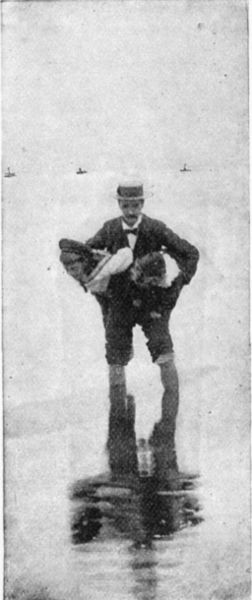 THE RESCUE OF THE MINERS.
THE RESCUE OF THE MINERS.
At this distressing moment a well-known form appeared on the beach, and the terrified miners shouted and waved their caps simultaneously.
"It's dada!" shrieked Lessels; "I knew he'd come. Look! he's walking in the sea, with all his clothes on; an' he's laughing; an' he hasn't got a shtick after all."
"What is all this about, boys?" asked the welcome visitor, pointing, as he spoke, to the fast disappearing camp.
"It's Klondyke, dada, that's all!" answered Lessels. "We digged for gold all day to buy you a lot of horses and tobacco, but we haven't found anything at all 'cept a bad nugget!"
"You're not the first miner who has done that, Lessels," was the comforting reply.
"I had a horrid dream about you, dad, when I was tired and fell asleep on the sand," said Stanley. "Guess what it was."
"Perhaps I was injured by one of the fine horses you were going to buy?"
"No, dad, it was much worse than that," was the earnest reply. "In my dream you were looking for us with a great stick in your hand."
"Dear old dad!" whispered Stanley, as he was being carried into safety, upside down, a few minutes later. "Dear old dad! You aren't very cross because we have lost your umberellar, and haven't got any nuggets, are you? And you won't turn nasty and spank us after we've made you laugh so?"
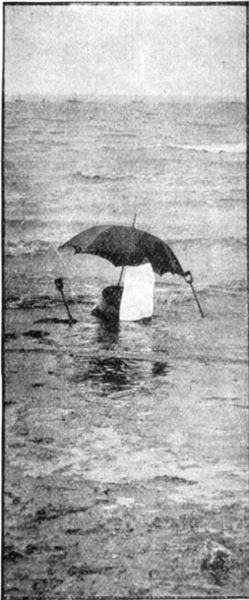 THE LAST OF THE CAMP.
THE LAST OF THE CAMP.
"Please don't, dada!" added Lessels, brokenly.
And dada only kissed the weary little faces of the supplicants, and laughed again until the tears ran down his cheeks.
"I believe dad's crying," said Lessels, in a stage whisper—"cryin' inside, an' laughin' outside!"
"Keep quiet, you little muff!" whispered Stanley, hoarsely. "Father looked like that when the doctor told him that I wasn't likely to die of fever after all. It's a laugh that stops crying."
"And one which is worth more than all the ordinary laughs of a lifetime, my boys," added the listener, quietly.
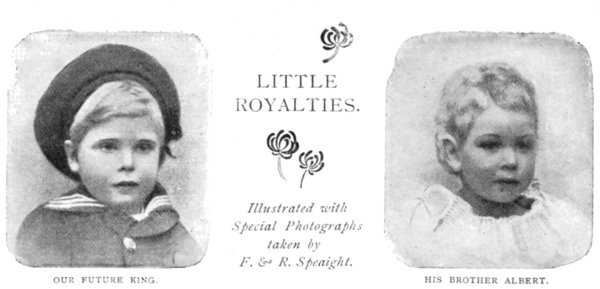 OUR FUTURE KING. | HIS BROTHER ALBERT.
OUR FUTURE KING. | HIS BROTHER ALBERT.
Illustrated with
Special Photographs
taken by
F. & R. Speaight.
Even in the days when the Queen's children formed a charming group of young people, high-spirited, intelligent, and enjoying, according to many passages in the late Princess Alice's letters, an ideally happy childhood, British Royal Nurseries were not better filled than they are at present, for in the immediate Court circle there are many young people, not one of whom can be considered in any sense grown up.
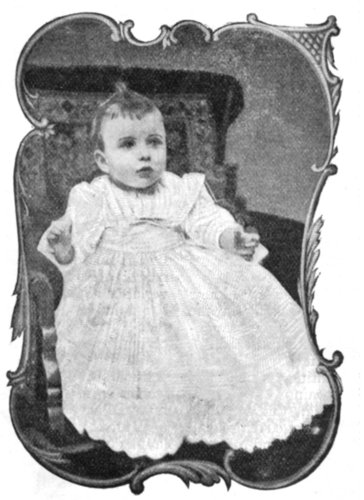 PRINCESS VICTORIA OF YORK, HIS SISTER.
PRINCESS VICTORIA OF YORK, HIS SISTER.
Prince Arthur of Connaught and his two sisters form the eldest group, being severally fifteen, sixteen, and twelve. The three children of the Duke of Connaught, though they are half German, for their mother was the daughter of the Red Prince, have received an entirely English form of education, Prince Arthur having been the first British Prince sent to Eton, and the two Princesses, Margaret and Louise, being educated at home, partly under their parents and partly under the Queen's supervision, for during the Duke and Duchess' stay in India their children remained in England, and so their short lives have been divided between Aldershot, Bagshot Park, and Windsor Castle.
To the same group of the Queen's British grandchildren may be said to belong the children of the late Duke of Albany and of Princess Henry of Battenberg. In each case they are much younger than Her Majesty's other grandchildren.
There is something very pathetic in the position of the Duchess of Albany: left a widow within two years of her marriage, and obliged, by the circumstances of her position, to remain in a foreign country, finding her only solace and interest in her two children, to whom she has proved a model mother. Till last year, when the Prince entered Mr. Benson's popular house at Eton,[Pg 591] Princess Alice and her young brother had never been separated for a single day. In this connection it may be stated that the Royal Princes when at school lead exactly the same lives as do other Eton boys. They are addressed by their masters and by their school-fellows as "Connaught" and "Albany," and though, as is natural, they generally spend any half-holidays at Windsor Castle, the Queen is most particular never to ask them out of hours, or to treat them in a way calculated to make them feel themselves favoured above the other boys.
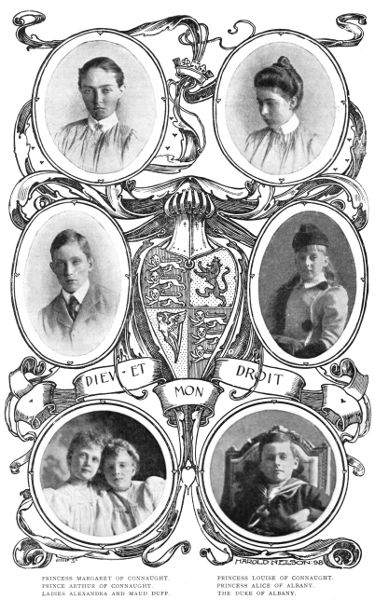 PRINCESS MARGARET OF CONNAUGHT.
PRINCESS MARGARET OF CONNAUGHT.The portraits of the Prince and Princesses of Connaught were specially taken by Mr. R. Speaight for this article, and most of the others taken by the same photographer are published by special permission of the Royal parents.
Princess Alice of Albany's great friend is her first cousin, the young Queen of Holland, and this in spite of the fact that she is three years younger than the girl-monarch. The Duchess of Albany has remained on very intimate terms with her sister, the Queen-mother of the Netherlands, and there has always been a constant interchange of visits between Claremont and the Dutch Court; indeed, the Duke and Princess Alice of Albany are the only members of the British Royal Family who can speak Dutch fluently, that language having been taught them by their Queen-cousin.
The four children of Princess Henry of Battenberg have had their childhood sadly shadowed by the death of their father, to whom they were all devotedly attached. In one matter their position differs very much from that of the other Royal children: that is, they have been thrown into peculiarly close relations with their venerable grandmother, and it is perhaps owing to this fact that the only girl among them, Princess Victoria Eugénie, is, although only eleven years old, said to be exceptionally intelligent and grown-up for her age.
Of Princess Beatrice's three sons, the eldest, Prince Alexander Albert, who is just twelve years old, is at school at Lyndhurst, but next year he will join the Britannia, for, like his uncle Prince Louis of Battenberg, he is very fond of the sea and wishes to enter the British Navy. Prince Leopold and Prince Maurice are too young for it to have been yet decided what career they will follow, but they will each enter a profession, for their position is a somewhat peculiar one. Unlike the young Duke of Albany, who was a peer from the moment of his birth, the children of Princess Beatrice have no legal rank, and their father, the late Prince Henry, was even desirous that they should not be habitually given the title of "Prince" or "Princess."
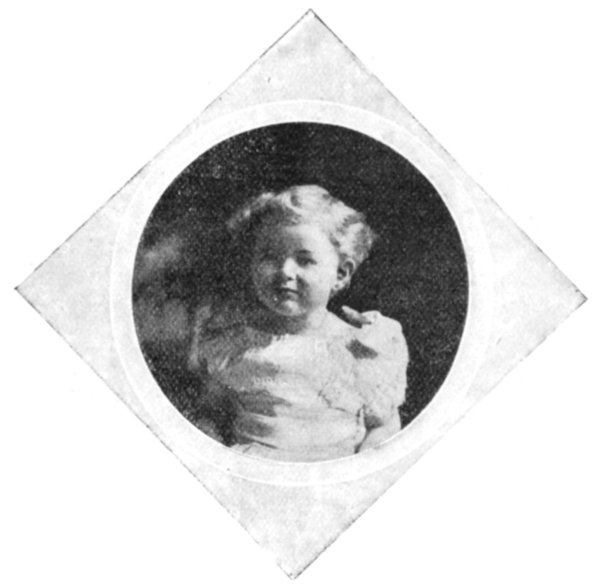 PRINCE GEORGE OF TECK.
PRINCE GEORGE OF TECK.
In this matter, however, the Queen overruled his objection, though, curiously enough, Her Majesty did not seem desirous of doing so in the case of the children of the Duke and Duchess of Fife, notwithstanding the fact that when the elder, Lady Alexandra, was born she was considerably nearer the throne than had been Queen Victoria herself at the moment of her birth. The question of whether the eldest grandchild of the Prince and Princess of Wales should or should not be given the title of "Royal Highness" was actually discussed at some length, but as both the Duke and Duchess of Fife were very anxious that their child should only bear the title and have the precedence accorded to a Duke's daughter, the matter was arranged that way. Subsequent events—that is, the birth of the Duke and Duchess of York's three children—have proved how wisely the parents of Lady Alexandra Duff acted in this matter. As it is, the Ladies Alexandra and Maud Duff are in the happy position of having all the privileges and none of the responsibility of Royal birth. They are so far the only younger members of the Royal Family who have never been out of the United Kingdom, their lives having been spent between London, Norfolk, and Scotland. They are being brought up in the very simplest fashion compatible with their rank; indeed, the only public appearance, since her birth, made by Lady Alexandra was when she acted as bridesmaid to her aunt Princess Maud of Wales.
Of course, from many points of view, by far the most important group of Royal children is that composed of the two little sons and of the baby daughter of the heir-presumptive.[Pg 593] Owing to the sad death of the Duke of Clarence there are only three lives between little Prince Edward of York and the throne, and far more care has been bestowed upon his education and general upbringing than is generally the case even with Royal children of so tender an age, for our King to be will not be five years old until the 23rd of next June.
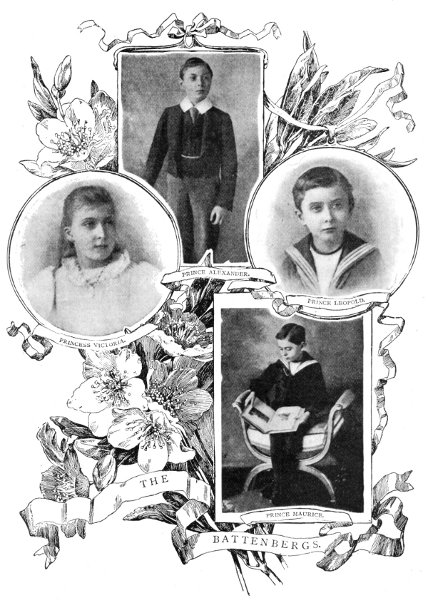 THE BATTENBERGS.
THE BATTENBERGS.As his names, Edward, Andrew, Patrick, and David, indicate, his grandparents and parents were anxious that the Prince should, from his birth, belong rather to the nation than to his family. It was seriously[Pg 594] proposed that he should share the Queen's carriage on Diamond Jubilee Day, but the idea was given up when it was realised that the long slow drive through the streets of London would be a terrible ordeal for a three-year-old baby; thus, although little Prince Edward's Jubilee clothes were actually prepared, he only wore them at home, to the disappointment of his young mother, who would have liked her son to have gone down in history as having taken part in so great and noteworthy a pageant.
The Duke of York's second son, Prince Albert Frederick Arthur George, was born on the anniversary of the deaths of the Prince Consort and of Princess Alice, and so was three years old on the 14th of last December. Two years younger is Princess Victoria Alexandra Alice Mary, the youngest but not the least of Her Majesty's British great-grandchildren.
The child of Prince Adolphus of Teck—whose wife, it will be remembered, was Lady Margaret Grosvenor, a daughter of the Duke of Westminster—is Royal in the same sense as are the Ladies Alexandra and Maud Duff, and it is rather interesting to note that the three children all stand in the same intimate relationship to the future King of England, though even Prince Edward of York was not legally entitled to the name of "Royal Highness" until a special decree was passed in favour of all the children of the Duke of York.
A word on Royal children from the photographer's point of view.
Mr. Richard Speaight of Regent Street, who took all our photographs except those of the Duke of Albany and his sister Princess Alice of Albany, which were taken by Messrs. Gunn and Stuart of Richmond, speaks enthusiastically of them—and he is now quite a connoisseur of children.
He says he is always struck by the natural and careful way in which the children are brought up. The younger ones are always most obedient to their nurses, and they, on the other hand, are very jealous in guarding their Royal charges. They do not even allow them to sit to be photographed without hiding behind to hold them in case they should fall.
The photographs of the Duke of York's children were taken at Sandringham. They took great delight in the musical and clockwork toys which Mr. Speaight took with him; and when the operation was finished, Prince Edward, shaking hands with his photographer, thanked him for the trouble he had taken.
THE COVER FOR BINDING OUR FIRST VOLUME.
Order at once.
Here is a small facsimile of the charming cover which has been designed for binding the first volume of The Harmsworth Magazine, which is completed with the issue of this number.
The colour of the cover is a very pretty pale green, and the ornamentation is very dainty in gold and black.
The design is copyright, and any local bookbinder infringing it will be prosecuted. The initials of Harmsworth Bros., "H. B.," will be found on the back and side of every genuine cover, and none should be accepted without them.
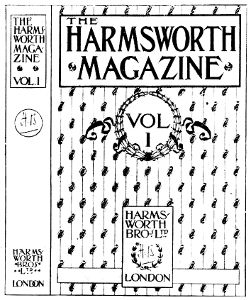 THIS IS A SKETCH OF THE PRETTY COVER FOR BINDING OUR
FIRST VOLUME.
THIS IS A SKETCH OF THE PRETTY COVER FOR BINDING OUR
FIRST VOLUME.
This cover can be obtained from any bookseller or newsman, price 1s. 3d., or it will be sent, post free, on receipt of 1s. 6d., on application to the Publisher, Harmsworth Bros., Ltd., 24, Tudor Street, E.C.
An Index to the volume is also now ready, price threepence.
Everyone should bind the six numbers of The Harmsworth Magazine, for they make a most delightful, attractive, and interesting volume.
AN EMPIRE MAKER'S LOVE STORY.
By Gilbert Dayle.
Illustrated by Fred Pegram.
It was dusk on a summer evening, as a tall broad-shouldered man made his way down a path that led through the Vicarage garden at Winchmere.
Reaching the roadway, he turned and, with one arm resting on the gate, gazed at the rambling house with its clustering ivy and old-fashioned windows.
"To all appearances just the same," he said, musingly, "yet how different it is—strange faces, strange voices! A short eight years, and I return to find my old friend dead, almost forgotten, and She vanished—swallowed up by the world!"
He sighed heavily, then turned and set out down the country road in the direction of the railway station.
"It's the bitterest disappointment I could have met with!" he went on; "but—I shall find her. Yes, I shall find her!" And as he spoke the step of the tall bronzed man quickened into a resolute stride.
Halton Towers, the country residence of Earl Kenwell, was a magnificent place, situated in the heart of Berkshire. On a certain morning in July, a governess and her two charges were sitting at a table in the schoolroom. The governess, a pretty girl of about twenty-four, was attempting to instil some elementary ideas of geography into the head of her eldest pupil, a boy some six years old.
Presently the door opened, and a party of people trooped into the room. Their leader, Lady Dorothy Kenwell, looked smilingly at the governess. She was young, and considered to be one of the most beautiful women in the country.
"You don't mind us coming in just for a minute, Miss Grahame?" she asked. "These absurd people declared that nothing would satisfy them but seeing the children."
Lord Scaife (to his intimates he was known as "Bobbie") stepped forward and laid a hand on the boy's shoulder, whilst his cousin, Miss Julia Crofton, put her arm round the little girl's neck and kissed her impulsively. A few feet away in the background stood the remaining member of the party, Count Morlot. He was a slimly built man of foreign appearance. A slight smile hovered round his lips as he watched the scene.
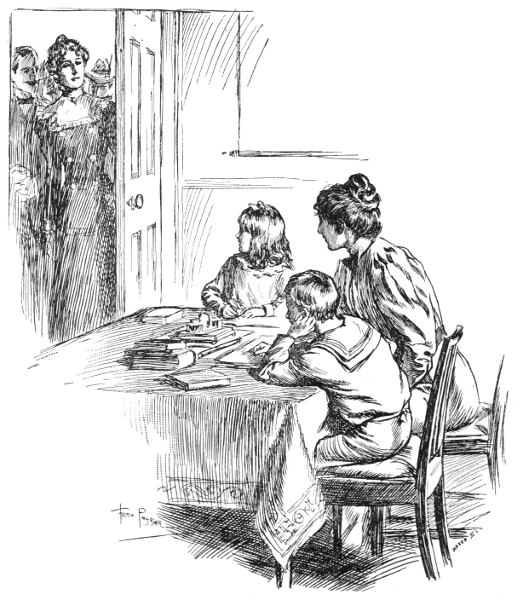 "'NOTHING WOULD SATISFY THESE ABSURD PEOPLE BUT SEEING
THE CHILDREN,' SAID LADY DOROTHY."
"'NOTHING WOULD SATISFY THESE ABSURD PEOPLE BUT SEEING
THE CHILDREN,' SAID LADY DOROTHY."
"Well, Jim, my lad," began Lord Bobbie, cheerfully, "what has Miss[Pg 596] Grahame been driving into your precious young head this morning?"
"Jogruffy," replied Master Jim.
Lord Bobbie bent down over the atlas that was open on the table.
"Africa, eh? Well, it's a great country, particularly the southern part of it. It's where the millionaires come from."
Lady Dorothy took hold of Jim's hand and guided it to a certain part of the map.
"Look, Jim, dear, this map is not up to date, and this piece I'm showing you should be coloured red—British, you know. The country is now——"
"British Kafangaland!" put in little Jim, eagerly.
"Bravo, youngster! Who told you that?" asked Bobbie.
"Miss Grahame," answered Jim, "and she said that it had nearly all been done by one man—a very good man."
Lady Dorothy shot a smile at Miss Grahame, then bent over her little cousin again.
"Yes, Jim, and he is coming here, this very morning. What do you think of that?"
Jim turned open-mouthed in his chair.
"Shall I see him," he gasped, "the man who has turned this big patch red?"
"Yes, my boy," laughed Lord Bobbie, "you'll see him, our most modern Empire-maker, the uncrowned King of British Kafangaland—London's latest lion——" He paused.
"Anything more, Bobbie?" queried Julia Crofton.
"No, I don't think so. I was wondering what qualities he possessed to have put him so far ahead of the other pioneers out there."
Count Morlot drew a little nearer to the group.
"In buccaneering circles," he remarked, with a smile, "the man who is most unscrupulous is the man who wins. Probably this fact accounts for Mr. Winn's marvellous successes."
Lady Dorothy drew herself up, and, swinging round, faced the Count. There was a touch of crimson on her cheeks.
"You have evidently never met Alan Winn, Count Morlot," she said, with flashing eyes. "He is the soul of honesty—and a true man!"
Without waiting for any reply, she moved quickly towards the door, and swept out of the room. There was a dead silence. All eyes were fixed on the Count. He gave a barely perceptible shrug of the shoulders, as he glanced at the door through which Lady Dorothy had made her retreat.
Julia Crofton was the first to speak.
"Come along, Bobbie," she said, "you promised to take me to see the fruit-garden."
"Certainly," replied Lord Bobbie, with alacrity. He crossed the room and opened the door.
"See you presently, Count," he said. "Good morning, Miss Grahame; ta-ta, Jim, don't be too much of a nuisance."
The Count waited a few seconds after the couple had disappeared, then bowed to the governess and took his departure.
Olive Grahame did not immediately return to the children. She stood staring absently into the middle of the room. There was still a picture before her, of a woman supremely beautiful, standing with lifted head, her glorious eyes flashing indignantly, as she defended the character of Alan Winn. She sighed softly.
"He cannot help loving her!" she whispered to herself. "It is better for him not to see me!"
She was roused from her reflections by a touch on the hand. Master Jim had slipped down from his seat and crossed to her.
"Miss Grahame," he said, pleadingly, "may I get my paint-box and put in that piece of red on the map. I shouldn't like the man who did it all to see my atlas, and then find it not there. May I?"
Olive Grahame bent down and kissed the eager young face.
"Yes, dear," she said, softly.
Meanwhile Julia Crofton and Lord Bobbie had found a pleasant seat in the garden. They were two young people who found enjoyment in discussing together the affairs of others, and incidentally their own. They did not love one another, and had not the slightest intention of doing so. They were simply, as Julia put it, "good pals." Lord Bobbie described his cousin, who was sportively inclined, not at all pretty, and addicted to the occasional use of slang, as a "brick"; and Julia returned the compliment by declaring that Bobbie was an "awfully good sort, with no nonsense to speak of about him."
Lord Bobbie lighted a cigarette.
"I'm hanged if I like that Frenchman!" he exclaimed. "Who is he, and how on earth did he get into Kenwell's house?"
"He is a protégé of old Lady Steele, and she had him invited here. She says that[Pg 597] he has such charming manners, and she trots him about everywhere with her."
"Wouldn't mind betting he's an adventurer," growled Bobbie. "He has got the cut of a Monte Carlo sharp. Didn't Dolly look fine as she snubbed him? If ever there was a case of a woman openly showing her admiration for a man, this is one. She positively adores Winn. Confound him!" he added, with an air of disgust.
"Poor old Bobbie!" said Julia, sympathetically. "It's a bit rough on you."
"And I was getting on so well with her," he continued, with a sigh. "I believe that in another week I should have won her. And then this Winn must needs turn up. I ought to hate him as a rival; I should like to, but, 'pon my word, I can't. He's such a good sort.
"Jove! how these fellows get on! Here we have a man, I don't believe he's touched thirty yet, been working like a nigger in some place or other, starts a new country, becomes the right-hand man of the company formed to run it, and in a few years he returns to his native land, pleasantly near to being a millionaire. I don't know how they do it!" he finished, despairingly.
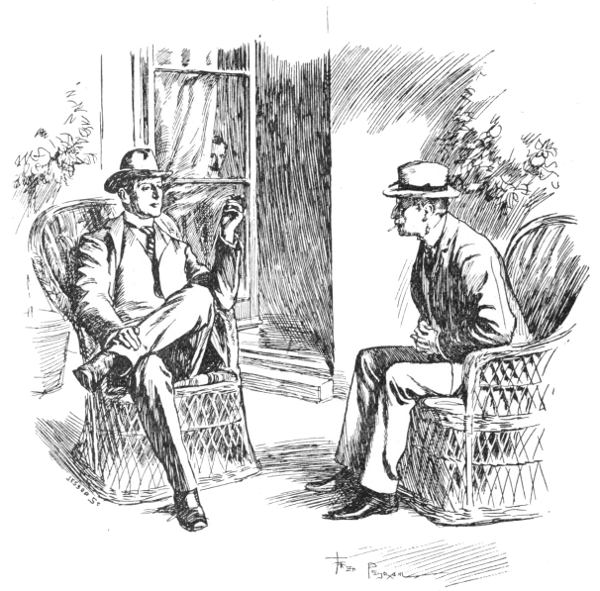 "'WOULDN'T GERMANY GIVE SOMETHING FOR THE CONTENTS OF
THAT WALLET!'"
"'WOULDN'T GERMANY GIVE SOMETHING FOR THE CONTENTS OF
THAT WALLET!'"
Miss Crofton glanced at her cousin's good-natured though somewhat indolent-looking face.
"I believe," she said, calmly, "the possession of a quality termed 'grit' frequently explains the mystery."
"And now," went on Bobbie, concernedly, "the beggar has the chance of marrying the loveliest girl in society. Anyone can see that Dolly idolises him, and that he has but to say the word, and she is his. Oh! it's disgusting!"
"Perhaps he won't say it," said Miss Crofton.
"Of course he will," replied Bobbie, warmly. "There is no man on earth who could possibly be such a fool as to refuse the chance. Why, Kenwell is Chairman of the Chartered Company of Kafangaland, and is dead set on the match himself. Oh! he couldn't be such a fool!" he added, shaking his head with an air of conviction.
Miss Crofton rose to her feet.
"Have you noticed, Bobbie, that a man never prizes that which he can have for the asking?" She paused. "I'll tell you what I'll do: I'll bet you a hundred cigarettes that Winn doesn't make this easy conquest."
"You're throwing your money away," said Bobbie, warningly.
"Are you taking it?" asked Miss Crofton, coolly.
"Oh," said Bobbie, with a shrug, "if you're set on it, certainly."
She glanced at the watch on her wrist.
"The Lion will be here by now. We had better be going in to see him. By the way, old man, you remember my preference for Turkish?"
"Oh, yes," replied Bobbie, smiling grimly; "but there will be no occasion to[Pg 598] tax my memory, I assure you. It's a 'cert' for me, worse luck!" he added, mournfully.
He rose from the seat, and together they strolled towards the house.
Alan Winn had arrived half an hour ago, and was now strolling on the terrace with Earl Kenwell, engaged in talking over business matters. A casual observer would have taken the pair for father and son. The Earl, although approaching his fifty-third year, was still erect, his complexion fresh, his eyes keen. Winn was perhaps a trifle the taller of the two; he had well-cut features, a determined-looking chin, and a pair of grey eyes that gazed steadily from their depths. From the other end of the terrace, Lady Dorothy, who was reading a newspaper to old Lady Steele, paused now and again to shoot a glance at the broad-shouldered man walking by her father's side.
"My dear," she heard Lady Steele's voice say, "I am deeply interested in what you are reading, but might I suggest that we proceed to the next paragraph? You have read that one three times."
Lady Dorothy blushed, and hurriedly turned her attention to the paper.
"I beg your pardon," she said, with an air of confusion, "I was——"
"In a day dream, I fancy, in which admiration for another person figured prominently," retorted the old lady. "I think I shall have to get the dear Count to read to me; he has such a charming voice. By the way, where can he be? I haven't seen him since breakfast time."
At the present moment, the Count was comfortably ensconced in a chair behind the library windows, and intent on perusing a recently arrived copy of the Figaro.
The library faced the terrace, and as the Earl passed with Winn he glanced casually into the long dark room. It appeared to be empty, for the window curtains effectually concealed the Count from view. The Earl caught hold of two chairs, and placed them in the shade.
"So you really think the scheme has a good chance?" he asked, anxiously.
Winn puffed a cloud of smoke from his cigar, as he dropped into a chair.
"Yes," he said at length, "I am confident that we shall succeed. I do not think it possible that anyone can have the least suspicion of my discoveries in the Vaarg Valley, or of what we contemplate doing there. We shall be first in the field."
Behind the curtains, the Figaro dropped slowly in the Count's hands. An alert look came into his eyes, and he moved his head nearer to the window.
"It's going to be the biggest coup ever effected in South Africa," continued the calm, confident voice. "I believe that in the Vaarg Valley we have another Kafangaland, although, of course, on a smaller scale."
"As good as that!" exclaimed the Earl.
"Yes, I believe so. I spent the whole of yesterday at the Colonial Office; the railway concessions have been granted, and practically everything is settled. Not one of our rivals dreams that we are making any move. Like myself, they are now all holiday-making. Even old Vorenbeck is in London staying at the Victoria."
"And what have you arranged?"
"Forster will leave on Saturday in the Tantallon Castle, with full authority to act on our behalf. In this wallet are all the plans, complete to the minutest detail, and also his instructions as to how to proceed."
"By Jove!" put in the Earl, "wouldn't old Vorenbeck, or rather Germany, give something for the contents of that wallet!"
"Vorenbeck, the old scoundrel," replied Winn, with a laugh, "would give anything up to twenty thousand pounds for the contents of that wallet, provided they were in his hands by to-morrow evening. But that contingency need not be entertained, for it will not leave my person until I hand it myself to Forster on Saturday."
Inside the library, the Figaro had slipped quietly to the ground, and the Count was staring hard in front of him, a curious expression in his eyes, as he pulled thoughtfully with one hand at his moustache.
There was a clatter of feet on the terrace, and the children ran up to their uncle. They were followed by Lady Dorothy, who shot a playfully reproachful glance at Winn. She had been dismissed by old Lady Steele as an incompetent reader.
"Kafanga, toujours Kafanga!" she said, with a smile.
"But it was really necessary," he replied; "there shall be no more of it to-day, on my word of honour."
She stooped and laid a hand on Jim's curly head.
"This is my little cousin, Jim," she said.
Master Jim was staring open-mouthed[Pg 599] at Winn. Under his arm he held a book of some kind.
"Jim," continued Lady Dorothy, "this gentleman is——"
"I know," blurted out Jim, without waiting for the introduction to be finished. He hastily opened the book and turned over the leaves with feverish impatience. Finally he selected a page and held it out for Winn's inspection.
"I know," he went on, his finger pointing to a red daub at the bottom, "you're the man who did this."
Winn looked, and saw that a map of South Africa was before his eyes. He laughed as he grasped the compliment.
"Yes, it's British now, right enough," he said.
Jim nodded. His gaze was fixed wonderingly on the bronzed face of the tall man. Then a sudden eager look spread over his face.
"Well," asked Winn, with a smile, as he noticed the pleading glance, "what is it?"
Jim hesitated shyly for a moment, then burst out in his childish treble—
"I want to know how you did it?"
Winn laughed again, and caught the boy up and placed him on his shoulder.
"Come, that's not a fair question," he said; "it's a State secret."
"And, like most State secrets, everyone knows it, and is proud of it," put in Lady Dorothy, with a smile at Winn.
Her glance drifted up to Master Jim, who looked supremely happy in his lofty position.
"You'll understand one day, Jim," she added, "how these things are done, when you're grown up."
"When I'm grown up," retorted Master Jim, confidently, "I'm going to do the same myself."
"If we go on at our present rate, there won't be any of South Africa left for him by that time," said the Earl. "We shall have to discover a new field for him to operate upon. But there is no immediate hurry. What do you say to our visiting the kennels in the meantime?"
"Delighted," said Winn, and the whole party moved off slowly down the terrace.
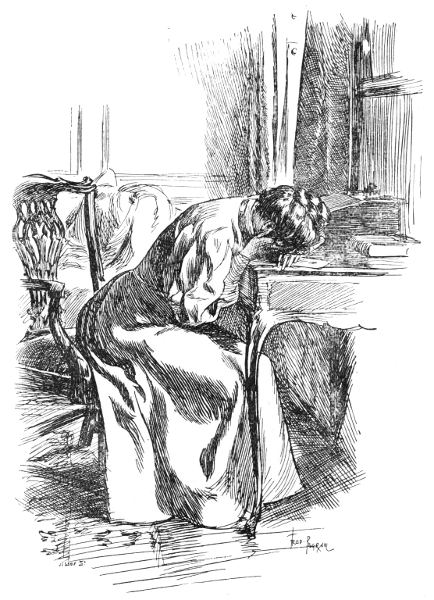 "MISS GRAHAME BURIED HER FACE IN HER HANDS—SHE WAS
CRYING."
"MISS GRAHAME BURIED HER FACE IN HER HANDS—SHE WAS
CRYING."
As soon as they were out of earshot, the Count got up leisurely from his seat. Producing his case, he lighted a cigarette. He puffed at it reflectively.
"Twenty thousand pounds," he said, softly; "yes, Vorenbeck would certainly give that for the Vaarg Valley plans—" he paused—"and it happens that I am a poor man."
He moved across the room towards a heavily-curtained doorway.
"But how," he muttered, "how is it to be done?"
He pulled the drapery aside, then started back in surprise. Miss Grahame was standing in the space between the curtains and the door. In one hand she was holding a book.
He looked at her suspiciously. He noticed that the door was closed behind her. How long had she been there? What had she heard?
She returned his gaze almost defiantly.
"I came to replace this book," she said, simply, then stepped forward.
He bowed to her in silence, and passed out of the room. She stood for a moment with her eyes fixed on the door through which he had disappeared.
"Oh!" she exclaimed, "if I could only warn him!"
She stood for some minutes staring absently out of the window. Suddenly the sound of voices caught her ear, and she turned her head. She drew back quickly behind the curtain, as round the corner of the terrace Lady Dorothy appeared with Winn. He was smiling, and she was laughing happily into his face. It would have been difficult to picture a more perfect pair.
Olive Grahame stood for a few moments immovable, her eyes fixed on Winn. Then, as they came to within a few feet of the library window, she turned with a quick movement and hurried away. She made her way upstairs, and, gaining her room, shut the door. On the opposite side by the window stood a table, on which was an old-fashioned leather-covered desk. She crossed to this, and, unlocking it, began to turn over some papers. Presently she came upon a photograph. She held this before her and gazed at it steadily for some seconds. Suddenly it dropped from her grasp, and, sinking into a chair by the table, she leant forward and buried her face between her hands. Miss Grahame was crying.
The day passed pleasantly enough for Earl Kenwell's guests. They lunched, played tennis, drove, and after dinner there had been some music. Lady Dorothy sang, and Julia Crofton whistled—she was an accomplished amateur siffleuse. The ladies having retired, Lord Bobbie volunteered to play billiards with the Count. After one game, however, Bobbie, who had been yawning a good deal, remarked that he was extremely tired, and suggested that they should go to bed. The Count assented, and together they made their way upstairs.
Winn and the Earl had repaired to the latter's study with the intention of talking business. For an hour they discussed the Vaarg Valley scheme in all its bearings.
"Well, we have done everything we can," said the Earl, as a concluding remark, "the rest we must leave to Providence."
There was silence for a few moments. Winn puffed at his cigar, his eyes idly following the rings of smoke. From the other side of the room the Earl was subjecting him to a close and critical observation. He had no son of his own; as he noted Winn's splendid proportions, the look of indomitable resolution in his face, he felt that had he been blessed with one, he would have wished him to be like this man.
Then he thought of his daughter, Dorothy. He was not blind, and had been quick to observe the state of her feelings. He loved his daughter, he liked Winn. He had given the matter his close consideration, and had arrived at a decision. It was this decision which prompted him to speak now. He intended to hint to Winn that his engagement with Lady Dorothy would be entirely to his satisfaction.
"You say you will be returning to Kafanga in September?" he began.
Winn roused himself from his reverie.
"That was my intention," he replied; "but I have something to accomplish first, something——" He paused.
The Earl had his keen eyes fixed on him.
"Forgive me, Winn," he said, quietly, "I am not asking out of sheer curiosity, but the 'something'—is it a question of marriage?"
Winn looked straight across at the Earl.
"Yes," he said, simply.
The Earl rose from his seat and stood with his back to the mantelpiece.
"My dear Winn," he said, "I think I am right in saying that there is no one who wishes more to see you happily married than myself." The Earl paused. "And surely," he added, "with your reputation there should be no difficulty in achieving this end."
Winn shook his head slowly. The Earl[Pg 601] glanced across at him, and for a moment their eyes met.
"Why not tell me?" said the Earl, gently.
Winn appeared to hesitate for a moment.
"You are very kind," he said at length. "It began when we were boy and girl——" He stopped, for the Earl's cigar dropped through his fingers to the ground, and he stooped to pick it up.
"Yes?" said the Earl, in a low tone. He was thinking of the disappointment in store for his daughter.
"She was the daughter of a country vicar under whose care I had been placed," continued Winn. "Then, I was suddenly thrown on my own resources, and there came the chance of my going to South Africa. We parted, and I vowed that I would come back to claim her.
"The day after I returned," he went on, speaking slowly, "I made my way down to the old place. I found the vicar dead—and she gone. I have searched everywhere, but can find no trace of her."
He rose to his feet.
"But I shall find her, I shall find her!" he said, and his voice had the same confident ring as when he uttered the words that night at Winchmere.
The Earl did not speak for a moment or so; then he stepped forward and held out his hand.
"I sincerely hope you will," he said; "if ever a man deserved a good wife, you are he."
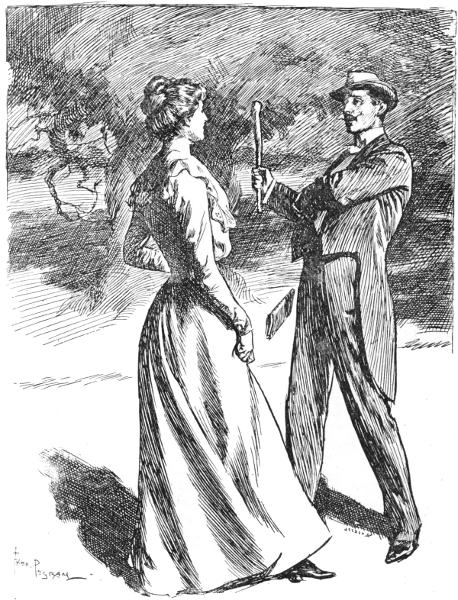 THE COUNT HELD A HEAVY STICK IN HIS HAND, BUT THE WALLET
SLIPPED TO THE GROUND.
THE COUNT HELD A HEAVY STICK IN HIS HAND, BUT THE WALLET
SLIPPED TO THE GROUND.
Winn grasped the proffered hand.
"Thank you," he replied, simply.
"By Jove," continued the Earl, with a glance at the clock, "I didn't notice that it was so late! Shall we be going to bed?"
Winn had turned to the window and drawn aside the curtains. He passed a hand restlessly over his forehead.
"I think, if you don't mind, I will smoke a last cigar on the terrace. I don't feel sleepy, and the air will do me good. But please go on yourself. I know my way about perfectly."
The Earl demurred.
"I insist," said Winn, smilingly. "If you do not go, I shall have to give up my stroll."
"Well, if you're determined, that settles it," said the Earl, with a good-humoured laugh. "I have my recollections of the firmness of your decisions. Good-night."
Left alone, Winn lighted another cigar, then unfastened the French windows and stepped on to the terrace. He walked to the end, and stood at the top of the steps leading to the front entrance. He descended these, and started to stroll down the avenue of trees that stretched for half a mile to the park gates.
He did not know that from a window he was being watched by a pair of eyes—eyes that were shining with the eagerness that proclaims but one feeling in a woman. Olive Grahame, fully dressed—she had not the slightest inclination for sleep—was sitting at an open window, her gaze riveted on the tall figure that was fast disappearing from her view. Suddenly she gave a slight start, then strained eagerly forward. There was a brilliant moon, and across a small piece of turf she had seen a dark shadow move quickly. She looked intently. There was no mistake. She saw the shadow move again, then finally vanish into the blackness of the trees.
She got up quickly, her hand trembling with excitement. Someone was following Winn, hiding from him behind the trees! She stood for a moment in the middle of the room, thinking. One fact was clear before her: Alan Winn was in danger, and she was the only person who knew of it. Without a second's hesitation, she crossed her room, opened the door, and crept along the passage until she reached a staircase. She was well acquainted with the house, and knew a way by which she could gain the terrace. She reached the library, and found the window half open. Someone else had evidently used this means of exit. She guessed who.
In another minute, she had crossed the terrace, run down the steps, and was speeding quickly down the avenue. She had gone barely a dozen paces when her eye caught sight of a tiny patch of white ahead of her. It grew bigger, and she realised that it was coming towards her. A few yards more and she almost ran into the arms of the Count. He was in evening dress, and in one hand held a short, heavy-looking stick. With the other he was attempting to slip something into his pocket as he ran. As he met Olive, he drew back with a nervous start, and it slipped through his fingers to the ground. She pounced on it; it was a leather wallet.
Recovering from his surprise, he caught hold of her wrist. His face grew livid with rage.
"Give that to me, you little fool," he said, breathing heavily.
"What have you done to Mr. Winn?" she panted; "tell me, else I'll scream for help."
He glared at her savagely. Then, letting go her wrist, he drew back a step and raised the stick, as if about to strike her.
"Will you give that——?" he began, threateningly, then broke off with an oath.
Olive had seen her opportunity, and darted off down the avenue. He did not dare to follow her. She ran on for some fifty yards, then caught sight of a dark heap lying on the ground. In a moment she was kneeling by his side, peering eagerly into his face.
Winn uttered a groan, then slowly opened his eyes. His head was tough, and it took a heavier blow than the one which the Count had dealt him to effectually lay him low.
"Where am I?" he said, in a dazed tone, raising himself on one elbow. His hand flew to his pocket. "The wallet?" he cried.
She pressed it into his hand. He clasped it, and his eyes travelled up to her face. For a moment he stared at her in absolute wonderment.
"Olive!" he gasped, "is it really you, my darling?"
She was trembling, but looked into his face with smiling eyes.
"Really me," she said.
Slowly and unsteadily he rose to his feet.
"It is bewildering," he said. "I am knocked on the head in some mysterious fashion, and the plans are stolen. I regain consciousness, and find you by my side with the wallet. What does it all mean?"
She told him what had happened.
"Wonderful!" he cried at the conclusion, catching hold of her hand, "to think that you, of all people, should come to my aid in this fashion! Do you know, Olive, I have thought of you every day during the last eight years; and now——" He paused and looked into her face.
"Ah! now," she said, falteringly, "our positions are so different. Remember, I am only a gov——"
"You are the woman I love," he interrupted; "and do you think I can let you go—after this? Olive, you cannot—you must not ask it of me! My dearest, you——?"
He stopped and looked into her eyes for the answer. Then, satisfied by what he saw there, he drew her gently to him.
At the breakfast table the next morning there was one absentee. The Count had been suddenly called away and had left by the early train.
"Extraordinary!" remarked Bobbie Scaife. "I wonder what was the reason?" he added, looking across at Winn.
Winn gave no reply. His thoughts at that moment were centred on a young person who, in the schoolroom, was continuing her lesson with Master Jim.
Jim had found something wanting in his lesson that morning. He looked up at his governess with a troubled expression.
"You don't seem to be thinking about my jogruffy at all, Miss Grahame," he said, at last, in rather an aggrieved tone.
Jim was a keen observer. Her thoughts had been far away from the consideration of the natural products of Canada. She turned to him now with a smile.
"We'll have to make up for it to-morrow, dear," she said. "See, it is your time for going out."
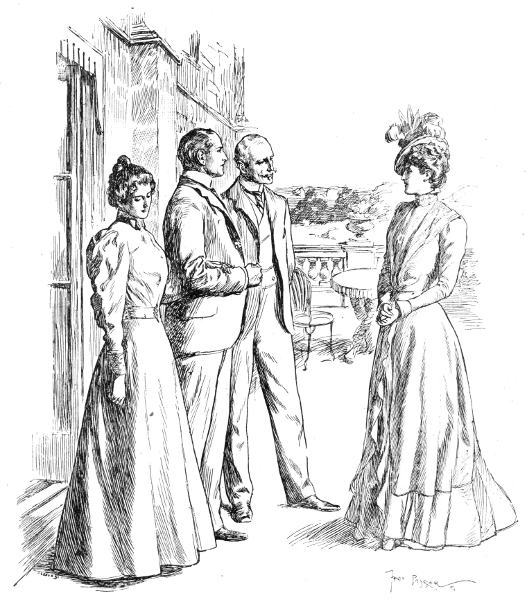 AN AWKWARD MOMENT—WINN TELLS LADY DOROTHY THAT OLIVE IS
TO BE HIS WIFE.
AN AWKWARD MOMENT—WINN TELLS LADY DOROTHY THAT OLIVE IS
TO BE HIS WIFE.
A few moments afterwards a servant[Pg 604] appeared and took charge of the children.
As the door closed behind them, Olive Grahame strolled to the window and looked out across the park. The sun was shining and everything was tinged with its gold.
"It's wonderful," she murmured, "after all these years!"
There was a tap at the door. She turned and saw Earl Kenwell entering the room; with him was Winn.
The Earl crossed to the window and held out his hand.
"Miss Grahame," he said, with a smile, "will you please accept my congratulations? My friend Winn has been telling me how he has been hunting the country for you, and found you at last under my roof. He has also told me how you pluckily saved the Vaarg Valley plans from our rivals; and after hearing the story, I took the liberty of telling him that he is an exceptionally lucky man to have gained such a woman for his wife."
"You are very kind," murmured Olive, with a blush.
The Earl pushed open the French windows and led the way on to the terrace. Winn linked his arm within Olive's and followed.
"If ever I meet that scoundrel Morlot," remarked the Earl, "I'll——"
There was a rustle of a dress on the terrace, and a second afterwards Lady Dorothy appeared in view. The Earl shot a half-nervous glance at Winn, then turned to meet his daughter.
"Dolly," he said, and his voice was more affectionate than usual, "we have some surprising news for you."
Lady Dorothy had come to a sudden stop, and her eyes were fixed on Olive and Winn, whose arms were still linked.
"It appears," continued the Earl, and his voice grew even softer, "that Miss Grahame and Mr. Winn are old friends—very old friends—" he paused awkwardly, "that is, they knew one another before he went to Africa." Again the Earl paused.
Lady Dorothy was still standing with her gaze riveted on the pair. She saw the whole affair at a glance, and her heart seemed to grow cold within her.
"Yes, Lady Dorothy," said Winn, coming to the Earl's rescue, "Olive and I have loved one another for ten years, although separated most of the time. We have met again, and she has promised to be my wife."
There was a moment's dead silence. Olive glanced up timidly, and her gaze met that of Lady Dorothy. Both women knew that the other loved Alan Winn; but one counted her love by years, the other by days. One had dreamed, hoped, counted on being his wife, and she had lost. The other knew all this, and her heart went out in sympathy to her rival.
Lady Dorothy looked at the pretty flushed face; the grey eyes seemed almost pleading in their wistfulness. She felt she could not hate this girl. With a sudden movement she stepped forward and held out her hands. Olive grasped them eagerly.
"I hope," said Lady Dorothy, and her voice had a slight tremor in it—"I hope you'll be very, very happy."
Then she released her hold of Olive, and, without another word, hurried away. The Earl turned his head and watched his daughter disappear. There was a suspicious moisture about his eyes as he faced Winn again.
"You two would perhaps like to be alone," he said, forcing a smile, "so I'll wish you au revoir for the present," and he too hastened away.
The pair stood silent for a moment. Then she touched him lightly on the arm. He bent his head and looked at her inquiringly.
"What is it, dearest?" he asked.
"I hope," she said, softly, "that some day she will marry someone worthy of her—someone whom she will love as much—" she paused, and looked into his face—"as much as I love you."
He pressed her gently to him and kissed her lips.
"I hope so, too," he said; "she is a good woman."
Events happened as they wished; for, a year later, the engagement of Lady Dorothy to Lord Scaife was announced.
"Awfully glad, old chap," remarked Julia Crofton, as she tendered her congratulations; "you didn't go particularly strong at the start, but you picked up splendidly at the finish. I didn't think you had it in you," she added, candidly.
"Oh," replied Bobbie, with a happy laugh, "as with those successful fellows from South Africa, it's the 'grit' that tells."
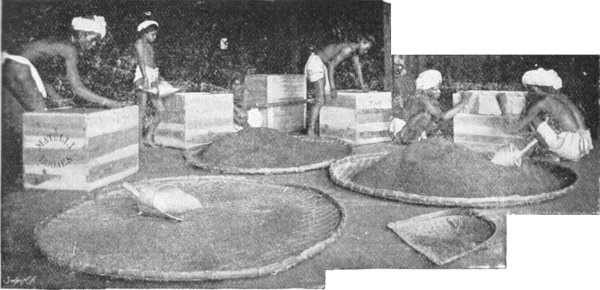 PACKING TEA FOR EXPORT.
PACKING TEA FOR EXPORT.SOME GOSSIP NOT OFTEN HEARD.
Of the millions of people who drink tea, very few seem to know how it is grown or manufactured.
They would hardly believe that there are just on 800,000 acres of land planted under tea in India and Ceylon, employing over one million people—all British subjects. Just imagine employing a fifth of the population of London for the production of one article! Then, again, look at the thousands of people who are employed in the tea trade at home—merchants, dealers, brokers—all dependent on this one article of consumption for their bread-and-butter!
And yet hardly ten per cent. of these know anything about tea manufacture, or have ever given a thought to the one million of people employed in its production.
The duty paid to the Customs during the past twelve months on Indian and Ceylon tea amounted to £3,805,935, to say nothing of the revenue accruing to the Indian and Ceylon Governments in taxes and a hundred and one little charges, all helping to swell the coffers of State, and enabling hundreds of thousands of people to maintain a living.
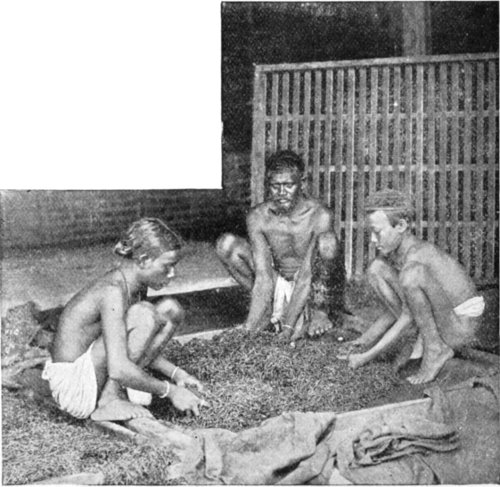 TURNING THE LEAVES FOR FERMENTATION.
TURNING THE LEAVES FOR FERMENTATION.Surely all these things should[Pg 606] induce the patriotic British public to drink only British-grown tea, grown as it were by their own people—for are not India and Ceylon British? and are not the people of Great Britain and India and Ceylon one, under one Sovereign?
The plucking of the tea plant generally commences about the middle of March, and goes on till the end of November, except in Ceylon, where it goes on more or less throughout the twelve months, there being no cold weather to check the "flush" and allow the bushes to lie dormant.
A tea bush is not considered fully ripe for plucking until about five years of age, though a little "tipping" is done on low-lying gardens during the third and fourth years. It is generally carried on by the coolie women and children; the former are rapid and expert workers, and are paid so much for every pound of green leaf plucked. As the leaves are plucked they are thrown into baskets, the contents of which are taken to the factory twice a day for weighing.
There are many ideas as to how plucking should be carried out, and how many leaves should be taken off, but the most general system is to pluck two leaves and a bud, not separately but together.
 PICKERS HAVING THEIR TEA LEAVES WEIGHED.
PICKERS HAVING THEIR TEA LEAVES WEIGHED.Some planters, who prefer quantity to quality, pluck the half or whole of the third leaf as well.
It must be thoroughly understood that all the leaves are not "ripped" off the bushes, but only the young shoots. It is a very delicate operation, requiring great care and skill, and is usually carried out under the eye of the assistant manager.
It is usual to get round a plantation once in six to eight days, and woe be to him who cannot cope with the leaf, or lets it run away from him, as it will show the result both in the dry leaf and liquor.
The leaf, when plucked, is brought into the factory, weighed, and put through the following process of manufacture. The first process is called withering. The leaf is thinly spread on wire meshing, stretched from end to end of the loft or withering-house, the object being to allow a certain percentage of moisture to evaporate, and to get the leaf into a pliable condition for rolling, so that it will not break during this process. Properly withered leaf should be as flexible as a soft kid glove.
Then comes the rolling, the object of which is to break the cells of the leaf one into the other, so as to free the juice[Pg 607] and to give a "twist" or "roll" to the leaf. Care has to be taken that too much juice is not expressed, which would be detrimental to the liquor when in the household pot.
The old and dirty method of rolling by hand, which is still carried out by our Chinese friends, is quite extinct in India and Ceylon, where rolling machines or tables are used.
The religion of the natives of India compels them to be cleaner in their habits than the Chinese, so it would not matter how much they handled the leaf.
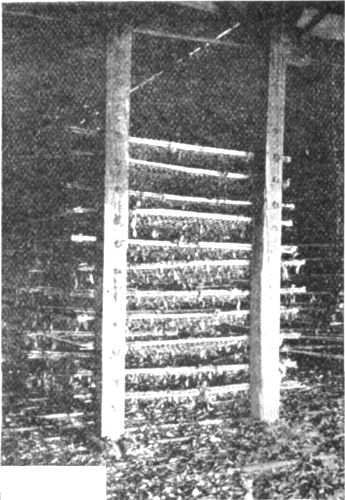 HOW THE LEAVES ARE WITHERED.
HOW THE LEAVES ARE WITHERED.The next process through which the unfortunate tea leaf has to go, and which is considered by many planters as the most critical in the whole manufacture, is fermentation, as good leaf can easily be spoiled.
After coming out of the rollers, the leaf is taken into a separate room, generally built off the factory, away from the heat, as it is essential to keep the fermenting leaf cool and moist. It is then spread in little heaps on the floor or trays, having to be constantly turned over to keep cool. It soon begins to oxidise, and change from a bright green to a bright coppery colour, the young leaves being as bright as a new penny.
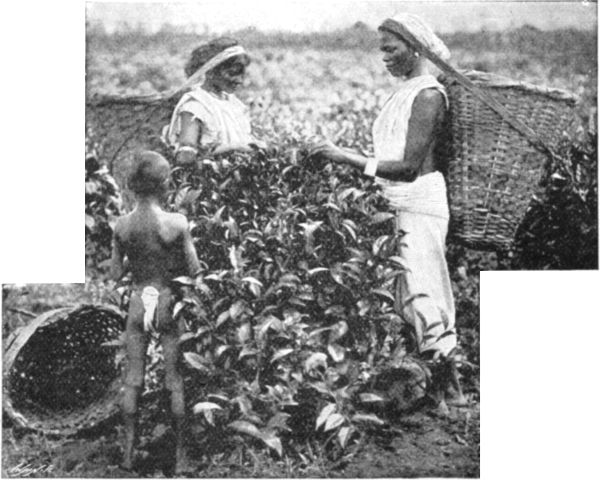 PLUCKING THE TEA LEAVES.
PLUCKING THE TEA LEAVES.Some planters sift these young leaves from the coarse directly after the rolling, so as to try and get a more even colour, but it is a most difficult task, as the leaves are sticky and cling together. It is usual, as soon as the desired copper colour is obtained, to give the leaves another roll just before firing.
The object to be obtained in the next process—firing—is to remove all the moisture, without losing any of the constituents which add to the commercial value of the tea. Most factories are equipped with modern firing machines, and these are of many kinds. Heated air drawn over the leaf by revolving fans is the method of most machines. The temperature used is different on nearly every estate, according to the ideas of the planters. Some men give two firings. First the leaf is fired 70% dry at a certain temperature, and then taken to another machine, where the final firing takes place.
Then comes the sorting of the dry leaf into the various grades, the names of which are pretty well known to most people, i.e. Pekoe, P. Souchong, etc. This is done, as the photograph shows, by revolving flat sieves of varying sizes, after which it is refired, weighed, and packed ready for[Pg 608] despatch to market. It will be seen that the manufacture of tea is somewhat of an art, requiring all the skill of the planter. He sometimes has to turn out two or three times a night to see that nothing is overlooked. Climatic influence plays an important part both in the quality of leaf and during manufacture. Sometimes it is impossible to get your leaf to wither and ferment, flirt with it as you will; at others the change is so rapid that it is almost impossible to cope with it. Nothing is so disappointing as the manufacture of tea, for, having done all in your power, and watched each process carefully with untiring energy, under most unfavourable circumstances, you possibly receive a broker's report on the samples, with a polite letter from your agent telling you that the tea is unsatisfactory.
Our photographs are by Bourne and Shepherd, Calcutta.
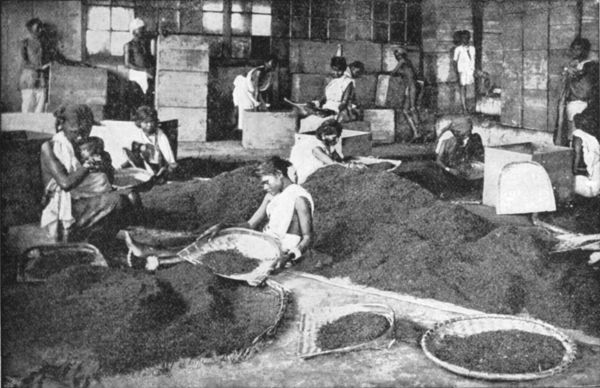 SORTING THE LEAVES ACCORDING TO QUALITY.
SORTING THE LEAVES ACCORDING TO QUALITY.
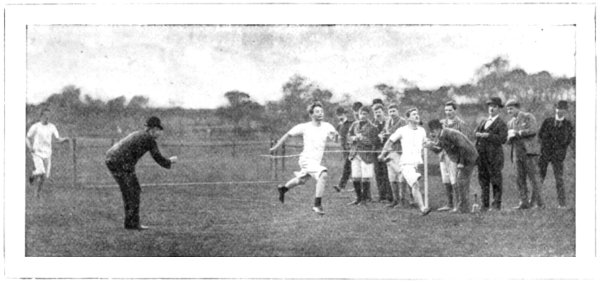 A VERY CLOSE FINISH.
A VERY CLOSE FINISH.WITH APOLOGIES TO THE STATISTICAL SOCIETY AND MR. HOLT SCHOOLING.
By J. G. Grant.
Illustrated by the Author's diagrams.
Of late years our magazines have been overrun by the statistical fiend, and I propose to show how the thing is done.
I shall have the honour of laying before the reader a few startling statistics of facts and phenomena discovered by myself. These discoveries might have been made by anybody who would take the trouble, and the great point about them is what Mr. Jerome terms their hopeless veracity.
But let me plunge at once in medias res; and let me mention, before we proceed further, that my statistics will be illustrated by scientific diagrams, invented by myself without the assistance of any man, woman, or child whatsoever.
Any ordinary intelligent person must have observed that human beings differ in many things, and especially in personal appearance. This is an absolute fact. And here is a terrible field for the fiend aforementioned. I begin at once, and I herewith give a diagram, which I am able to produce after years of observation. The number of dots inside the circle in Fig. 1 represents, with great accuracy, the number of men—and women, for that matter—in every hundred, who are born bald. In order to spare the reader the trouble of counting the dots, I have counted them myself, and find there are one hundred. The reader can count them in Fig. 2 for himself, without any undue strain. This figure represents the percentage of men with green whiskers.
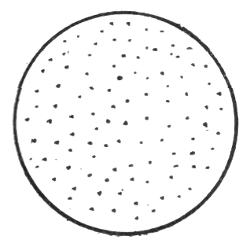 FIG. 1. THESE 100 DOTS SHOW HOW MANY PEOPLE PER CENT.
ARE BORN BALD.
FIG. 1. THESE 100 DOTS SHOW HOW MANY PEOPLE PER CENT.
ARE BORN BALD.
 FIG. 2. PERCENTAGE OF MEN WITH GREEN WHISKERS.
FIG. 2. PERCENTAGE OF MEN WITH GREEN WHISKERS.
Talking of hair reminds me, and so in Fig. 3 I give another diagram, which shows at a glance the number per cent, of red-headed men who are thoroughly convinced that their hair—if any—is any colour under the sun except red. I have counted the crosses in the hundred squares, and find there are ninety-eight; the ninety-ninth man is colour-blind as a rule, and the hundredth hasn't got any hair; so neither cares a rap.
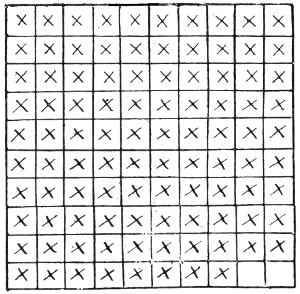 FIG. 3 SHOWS THE NUMBER PER CENT. OF RED-HEADED MEN WHO
DENY THE RIGHT COLOUR OF THEIR HAIR.
FIG. 3 SHOWS THE NUMBER PER CENT. OF RED-HEADED MEN WHO
DENY THE RIGHT COLOUR OF THEIR HAIR.
From hair we pass, by an easy transition, to the average monthly magazine. Let us put down its average composition diagramatically. Let us represent by the first cube the size of the paper, the whole paper, and nothing but the paper. The other three cubes explain themselves and that, by the way, is what scientific diagrams are sometimes not very guilty of.
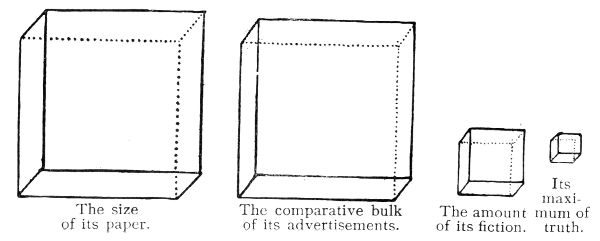 FIG 4. THE AVERAGE MONTHLY MAGAZINE.
FIG 4. THE AVERAGE MONTHLY MAGAZINE.
Do any of you ever go to smoking concerts? Yes? Very well, you will appreciate the next scientific diagram for its mathematical exactness. I have a friend called Smith—he spells it Smythe, but that's nothing—and the diagram refers to certain events which (as the descriptive reporter would say) sometimes transpire.
Fig. 5 A shows the number[Pg 610] of keyholes observed in the door by Smith (or Smythe) as he is about to operate with his latch-key on returning home from business at 5 p.m. Fig. 5 B shows the number he sometimes sees when he returns from his club about 11.30 p.m. As a rule he attempts, on this occasion, with great perseverance to put the right key in the wrong hole, or vice versá. Fig. 5 C shows the number he doesn't see when he returns home even later than 11.30 p.m.
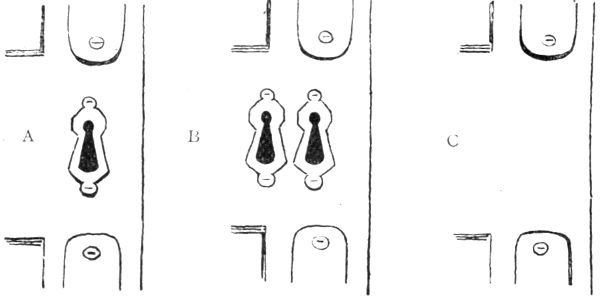 THE TRAGEDY OF A KEYHOLE.
THE TRAGEDY OF A KEYHOLE.Let us change the subject, my friends, as it must be very painful to you to read such things about my poor friend Smith (or Smythe). I can easily change it—it is all the same to me. I will now give you an "easy one"—so easy that it can be comprehended by a person of the meanest intelligence. Fig. 6 merely shows in a simple and unobtrusive manner how many beans make five. There is no answer to this.
We may now attempt something more difficult and elaborate. In point of fact, let us proceed to "trace a curve," as we say in the differential and integral trigonometry. The curve explains itself, and to those who are not acquainted with the Higher Mathematics the diagram may seem a bit mixed; but the same may be said of most things in this wicked world.
It is evident that diagrams such as Fig. 7 might be manufactured ad infinitum, also ad nauseam.
At this stage of the proceedings I may say that I challenge and defy the whole world to controvert, deny, or disprove any one of my statistics.
But, really, if anyone has any faculty for statistic-mongering, and wishes to exercise that faculty, let me cordially recommend him to try his hand on statistics taken from astronomy, and, if he emerges scatheless from the fray, he may thank his stars (no pun intended).
He might, for example, calculate how long a London Chatham and Dover train would take to travel from Capella to the Great Bear, supposing it ran(!) day and night. Or again, he might reckon how long it would take an average bargee to circumnavigate the canals of Mars.
 FIG. 6 ACCURATELY TELLS HOW MANY BEANS MAKE FIVE.
FIG. 6 ACCURATELY TELLS HOW MANY BEANS MAKE FIVE.
Or yet again he might work out how many threepenny pieces it would require piled one above the other to reach from Whitechapel to the Moon.
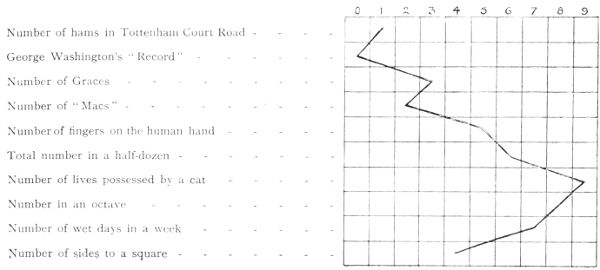 FIG. 7.
FIG. 7.
Scientific diagrams of such things as these would be extremely interesting, and nearly as useful as those of the present article.
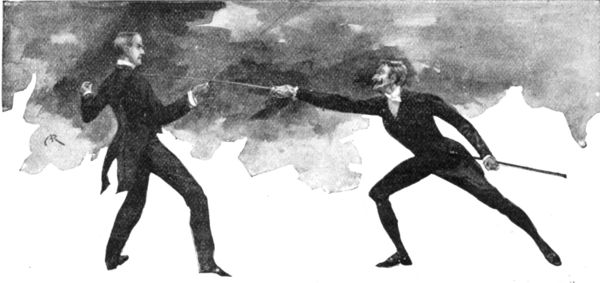 "IT WAS ALL I COULD DO TO GUARD MYSELF FROM THE FURIOUS
LUNGES OF THE COUNT."
"IT WAS ALL I COULD DO TO GUARD MYSELF FROM THE FURIOUS
LUNGES OF THE COUNT."
THE STORY OF A BLOOMSBURY SENSATION.
By Arthur Preston.
Illustrated by A. Rackham.
Never did my prospects seem worse or more gloomy than in the winter of 188-.
I had returned to England from a five years' sojourn in the more unsettled parts of British Columbia, after an unsuccessful pursuit of fortune in that land of gold, mountains, and timber. It was at Felixstowe—that charming watering-place, where my people then had a house—that I first came into relation with those who were afterwards to exercise such influences for good or evil on my life.
I was walking round the place renewing my acquaintance with the English life, when I was confronted with the most beautiful face I have ever seen. It belonged to a young girl of eighteen or nineteen, quietly dressed in a green walking-skirt and tan jacket, while her blue eyes looked out from under a mass of golden hair, in turn surmounted by a sailor hat.
As her eyes for a moment met mine, I was conscious of that magnetic thrill which I was told afterwards my mistress exercised on all those with whom she came in contact. She was accompanied by a lady somewhat older than herself, and whom, from her likeness, I mentally set down as being, if not her sister, at any rate her near relative. As soon as I conveniently could, I turned round and followed them, and noticed them enter a house which—as a perusal of the Felixstowe visitors' list, hastily bought and perused, informed me—was at present occupied by Mr. and Mrs. Delaine.
I was both astonished and delighted at this, as this Mrs. Delaine was a person upon whom my mother had by mutual friends been asked to call.
That very afternoon, I determined, should obtain for me at least a bowing acquaintance with her. Alas for my dreams! Our ring at the bell produced a man-servant, who stated that Mrs. Delaine was away from home, and he did not know when she would return. From then on I haunted the walks about Felixstowe, meeting my divinity over and over again, but never once could I see that she betrayed the least knowledge that these frequent momentary meetings were anything but the results of accident.
At last a day came when I no longer saw her. In vain I walked up and down the promenade and through the town. Felixstowe was full indeed, but to me it was empty, for the golden hair, the blue eyes, the tan jacket, and the green skirt no[Pg 612] longer greeted my longing and expectant gaze.
It was in Piccadilly—that world in miniature, and the scene of so many strange occurrences—that the first act of the drama took place, of which the foregoing was merely the prelude.
I was strolling down the thoroughfare, nearly a month after the disappearance of my lady (for so I called her to myself), and thinking, as indeed I always was, of her, when my own immediate affairs and embarrassments did not fill my mind, when I met her face to face. The thing was at once so natural and at the same time so coincident with my own thoughts, that I could do little more than stare blankly after her.
It was nearly noon, and the well-dressed crowd jostled and pushed me as I stood there. Mechanically I turned to follow after her, when she was joined by the lady who had been with her at Felixstowe, and the two, hailing a hansom, were driven away rapidly, leaving me staring stupidly after the fast disappearing vehicle.
As I was retracing my steps I felt a tap on my shoulder. Turning, I perceived a tall man of about thirty-five or forty years of age, his keen grey eyes surmounted by heavy black eyebrows and lashes, while a big moustache almost hid his firm mouth, and drooped down to his heavy square chin.
"You know that lady?" he queried, more with the air of stating a fact than of asking a question.
"I know that I am not in the habit of answering lunatics, or impertinent strangers," I answered, hotly—for my temper is hasty, and the man's manner was abrupt.
"Nevertheless, you do know her," he answered, doggedly.
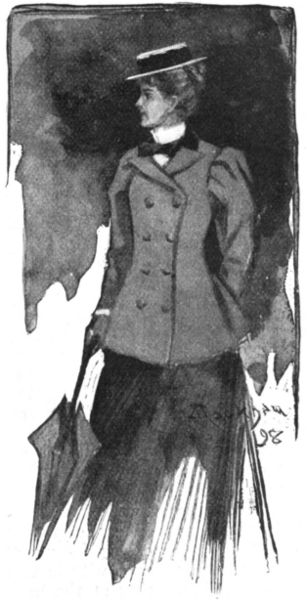 A PRINCESS IN GREEN AND TAN.
A PRINCESS IN GREEN AND TAN.
I turned, leaving the man there, and walked into Sackville Street. I had not gone twenty yards, when I heard his hurrying step behind me.
"She is in danger, Mr. Darcy," he hissed into my ear.
This time I turned round, amazed at the man's knowledge of my name.
"And she needs help," he said, looking me full in the face.
"You know my name," was all I could say, stupidly.
"It is my business to know things," he said, impatiently; "but will you help her?" he added.
"Help whom, man?" I replied, testily.
"The lady who was at Felixstowe, and ten minutes ago got into a cab," he answered.
"But there were two," I said.
"Only one needs help," he replied, grimly; "the other——" He broke off abruptly. "But come to my rooms where we can talk without interruption," he added.
I was so amazed that I followed the man unquestioningly to a quiet turning off Burlington Street.
"Now," he said, when he had waved me to a chair and seated himself—"now we can talk freely."
"You ask for my help," I said, "and on behalf of some lady who is in danger. You talk in riddles, man; I——"
"Is it possible you do not know who she is?" he interrupted.
"No," I said, "I do not, nor do I know you either. All I know of the lady I can tell you in a few words," and then and there I told him of my meeting her at Felixstowe, my call at the house, her disappearance, and my recognition of her again in Piccadilly, which he himself had witnessed. "But I have never spoken to her," I concluded.
"But of the lady with her?" he interrupted eagerly, "the lady who met her in the street, and accompanied her[Pg 613] in the hansom—was she there all the time?"
"The lady with her?" I repeated, slowly. "I hardly noticed her." And in very truth I had indeed hardly done so, having no eyes for anyone but my lady, and beyond the fact that she was pretty (as indeed she must needs be to so closely resemble my lady) I had not paid any attention to her. "There was a lady closely resembling her with her all the time," I continued, "and at one time another woman, and once a man."
"Dark, and with a scar on one cheek?" interposed my companion.
"Yes," I answered, slowly, for now he mentioned it I clearly recalled noticing a scar on the fellow's cheek.
My companion mused for a few seconds, then—
"I had better give you the whole story," he said, and commenced as follows:—
"My name is Von Bieberstein, at one time equerry to Her Serene Highness the Princess Elsa, Hereditary Princess of Schwannenwald, but I was dismissed from her service through the machinations and false representations of her enemies and mine, though God knows Her Highness has no truer servant than I.
"She is the younger of the two ladies you have seen; the elder is Her Highness's first cousin, the Grand Duchess Hedwig, also of Schwannenwald, and heir after her cousin in the direct line to the throne of Schwannenwald. She is an ambitious woman, and a fiend incarnate, and as wicked as she is beautiful. The man with the scar was her equerry, Von Zahn, and the two combined are as unscrupulous and as dangerous a couple as you could find."
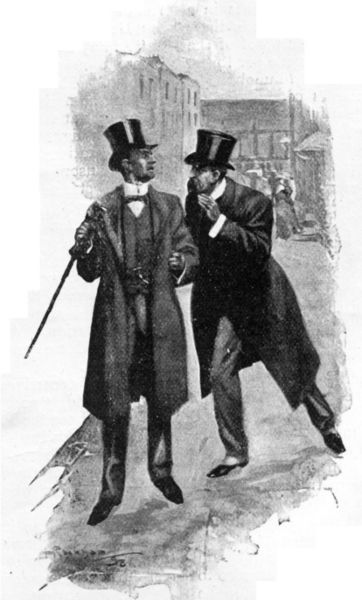 "'SHE IS IN DANGER,' HE HISSED."
"'SHE IS IN DANGER,' HE HISSED."
"But, man," I broke in, "we are in London, and in the nineteenth century. You cannot imagine Her Highness's life to be in danger."
"No, I don't," he answered, grimly, "I know it. Do you suppose crowns are less valuable now than in the seventeenth century, or that when a throne is at stake our boasted civilisation does not peel off as easily as an old glove? It was a glimmering of this plot that cost me my place, and almost my life."
As he spoke he bared his chest, and showed me the small round white scar of a bullet wound. "Fired, if not by the Grand Duchess's finger, at least by her direction," he said, with a grim smile. "But the question is, will you help me?"
"I am a total stranger to you," I commenced, "and——"
"The affair at Eagle's Nest is not unknown even in Schwannenwald," he said, with a smile.
I started. The affair to which he alluded had happened during my third year in British Columbia, when a party of three white men (of which I was one) and a lady had been surrounded in a log cabin by hostile Indians. I was lucky enough at some little risk to escort the lady to a place of safety.
Von Bieberstein rang, and ordered his man to bring up a bottle of champagne and glasses.
"I have a health to give you," he said; "you can wait, John," he added to the man. When the glasses were filled, Von Bieberstein rose to his feet.
"To the health of Her Serene Highness the Princess Elsa," said he.
"And confusion to her enemies. May she never lack a plain English gentleman to do her bidding for the sake of his lady and her own bonny face!" I added, ecstatically.
Von Bieberstein looked at me for a moment, then—
"Spoken like the man of Eagle's Nest. Can you use a sword?" he said.
"I studied under Andretti at Milan in '84," I said, "but——"
"Let us try," he said, briefly, reaching a couple of foils from a corner.
We fought for some few minutes, when with a quick movement he disarmed me with a wrench.
"You are well enough," he said. "Nay, do not look so downfallen, man." He smiled, noticing my foolish look. "It was but a trick of the wrist, and better men than you have deemed it no shame for Von Bieberstein to disarm them. Now, listen," he continued, laying aside his foil. "To-night the Duchess Hedwig holds a council of the chief of her supporters in the house she and her sister the Princess have taken in Great Coram Square, Bloomsbury. The council will be held after the Princess Elsa has retired to her own apartments in a different wing of the house. It is there I must see her, and lay such proof of the plot before her as will persuade her to fly. You, for your part, will be an unobserved observer of the Duchess's council, for the double purpose of identifying the persons present, and of guarding me against possible interruption."
"But of the danger to the Princess," I began. "Is she not——"
"The fact of her being at liberty to-day is an indication that no immediate villainy is contemplated," broke in my companion.
"But how in the world can she be harmed here in London?" I exclaimed. "She cannot be poisoned or shot, without investigation exposing the whole dastardly plot."
"A very different medium will be employed," he replied. "I have good reason for believing that dynamite——"
"Dynamite!" I exclaimed, incredulously.
"Ay, dynamite, man!" he replied, grimly. "You have already told me we are not in the seventeenth century, and in a modern crime the perpetrators will undoubtedly use modern weapons."
"But how, man?" I commenced, by no means convinced.
"There are always the Anarchists," said my companion, "and London, thanks to the British Government, is known to be a hot-bed of them. Her Highness has several times received threatening letters, and for the rest the thing is easy. Come," he said, smiling, "you are on her side now, and she sorely needs help. Meet me in Great Coram Square to-night at ten, and bring a sword. A long cloak and a hansom will hide the incongruity of the weapon in modern London. There may be use for it, and for obvious reasons they will not use firearms."
"But——" I began, and paused, for I had a natural reluctance to confess to this comparative stranger that the state of my purse precluded the purchasing of swords and the taking of hansoms.
"Ah!" he said, smiling, and as usual divining my thoughts with great perspicacity. "Is that how it is? Well, thank God, Schwannenwald can always be sure that those that rally to her banner can at any rate go properly equipped to the fight. And a brave man is none the worse when he looks on his last florin, or takes the gold which he has earned," he said, pressing a roll of notes on me.
"But I have not earned it," I objected.
"At any rate I think I can promise that before to-morrow morning you will have done so." He smiled, and with a hearty grip of the hand he waved me to the door. "To-night at ten," he said.
After a light meal I went out to make my preparations. A light rain was falling as my hansom made its way through the crowded streets to the quieter parts of Bloomsbury. About a hundred yards from my destination I dismissed my cab, and walked to the square, which, owing to the rain and the hour, was completely deserted. It was a gloomy spot, and Von Bieberstein was nowhere to be seen. As I strolled up and down I wondered which house was our destination. A light touch on the arm recalled me, and turning I saw Von Bieberstein.
"I have a carriage at the corner waiting," he said, "and an hour, if all goes well, should see the Princess on her way to safety. That is the house yonder," he said, pointing to a gloomy-looking house on the opposite side of the square, standing between two others whose boards proclaimed them to be let. The house might have been as deserted as its fellows had it not been for a faint light which gleamed through the glass at the top of the front door. The rest of the house was in darkness.
"The apartments in use are at the back of the house," said Von Bieberstein at my elbow.
"How are we to get in?" I whispered.
"I have arranged all that," he said, softly. "One of Her Highness's women has left a basement window open. We shall make our way down the area, enter the window, and ascend the back stairs till we stand inside that front door. You will then make your way up the main staircase till you come to a passage; proceeding along this, you will come to a door on the right-hand side. Enter this, and you will see what you have to do.
"If in an hour you hear no alarm, make your way out as you came; but if you are attacked, guard the door you entered by until I can come to you or send assistance. There," he said, with a sigh, for he was no great lover of long speeches, "that is all, and should anything happen to us—well, good-bye, and remember Eagle's Nest"—this with a smile. He gave me a hearty grip of the hand, and we made our way towards the house.
Every thing came about as Von Bieberstein had said. Leaving our cloaks in the area, and with naked swords in our hands, we entered the window, and in a few minutes stood inside the door, the exterior of which I had seen from the square. A confused murmur came from above us, and a dim light hung from a chain above our heads. Von Bieberstein pointed with his sword to the staircase before us, and with a nod I made my way towards it, holding my sword tightly in my hand. It was thickly carpeted, and my ascent was made without noise, and I soon found myself in the passage mentioned.
The voices grew more distinct as I proceeded, until at last, when I reached the door on the right, I could hear a word here and there. The door itself was ajar, but no glimmer of light made its way out, so with my heart in my mouth I quietly pushed it open and entered. I found myself in a long narrow room with one window heavily curtained at one end, but my attention was riveted to what I saw immediately before me. Two heavy curtains, closely drawn together with here and there a bright chink of light penetrating where they met, divided the room I was in from a larger one.
Cautiously advancing towards these, I managed by applying my eye to one of the chinks to see into the room. Round a table, brilliantly lighted by a cluster of electric lights immediately above it, were seated half a dozen men in court dress and wearing swords; at the head of the table and on a seat slightly higher than the others was seated a lady, whom I at once recognised as the companion of my lady of Felixstowe. She was in evening dress, and a coronet of diamonds surrounded her head. She wore several sparkling orders, prominent among which I recognised the White Eagle of the reigning house of Schwannenwald. I looked through my chink long and curiously at her.
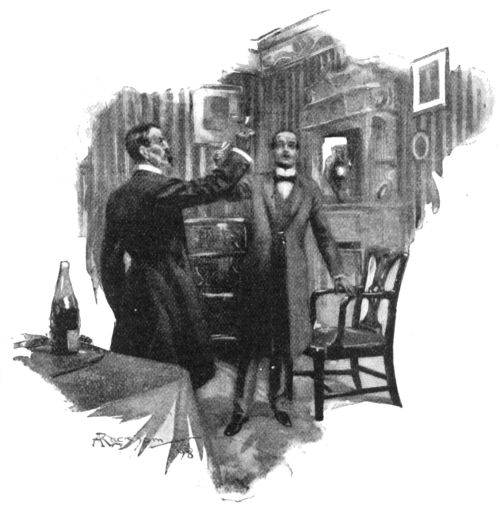 "'TO THE HEALTH OF HER SERENE HIGHNESS,' SAID HE."
"'TO THE HEALTH OF HER SERENE HIGHNESS,' SAID HE."
Standing beside her chair was the equerry Von Zahn, who at that moment was speaking.
"I think we are all agreed, gentlemen," he was saying, "that in the troublous times that must succeed the lamented demise of His present Majesty, the throne of Schwannenwald will have need of a clear head and a firm ruler. Beauty is of course to be respected, but the two do not always go[Pg 616] together. When they are united"—and here he bowed with respect to the Duchess—"I for my part see no reason to look further."
His words seemed to have the assent of the men at the table, with the exception of one man who seemed about to speak. But the equerry, evidently divining this, went on quickly.
"Her Serene Highness," he said, "who has already deigned to give us many tokens that our humble counsels are not altogether unappreciated by her, has chosen to-night for a final attestation of this, and proposes to confer on the gentlemen here present the Royal Order of the Garter of Schwannenwald. Allow me, gentlemen, to be the first to congratulate you on this honour."
With this, he stepped to a side table and returned with a jeweller's box and a small velvet cushion, the former of which he handed to the Duchess. The Duchess placed her hand in the box and laid one of the glittering orders on the cushion, which the equerry immediately bore round to the first recipient, who, rising, fell on his knee at the Duchess's chair, murmuring his thanks and devotion as he kissed her hand. The same thing happened until it came to the turn of the man who had been inclined to speak at the first. Then I noticed a shade cross the Duchess's face, and—
"How is this, sir?" she cried angrily to the equerry. "Is Count Heindrich to receive no order, or is this some ill-timed pleasantry on your part?" and she held up the empty box.
"Your Highness misjudges me," answered the equerry; "the mistake is evidently a stupid one of the jeweller's, and if I have your Highness's permission, and that of Count Heindrich,"—and he glanced towards that gentleman, who was now scowling freely—"I will to-morrow——"
"Nay, if that be all," broke in the Duchess, gaily, "I think I can rectify it, at any rate for the time," and she rose from her seat and disappeared behind a large screen. A moment later she reappeared, holding something in her hand.
"After all, it is the giver, not the gift," she said, advancing with a blush to Count Heindrich, "and 'twas how the order originated," and she handed the pretty bauble to him. It was a dainty notion, cleverly conceived and cleverly carried out, and I could see from the flush that mantled the heavy face of the man that he was her slave from that time.
This incident had hardly terminated, when there was a knock on a door of the room situated beyond the council table and immediately opposite where I stood, and the equerry hastily went out, closing the door behind him. He re-entered almost immediately, bearing a small scrap of paper, twisted in the form of a note, which he handed to the Duchess, who opened and read it.
"Gentlemen," she said, "I am compelled to break up the meeting, and to ask you to retire at once, and by the usual exit."
As soon as their footsteps had died away, the Duchess rose to her feet, and went slowly towards the wall. As she did so, the electric light in her room was suddenly extinguished, while mine became a blaze of light, and at the same time the heavy curtains dividing the rooms rolled wide apart.
The Duchess regarded me for a minute with a quiet smile, then—
"Good evening, Mr. Darcy," she said; "our poor houses seem to have an attraction for you; but may I venture to point out that private houses in Bloomsbury are not such public property as the walks at Felixstowe. Or perhaps," she went on, before I could open my mouth, "another trusty sword has come to range itself under my banner," and she pointed at my weapon.
I shook my head impatiently. "Your Highness knows well enough why I am here," I said, sternly.
"But that is just what Her Highness does not know," she said, petulantly. "Can it be possible you are on the other side—on Baby-face's side?"
"I am on the side where an English gentleman ought to be," I answered, "on the side of justice against injustice, of trust against black deceit, and of innocence against infamy."
"For one who does not know her, you sum up my pretty cousin's virtues very well indeed," she cried. "That is just what she is: trustful and innocent. Ten thousand curses on her doll's face! Fancy that baby on the throne of Schwannenwald in such times as are coming. But she shall never have it."
At that instant the clash of steel upon steel rang through the house. The Duchess sprang away from me as though I had pricked her with my sword.
"Heindrich! Von Zahn!" she called, shrilly, but only the Count rushed into the[Pg 617] room. "That man must not escape," she cried, as she ran quickly past him, and out of the door beyond.
But I had no intention of attempting to escape. Now, if at all, was the time arrived when I was to earn that roll of notes which Von Bieberstein had forced on me that morning. I had taken up my position at the door by which I had entered, and waited sword in hand. Nor had I long to wait. With an oath the Count sprang towards me, and as our swords touched I knew I had to deal with an ugly customer.
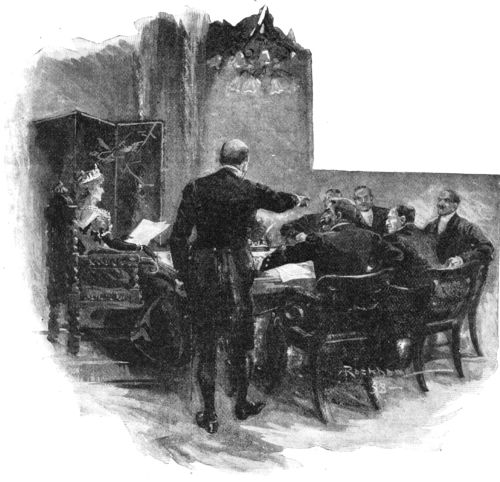 THE DUCHESS HELD A SECRET MEETING TO SECURE THE THRONE
FOR HERSELF.
THE DUCHESS HELD A SECRET MEETING TO SECURE THE THRONE
FOR HERSELF.
For some few minutes we fought in silence, and indeed it was all I could do to guard myself from the furious lunges of the Count, and before we had been five minutes at the game I knew the man was my master in fence, and that if I could withstand him for as long again it would be as much as I could do. At the same instant that I recognised this fact, I heard Von Bieberstein's voice below.
"Darcy! Darcy!" it cried, "come on, man."
But whether he called for aid or to warn me I had no means of telling, nor did I dare take my eyes off the Count for a second.
"I am here!" I shouted, as loud as I could, but indeed it was a poor shout at best, as I was well-nigh winded.
At that moment, and by the same trick of fence that Von Bieberstein had used that morning, the Count disarmed me, and my weapon flew jangling against the wall of the room. I heard a hurrying step, a revolver was fired, so close to my ear that it well-nigh deafened me, and the Count, his arm drawn back for the lunge that was to finish me, fell headlong towards me.
"Run, man, for your life," I heard Von Bieberstein's voice say, "we are safer on a volcano than here," and he started off down the passage. I raced after him: down the staircase I tore, and through the open door. I heard a low roar behind me, a sheet of red flame appeared before my eyes, and I remembered no more.
It seems that, after I had left him in the house in Great Coram Square, he had made his way to the Princess Elsa's apartments, and after some difficulty had persuaded her to listen to him. She was on the point of accompanying him from the house, when Von Zahn, who may or may not have suspected something, had come upon and immediately attacked him. He was,[Pg 618] however, no match for his antagonist, and Von Bieberstein had, after two minutes, passed his sword through his body. It was the clash of their swords that had alarmed the Duchess when she was with me.
Von Bieberstein, after hastily conducting the Princess to the awaiting carriage, had rushed back to the house for me, arriving in the nick of time. As he had smelt burning on his second entry into the house, and guessed that the fuse connected with the dynamite had been lighted, his bravery in coming to my assistance can better be imagined than described. It was a small portion of falling masonry from the front of the house that had knocked me senseless, and indeed nearly killed me.
The Princess returned safely to Schwannenwald, but when I had nearly recovered my health and strength, Von Bieberstein announced she was on her way back to London again, her father having died, and had taken a suite of apartments at L——'s Hotel, and there we also took up our abode.
But it was not until the day following her arrival that Von Bieberstein announced to me that Her Highness awaited my attendance on her.
She was standing by the open window when I went in (for it was late in June), and she turned to me with a smile. "Your face is not altogether unfamiliar to me, Mr. Darcy," she said, "but I never thought I should be under such obligations to the owner."
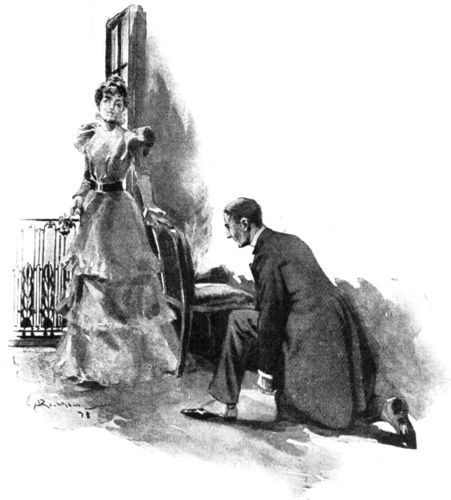 "'I AM YOUR HIGHNESS'S MOST OBEDIENT SERVANT,' I SAID."
"'I AM YOUR HIGHNESS'S MOST OBEDIENT SERVANT,' I SAID."
"I am always your Highness's most obedient servant," I said, sinking on my knee.
"Nay," she returned, raising me, "if that were so, we should have to put you in livery, and the most I could do would be to let you choose your own."
"I should choose green and tan," I said, enthusiastically.
"That would be rather bizarre for a man, would it not?" she smiled.
"I venture to think otherwise, your Highness," I rejoined.
"Nevertheless, I should not like it," she said.
"Gold is a pretty colour," said I, looking at her hair, "or blue," I added, looking at her eyes.
A blush, a frown, a smile, chased one another across her face, but the smile remained.
"I am afraid you are as foolish as you are brave, Mr. Darcy," she said; "but I shall need an extra equerry, and if you would care to enter my service permanently, the place is at your disposal."
I fell again on my knee, mumbling my acknowledgments, for indeed I had not dared to look for so much.
There was a knock at the door, and Von Bieberstein entered.
"I have offered Mr. Darcy the position of equerry in my service," began the Princess, "and he has consented to fill it. Will you see that the necessary uniforms——"
"Of green and tan," I said, softly.
"What?" ejaculated Von Bieberstein.
"I ought perhaps to have said blue and gold," I answered, as I bowed my way from the room.
Von Bieberstein looked after me anxiously, but there was a smile on the Princess's face.
Such was the way in which I became equerry to a Princess in Green and Tan.
ONE ASPECT OF MY BICYCLE RIDE ROUND THE WORLD.
By Edward Lunn.
Illustrated with Photos by F. H. Lowe.
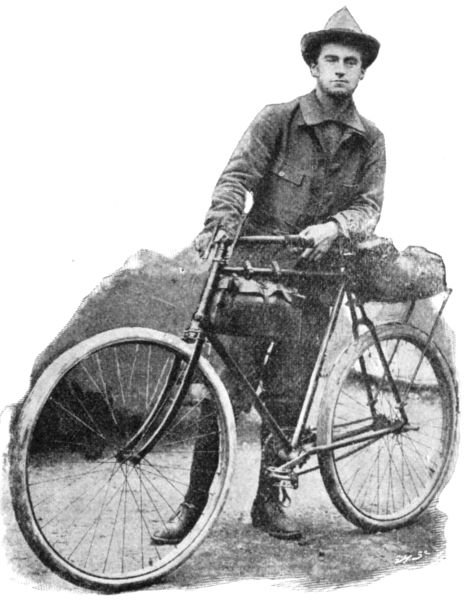 MR. EDWARD LUNN AND THE BICYCLE HE RODE ROUND THE WORLD.
MR. EDWARD LUNN AND THE BICYCLE HE RODE ROUND THE WORLD.
The question most frequently put to me since I returned with my two companions, Mr. Lowe and Mr. Fraser, from my cycling tour round the world has been, "What were the roads like?" and to answer this question fully would require a volume rather than a magazine article.
There were the paved roads of Belgium, the excellent military roads of Germany, the steep slopes of Austro-Hungary and Roumania, the cart-tracks of Southern Russia, the Government highway over the Caucasus, the post-road to Erivan, the camel-tracks of Persia, the Grand Trunk road of India, the bouldered highways of China, and the Tokaido of Japan, not to mention the alkali deserts of Nevada and the old Colonial roads of the Eastern States—the only thoroughfares deserving the name in the Land of the Stars and Stripes, excepting always the excellent pavements in the great American cities.
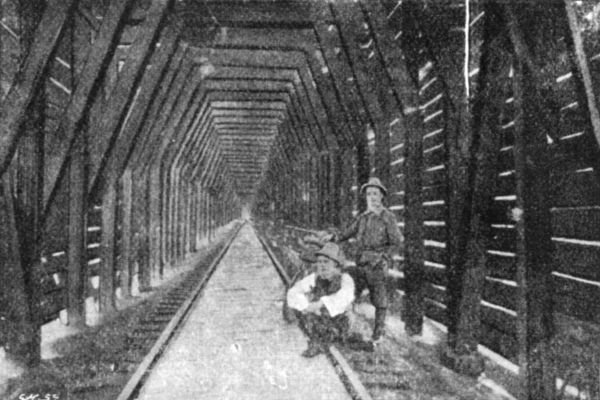 WE HAD TO RIDE ON SLEEPERS THROUGH FORTY-THREE MILES OF
SNOW SHEDS—THIS SORT OF THING.
WE HAD TO RIDE ON SLEEPERS THROUGH FORTY-THREE MILES OF
SNOW SHEDS—THIS SORT OF THING.
But of all the roads we traversed, the most interesting to cyclists will probably be the 2,900 miles and upwards on railway tracks that we covered in our circuit of the globe. We were first driven to these tracks in Russia, and this jolting and jarring method of progression may safely be recommended as an even better specific for liver troubles than a ride on the top of a London 'bus. We were crossing the Russian steppes. For several days we had been battling against the icy wind that blows from the Caucasus, dressed always in the light summer clothes which we wore in the smiling valleys of Roumania. The road was so sandy as to render riding impossible. We forced our way along, pushing our machines, through a blinding sandstorm, till at last we had to take to the railway track.
These tracks in Russia are better made than any we have come across elsewhere, and they are laid out with much elaboration. First, an array of stones, neatly planned in patterns like an ornamental flower bed; then the footway; then another pattern of stones, and then the line. Whenever possible, we rode on the path between the two rows of stones; but we were frequently obliged to try the sleepers, the interstices between which were to some extent filled up with "ballast," which assisted our progress materially. The[Pg 620] trains near the Caucasus are few and far between, and did not interfere with us to any extent. On our arrival at a station, everybody seemed to think it quite natural that we should come along on the line, and we took our meals in the railway buffets, and slept in the waiting-rooms. Our railway-track riding in Russia amounted to about 150 miles.
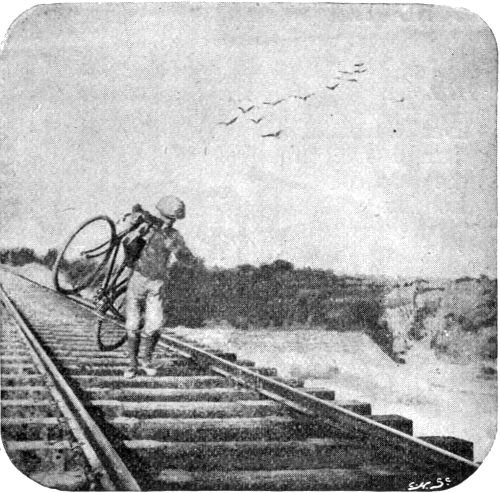 HOW WE CARRIED OUR BICYCLES OVER THE RAILWAY BRIDGES.
HOW WE CARRIED OUR BICYCLES OVER THE RAILWAY BRIDGES.
Arriving in India, we were accompanied out of Karachi by a dozen Englishmen who were practically novices at cycling. We started on a good road, which ended a little way out of the town in deep sand, as is the way with roads in this part of India. We then suggested to our companions that we should ride on the track—a proceeding which they did not understand at all. However, they took to the idea very kindly after a time, and went with us thirty or forty miles on our way, returning by train.
We rode in this way for 800 miles, till we got within four miles of Lahore, where we struck the Grand Trunk road. At one of the little wayside stations we knocked up the native station-master and asked for food. He told us we could get nothing but rice and chupatties—a bill of fare which did not "smile upon us," as the French say.
"Are there no English people here?" we asked.
"Oh, no; no English people here—this jungle."
"But we saw some English ladies in white dresses," we persisted.
"Oh," said the official, scornfully, "those only missionary."
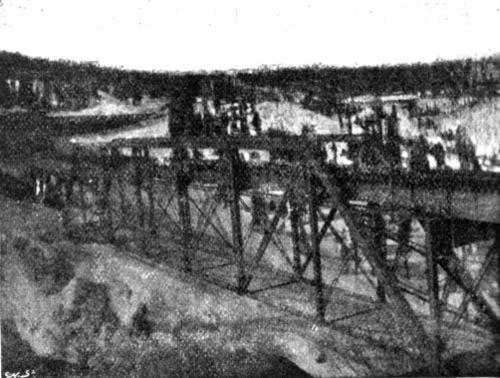 THE BRIDGE ON WHICH I RACED A TRAIN.
THE BRIDGE ON WHICH I RACED A TRAIN.
We had to try the railway track again in Burmah, between Rangoon and Mandalay. There was a road here once, but it has fallen into decay, and in many places is returning to the primæval jungle. In the pelting rain of a Burmese monsoon the so-called road soon became a mere quagmire. Railway-track riding in Burmah is much the same as it is in India, only that, as the climate is moister and more malarial, the adventure involves greater danger to health. The line is banked up on either side to a considerable height—a detail of which I was to have a practical and painful impression. Riding along the footpath one day, my machine stuck in the mud, and unfortunately overbalanced on the wrong side, towards the cutting, so that I could not put my foot to the ground on the other side to dismount. Down I went some ten feet—fortunately with no serious consequences—while, from the bank, my two companions greeted my achievement with loud applause.
My fall into the ditch was not the pleasanter for the probability of disturbing centipedes a foot long, cobras, and scorpions.
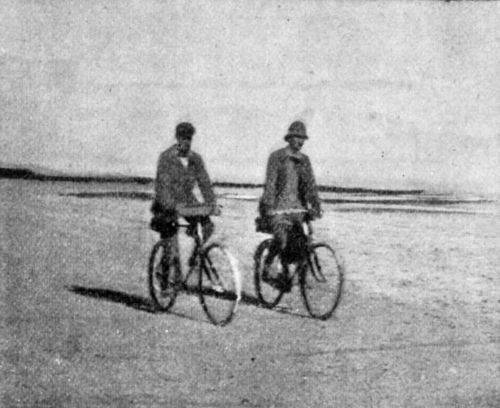 RIDING ACROSS THE SALT DESERT OF PERSIA.
RIDING ACROSS THE SALT DESERT OF PERSIA.
What food we got was more highly flavoured than the chutney and curries of India, but we appreciated the lavish supply of bananas and pineapples. One day a native station-master asked us about Lenz, the little American cyclist who went this way and was afterwards murdered in Armenia. We described his sad end, and the jovial Burman was quite overcome. "Very kind smiling face," he said, with tears in his eyes.
When we crossed the frontier into China we left railways behind, though the newspapers have informed us since we came back that a concession has been granted for a railway in Yunnan. I can only say that if that railway is ever made, it will give points to any switchback that was ever invented, so mountainous is the entire country.
When we reached America we little imagined what was before us. We had fondly believed that the most progressive country in the world would at least provide ridable roads for cyclists. But the fact is that while in old countries the road comes before the rail, in newly developed countries the rail comes before the road—and sometimes the road never comes at all. Cyclists, however, are doing a great deal to help themselves in this matter, through the medium of the League of American Wheelmen, one of the most powerful organisations in the United States.
At the Olympic Club in San Francisco we had some hints of what was to befall us. The cycling editor of Hearst's great paper, The Examiner, interviewed us during our stay, and gave us the chart of the route followed by the great Trans-Continental Relay race, which had taken place not long before our arrival.
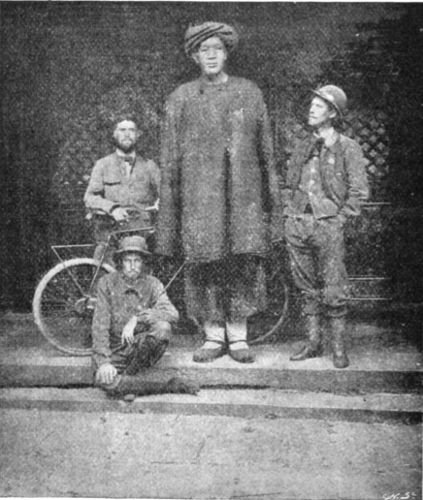 THE THREE WORLD CYCLISTS AND A CHINESE GIANT WHO DOES
NOT CYCLE.
THE THREE WORLD CYCLISTS AND A CHINESE GIANT WHO DOES
NOT CYCLE.
We struck the railway track at Newcastle in California, and on the second day the most perilous part of our experiences in this sort of riding commenced, with our entrance to the "Snow Sheds" crossing the great Sierra Nevada range. These snow-sheds, with the exception of two bridges (of which more hereafter), extend uninterruptedly for forty-three miles, with innumerable twists and turns, and we were in semi-darkness for the entire distance. We were obliged to ride between the rails. The snow had begun to melt, and pools of water extended along either side of the lines, while between the sleepers, which were free of snow, the ice lay in great uneven hummocks. We moved on[Pg 622] at the modest pace of some seven miles an hour through the darkness, while the noise of our three machines and the rattling of the baggage we carried prevented us from hearing anything of approaching trains till they were actually upon us. Then we had to leap from our cycles and crouch against the icy walls of the snow-shed while the train thundered past. We took our lives in our hands several times a day.
Our position was worse in this respect when we were going down the other side of the Nevada range. As we ascended, the trains had come up behind us "full steam ahead," so that we could more easily detect their approach; but as we went down from the summit, those following us on the down grade came with steam shut off, and were upon us before we could hear them.
On a bridge near Cisco an incident occurred which might have been serious for me. It is about two hundred yards long, and I was beginning to cross it, when my companions who were on in front beckoned me to stop. I thought that one of my friends wished to take a snap-shot, and stopped accordingly. However, after waiting about five minutes, as nothing happened, I went on. It was a skeleton bridge, with a framework in the middle. I had just reached the framework, carrying my machine, when I heard the shriek of an engine whistle in the shed ahead. I managed to keep my head and my balance, as a false step would have meant death. I reached the end of the bridge, and stepped on to the siding just as the train rushed past.
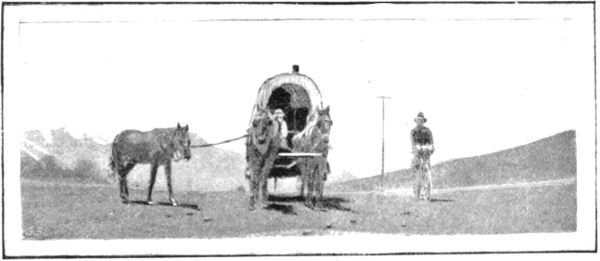 TRAVELLING WITH EMIGRANTS IN THE WESTERN STATES.
TRAVELLING WITH EMIGRANTS IN THE WESTERN STATES.
It was only then that I fully realised the narrow shave I had had.
We joyfully left the railway track shortly before entering Omaha, and from thence to Chicago we had roads that might, in comparison with our previous experiences, be called tolerable.
At Chicago we took to the railway track again for a short time in the suburb of Pullman; but from that point to New York we had the rare and delightful experience of riding on a "made road," with charming scenery about us. And very glad we were not to add to our record of riding 3,000 miles on railway sleepers.
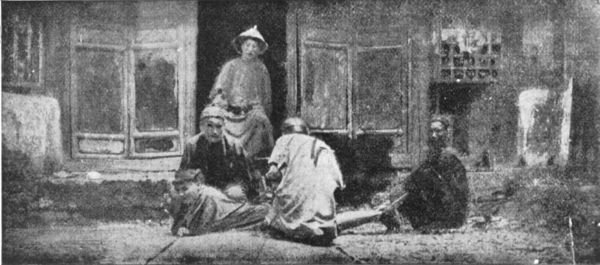 THRASHING A CHINESE THIEF WHO STOLE THE CAMERA WITH
WHICH THESE PHOTOS WERE TAKEN.
THRASHING A CHINESE THIEF WHO STOLE THE CAMERA WITH
WHICH THESE PHOTOS WERE TAKEN.
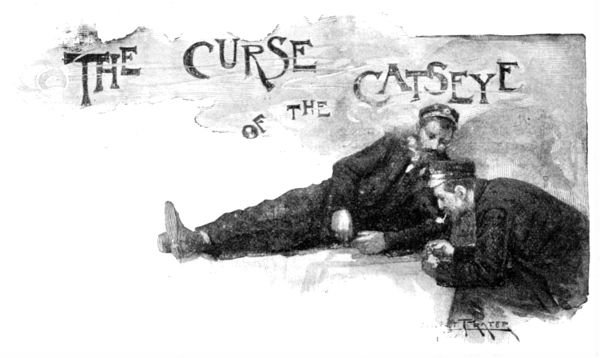
A TALE OF SINGAPORE TOLD BY THE THIRD MATE.
By Alfred Slade.
Illustrated by Ernest Prater.
It isn't my yarn at all by rights; the Second Mate commenced it, and pushed me in, in the middle. So I've annexed it; and the Second won't mind—for he's dead.
The Mother Carey was not a ship to be proud of. I never knew anyone to blow about belonging to her, not even the donkeyman.
We had worked her round to Sydney all right. Then the Health Authorities ordered us off: after which we went and lay off Thursday Island till the firm who had chartered us could wire instructions.
In desperation, our people wired us to go to Singapore in ballast and get any sort of cargo there we could.
I was sorry to leave Thursday Island; the telegraph stationmaster there had a daughter. Her first name was Mary, and, if I can manage it, one of these days her second will be the same as mine.
We got a move on us and were well in the Straits by eight bells that afternoon, and it being the First Mate's watch, the Second Mate came to my cabin to smoke a bit.
"Ever been to Singapore?" he asked.
"No," I said; "never went further than Calcutta that way. Have you?"
"Yes," he answered; "it'll be just about three years ago."
"Nice place?" I asked.
"Terrible hole," he answered. "See that stone? I got that there."
I took the ring off his finger and examined it; it was worth looking at, too. Not for the mounting, which was ordinary enough, but for the jewel it held. I had never seen a stone like it before, and never again since—but I'll tell that part by-and-by.
It was something like a catseye, this jewel; but the outside was perfectly white, the interior was peculiarly greenish, and right in the centre was a spot of dazzling red like a speck of living blood. The general effect was one of a baleful fascination, repellent and at the same time invincibly attractive; and as I looked, I shuddered, yet could not turn my eyes away.
"That's the way it serves me," said the Second, who was observing. "I hate the thing, and yet I can't throw it away. And ever since I've had it, it's brought nothing but bad luck.
"I was on the Sardanapalus when I had the stone first; we were caught in a monsoon in the Indian Ocean, and had to put in at Point de Galle an absolute wreck. My next ship was the Golden Horn; the cargo caught fire off Pernambuco, and we were taken off by one of the Brazilian Royal Mails. This'll be third trip; and I shall not live to finish it. I only hope you others'll get through all right."
"How did you come by it?" I asked, beginning, I confess, to feel a little uneasy.
"It was a rum go," answered the Second, "and I don't much like talking about it. But," he added after a moment's reflection, "I'll tell you, in case anything happens to me there." And he nodded ahead, where lay Singapore.
"The last time I was there," he went on, "I ran amuck. It was one of Libby's liners I was in, and you know what they are. Rations according to the Act, and as much rum as you can put on a mosquito's left eyelid. So when I went ashore with a couple of dollars I'd subbed from the skipper, I didn't want much to upset me. A bottle of Hamburg square-face soon did the trick; and before I knew where I was I found myself half-seas over.
"It was in one of those shanties back of the garrison barracks where I'd got the stuff; in the daytime respectable merchants' depôts, at night half grog-shop and half opium-den. The long, low, narrow room was divided into two by strips of bamboo matting; I was in the front part at a sort of rude table, alone with my square-face; the back was filled with a crowd of Parsees, squatting in a circle, and gabbling. Between us was a hole for the ladder that went to the cellar, whence came the oppressing fumes of opium; and at the back of the inner room was a door in the wooden wall, opening on a staircase that led to the apartments above.
"I remember all that distinctly; but I don't remember much else. Alone with the noise and smoke and the intoxicating smell of the East that lay all around me, and stupefied by the atmosphere no less than by drink, I must have rested long in a sort of dream.
"I seemed to wake and shiver, and, sitting up, saw the dawn rising in flames of gold. On the floor were people sleeping. I tried to stand up, but felt languid and oppressed, and I sank in my seat, and would have gone to sleep again.
"Then the door from above opened, and a girl came down. And all at once, in spite of myself, and in a manner I cannot explain, all my languor left me and a fever filled my veins. I rose, and, walking across the sleeping bodies, went near to her, threw aside her veil, bent down, and kissed her on the mouth.
"She did not move or speak; only a shudder went through her, and it was not of fear or aversion.
"I drew from her at last, and, the light creeping up through the windows, could look at her.
"She was not a Malay; she was not, I thought, a Hindoo: something of a Cingalese, a Cingalese of the hill-tops, nearly white, of features almost classic, a nose finely Hebraic, and eyes of an Aryan gipsy.
"'I have been watching you,' she said, in perfect English; 'watching and waiting. Did you not feel the incense in your nostrils—that was my love-spell. And it has worked.'
"Again I stooped and kissed her.
"'I like that,' she said, with a little laugh. 'It is a good thing of the white men's. See, I will try to act thus also,' and she in her turn had reached up and kissed me.
"I leaned forward to seize her, but she slid through my grasp and had flown up the stairs.
"'To-night,' she whispered, 'by the old pagoda, I will weave you another love-spell.'
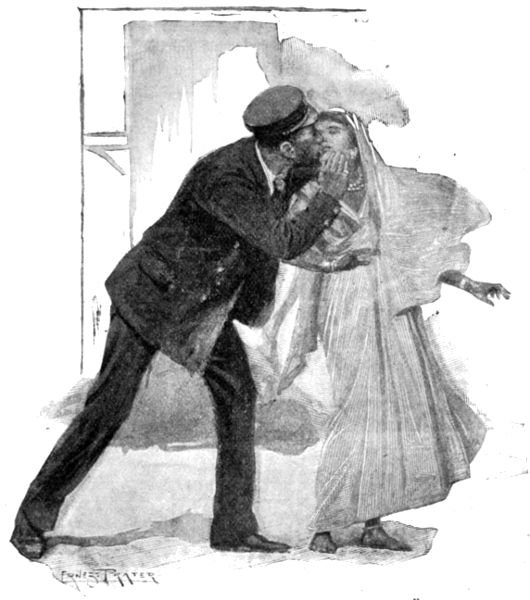 "I THREW ASIDE HER VEIL AND KISSED HER."
"I THREW ASIDE HER VEIL AND KISSED HER."
"Then she came down a step. 'Look well to yourself[Pg 625] here,' she whispered again; 'there is danger. Take this—it is an amulet—it will protect you,' and she had flown away out of sight, leaving in my hand a tiny square of ivory hollowed through the centre.
"I stood for a minute as in a trance; between my feet I saw a body, and, as I looked, one of its eyes, it seemed, was watching me.
"Had it been there all the while? I did not think so. Yet, looking again, it was not watching me at all; its eyes were firmly closed, and it was sleeping. Yet a fear crept into my heart, and instinctively I felt in my belt for my revolver. It was not there; it was not on the table; it was nowhere.
"And all my courage went from me, and I staggered across the sleeping men and burst through the fragile door and fell out into the sun. And without stopping I ran as hard as I could to the ship, sweating with a terror I dare not think about.
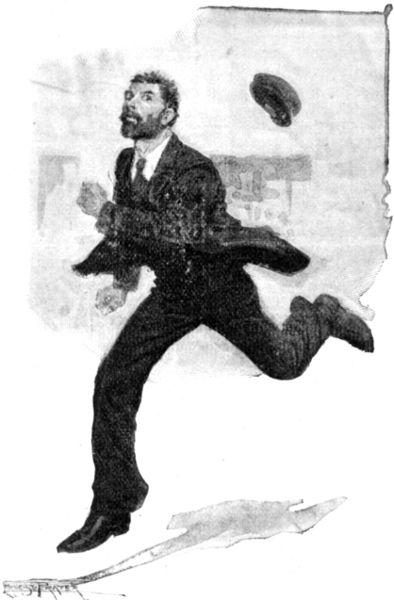 "I BURST THROUGH THE DOOR AND RAN AS HARD AS I COULD."
"I BURST THROUGH THE DOOR AND RAN AS HARD AS I COULD."
"The boatswain was washing down with the steam hose; I stripped and stood in front of it and took a bath that way. It steadied my nerves, and the bright sea and the bright sunshine did the rest.
"I was at the pagoda that night, sober, without even a cigar, but with another pistol in my belt. It was a weird place.
"Not a soul was in sight. The pagoda was dark and empty. The only sound I could hear was the ripple of the waves on the distant shore.
"All sorts of fancies crept into my brain; I tried in vain to put them away. At last I tried to go. I could not; I was as if rooted to the spot.
"I looked around and fancied I was going mad, and I laughed. And the echoes came back from all around, so that the air seemed full of mocking devils, and I turned round and round to see whence came the sound.
"There was a figure bowing before me, and a voice said: 'Salaam, Sahib,' and in front, by the light of the moon, I saw a man.
"'I have a token for my lord,' he said, 'from one he loves, who begs him to accept it and so depart,' and he handed me the stone you have seen.
"'Stop,' I cried, taking it. 'Are you her servant?'
"'The Flower of the Cinnamon was my daughter,' he answered, 'but now—no longer.'
"'What do you mean?' I cried again.
"'The Flower of the Cinnamon is not,' he said; 'and in your hand you hold the token.'
"The moonlight caught the glitter of his evil eye, and I saw then it was the man who had lain between my feet. I sprang forward to seize him, and he was gone; gone like the wind, with not a trace behind.
"In my hand I still clenched the pebble; I took it in my fingers to put it in my pocket. There was the other token, my amulet of ivory. I took it out to look at it, and its veins were red—red with the streaks of blood.
"So I went back to the ship, walking warily and looking behind my shoulder; but I saw nothing and felt nothing—nothing but the stone the man had given me, that lay like a weight on my heart. It was there next morning, but my ivory amulet I could not find; it was gone, and with it, I knew, my salvation."
"That is all?" I asked the Second, as he stopped to wipe the sweat from his forehead.
"All—at present," he answered, "for we sailed that same morning. And I have never seen her since. And I never shall see her," he added, in a tone that made me feel cold to hear.
"But you kept the stone?" I asked again.
"I could not get rid of it," he replied. "Once—you may believe me or not, as you like—once, I took it from my waistcoat pocket and threw it over the bulwarks. It did not touch the sea; next morning it was there again in my pocket. So I made the best of what I knew was a bad job; I got it mounted in London in a ring, and I wear it so in defiance."
There was more of fear than defiance in his eyes just then; he swung on his heel and turned away; nor did any further allusions to the subject pass between us.
We reached Singapore shortly afterwards; and I noticed the Second Mate getting more and more nervous. He tried to hide it and to conquer it, he worked harder than any man on the boat.
At last we had got our cargo in and had finished coaling; the next morning we should (machinery permitting) clear out for home. The Second seemed easier that evening, but he had scarcely been in my cabin half an hour when a convulsive spasm seemed to shoot through him. He stood up, as if in agony, and cried out in a thick guttural voice: "I've got to go," and made towards the alley-way.
I tried to stop him; he dragged me along as easily as if I had been a child. Then, nearing the gangway, he shook me off and cried: "You had better keep out of it; I shall be enough," and passed over the gangway to the quay.
I went after him, just speaking to the watchman; yet even this delay put me far behind, and I had to run to overtake him, so quickly did he walk.
At last we reached the house, and the room he had described: he ordered liquor, which I took care not to drink; and in desperate defiance let his hand lie on the table, stretching out the finger that held the ring.
Strive as I might to keep my head clear, I felt the fumes of the place suffocating me; yet, stupefied as I was, I had a consciousness that myriad eyes were around and watching us.
Below, through the hole where the ladder went, I saw the opium smokers; at the back where the staircase mounted, I saw the door open.
A woman entered, and at once the place seemed empty, save for her and us.
The Second was looking too, and started suddenly. He got up and walked towards her and threw her heavy veil aside. Then, in a voice so calm that it astonished me, he said—
"You are not Flower of the Cinnamon?"
"No," she answered, "the Flower is not. But when she was, she was my sister."
And she pressed forward towards me. "I am called," she said, to me, not to him, "I am called the Sheen of Morning." And she made a low obeisance towards me.
I did not speak, but looked towards her, looked passed her and saw into the cellar. I saw a man, dark-skinned, yet no Hindoo, kindle a fire on the ground; and as the flames leaped red, he sprinkled a powder on them and the fire burnt green, and the smoke came through the opening.
The woman was still bowed before me and watching me with entreating eyes; but now the lustre went out of her eyes and they had no more life in them than a sleep-walker's. Then she rose stiffly and walked backward to the staircase door and so passed through; and the door shut of itself, for I saw no one to shut it.
And the man, or devil, in the cellar put more powder on his fire, and the flames burnt red, red as a bullock's blood. And the Second turned slowly round and walked from the room into the street; and, looking neither to the right nor the left, took his way still further across the marsh. And I followed, shivering in my heart.
Nothing before or around us but the darkness and the heat of the night that brought up the fever-fog; and from the distance came the horrid noise of a Chinese sing-song.
And we still walked on, till, in the darkness of the night, there loomed another darkness, thicker and more compact: and I saw it was the shadow of a pagoda.
The Second led the way right to the entrance; as we reached the threshold, a light sprang up within.
The Second was mounting the steps; I seized his arm and with my whole force tried to retain him; he did not even pause, but dragged me after him as if my strength were nothing. And so we went into the temple.
The light shone from the other end:[Pg 627] we drew closer to it and stood in front. There, on a shrine, was an enormous figure of Buddha, sitting cross-legged, with six arms extended. The light shone from his eyes; and, glancing along his nostrils, on one side sparkled back. In his nose was a jewel the duplicate of that the Second wore; on the other side was a space for a second jewel, which was the Second's.
As I looked, I cried aloud and started back; my hand was still on the Second's arm, and so great was my terror that I drew him back with me a space. At that moment the pavement in front of us opened where but an instant before we had both been standing; and in the void revealed, I felt and smelt, rather than saw, the fœtid moisture of a bottomless water-pit. And the light in the idol's eyes burnt red.
A little finger touched my left hand: I turned. It was a woman, the same woman of the hut; who whispered, so that none but I could hear—
"Come, my lord, and quickly. Leave him to his fate, for he is doomed. But thou, while there is yet time, come."
"Yes," I said to her; "but not alone. He must come too."
"Does my lord command it?" she asked.
"Yes," I said again.
"Then I will try," she whispered; "yet it is Death we three look in the face."
She raised her hand and rubbed my lips with something she held, something that was cold like menthol, and bitter as gall. She did likewise to the Second, who at that seemed to awake from sleep and stare about him bewildered. And taking me by the hand, and I the Second, she led us to the door; and the door was shut and barred, and the light in the idol went out.
"There is another way," she said at last, and led us on; till behind a pillar she stopped and stooped, and, groping for some time, found at last a rude staple in the stonework.
"Pull," she said, "for you are strong." And I pulled, and the stone came round on invisible hinges. In the opening there disclosed I felt rough-hewn steps that went down, and pushing myself through I descended. Three steps I counted, and then there were no more; and I lost my hand-hold and fell. I threw out my hands wildly in search of some support; my head swung forward and struck against a projection; and, insensible, I still fell—down, down....
When I came to myself I was lying on the ground, my head in the woman's lap; and her hair had torn loose and was swathing my temples; and as she bent to kiss me, I felt that her eyes were wet.
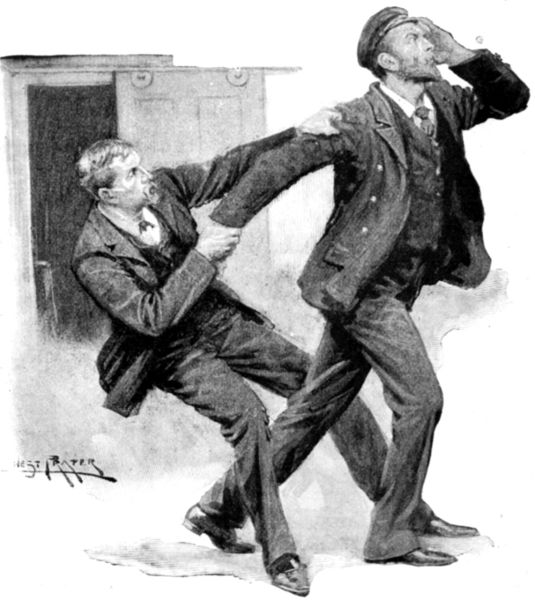 "HE DRAGGED ME ALONG AS EASILY AS A CHILD."
"HE DRAGGED ME ALONG AS EASILY AS A CHILD."
But between her and me came the memory of Mary, and the promise[Pg 628] the moon had seen at Rockhampton; and I did not kiss her back, but took her hand, and said, "My sister, my sister." And so she understood, and raised me up, and put something on my head that cured its aching; and the Second came to my side and held me, and we went on down the passage.
There was no light to guide us; but the walls shone with phosphorescent drawings, and all the vile gods of Buddha's Pantheon served us as horrid guides. We went on—the woman in tears, I in pain, and the Second in terror and dismay—till there came some rough-hewn steps, and these mounted, some stairs of wood; there the woman left us and bade us wait.
Presently she returned and led us still upward, and lifted a flap and let in a flood of light. And springing through, we were in the room of the grog-shop—all alone, save for the invisible eyes that I knew were watching us all around.
And we sat at the table; and I gave my hand to the woman, and said again, "My sister," and she fell to weeping afresh.
I looked towards the Second, and his brow was wet with sweat, and on his finger gleamed ominously the cursed stone.
I tried to get the ring off. It clung till with a wrench I had twisted it and had it off, and left his finger free; and then, before the woman could prevent me, had put it on my own. At that she shrank, shivering; but I knocked the table loudly in summons.
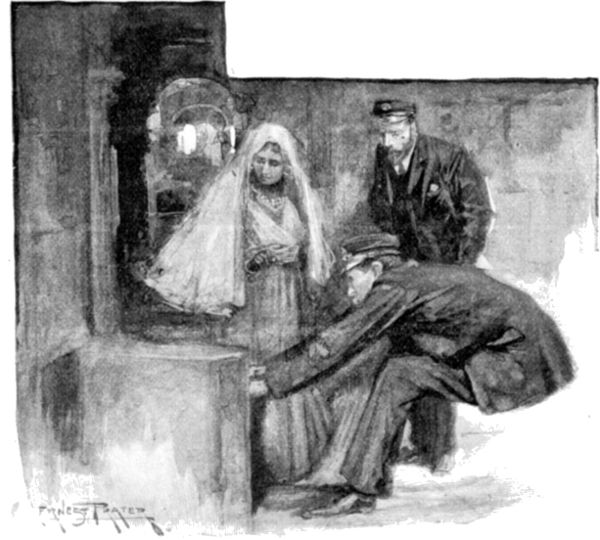 "I PULLED, AND THE STONE CAME ROUND ON INVISIBLE HINGES."
"I PULLED, AND THE STONE CAME ROUND ON INVISIBLE HINGES."
A coolie came in, and I ordered two bottles of Bass; but in knocking and ordering and talking I took care to show my ring. He saw, and smiled maliciously; and coming back with the beer looked again. The woman had disappeared, spirited away again by some invisible power.
So the Second and I drank—he hugely, I scarcely at all. And then I told him my scheme: that he must go back to the ship alone, for without the ring I felt he had nothing to fear. He was reluctant to do so, for he was a brave man; yet his terror was so great that in the end he departed.
So I was left alone with the ring; and waiting till I thought it time, began to reproach myself for running in danger when my life belonged to Mary. Then I thought again: and I knew at last that Mary herself would have me to do this. So I kept up a stout heart, and ostentatiously leaving a dollar on the table, passed out.
There was a shadow in front of me—it was the woman, who fell at my feet beseechingly.
"Fool," she said, "and foolhardy. Throw it away lest it kill you. For it is a vampire that drinks men's blood."
And she took hold of my finger and tried to wrench the ring away; but the flesh was closed up tightly round it, and it would not budge.
"It is the spell already winding round you," she said. "Yet it was not you that my father cursed. What shall I do, my love, my love?
"Better throw away your finger than your soul,"[Pg 629] she said again; "cut it off and so escape."
I searched for the knife in my belt, but my sheath was empty; and we looked into each other's eyes in hollow despair.
"I would bite it," she cried, "but I cannot—I cannot; for I love you."
"You must not say that," I answered; "and you must not come with me."
"My lord commands?" she asked, in pained humility.
And I said "Yes." And she disappeared into the darkness.
I strode on quickly across the swamp towards the quay, and already I saw the lights gleam in the harbour. Yet even now I could not feel at ease, and would glance round furtively and yet see nothing—until suddenly the moon shot out from behind a cloud, and in front of my eyes was a gleam that was not of light, but a reflection of light. I quickly put out my left hand, and jagged steel pierced it, and I shrieked aloud.
With my right hand I seized my assailant, who was anointed with oil and slipped through my fingers like an eel. Yet he did not run, but remained at a little distance, waiting to attack me again, and there were others with him. By their stiffened upright black hair I saw they were Malays; but the one who seemed their leader was the devil of the cellar. And my heart thumped and thumped, as I waited.
Then a soft hand again touched me, and a voice said, "It is I," and the woman had taken my finger that held the ring, and saying, "Yet I must do it, because I love him," had bitten it clean through. And shouting to the men in a tongue I knew not, she hurled it in their midst; and their leader seized it, and yelled aloud in triumph, and showed it to the others running round him.
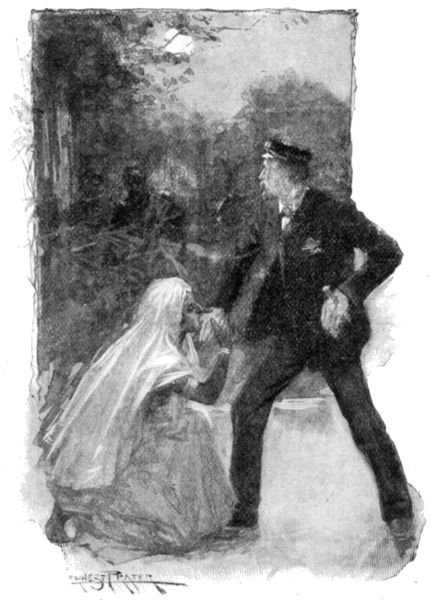 "TAKING THE FINGER THAT HELD THE RING, SHE BIT IT CLEAN
THROUGH."
"TAKING THE FINGER THAT HELD THE RING, SHE BIT IT CLEAN
THROUGH."
And the woman spoke again, and to some purpose, for then the men departed with the prize. And the moon went in again behind the clouds.
"Do not slay me, my lord," the woman was saying, "for your life is not yet saved."
She tore the veiling from her face and bandaged the stump that had been my finger; and then she took my other hand, and, withdrawing the dagger, sucked softly at the poison of the wound. But the pain was too much for me, and I just leaned over and fell fainting to the ground.
Next morning, I found myself in my bunk, and the Second was watching over me, and the woman was crouching on the floor.
"That's right, old man," said the Second, "and now I'll fetch the doctor."
The doctor was the chief engineer, who forthwith came aft with a hot iron and seared the stump of my finger.
"And now, laddie, ye'll do," he said; "and I must awa, for there is some leetle difficulty with the boilers."
"She carried you here," said the Second, answering my eyes, "though how she managed it I can't say. And she had sucked the poison clean from your wound, and Mac said there was no danger left. Though, mind you, the kriss had enough on it to kill twenty men.
"Yes," he went on, "I'm all right, and you shall tell me how it happened to you[Pg 630] afterwards. Now you must swallow this sleeping draught Mac's left for you."
And I swallowed the medicine he gave me.
But I did not sleep; I fell into a stupor. I could not move or speak; yet I could hear and understand.
The sailors were clearing the decks above me; at intervals the steam whistle sounded; we were preparing to get under way.
At last came the cry, "All strangers leave the ship," and there was a bustle across the gangway.
The woman in the corner rose, came to my bunk and kissed me on the lips, opened the door, went into the alley-way and on to the deck. She mounted to the poop above my head, then a shadow passed for a moment athwart my port-hole. I heard a splash—and she had done suttee for her love of me.
The blade of the propeller began to revolve, and the ship to forge slowly forward. My tongue was parched and my temples throbbing, and the delirium of fever came over me.
My eyes still open looked far away forward, into the pagoda of Singapore. And before the Buddha knelt the throng of worshippers, and the idol looked down upon them in content and triumph, and in his nostrils were now the catseyes, sparkling on either side. And a shadowy form that I knew for the ghost of the woman came before the god and fell prostrate, and lay there praying for me; and the idol did not frown, but gazed still content; and I knew that the curse was lifted from me.
Then my eyes could close, and the fire went from them, and the darkness came and gentle sleep.
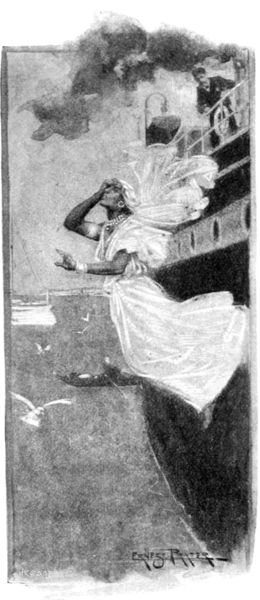 "SHE MOUNTED THE POOP AND JUMPED INTO THE WATER."
"SHE MOUNTED THE POOP AND JUMPED INTO THE WATER."
The next thing I knew was that Mac was pouring quinine down my throat, and we were out at sea and the sun was shining. And at Aden, where we coaled, was a letter from Mary; and I was well again.
The Second met the fate he feared. You know from the papers how the voyage ended; no one knows, and only I can guess, how it came to end as it did. It was off Ushant, almost in sight of home. The Second had the watch. The moon was at its full; there was not a cloud to cast a shadow. The man at the wheel saw a huge rock loom on the starboard bow. He veered off a point to give it a wide berth; the Second came towards him and took the wheel himself. And then, the man declares, he headed straight for the rock, his eyes fixed intently in front of him, his hands a-tremble with unavailing fear. The man thought he was mad, and tried to tear the spokes away; the Second, with strength almost supernatural, with one hand lifted him up, and hurled him to the lower deck. Then the ship forged on, straight to the rock ahead.
The boats were lowered and quickly filled, and were casting off. I sprang up to the bridge—I touched the Second's arm and took his hand in mine.
As I hurried him down the gangway and across the forehold, a boom of the winch pinned him to the deck and he could not move.
Then, as I live, I saw a woman—a black woman—holding him in her arms, holding him down. There came a rush of water. The vessel slid back into the trough of the sea. The woman kissed him—he shrieked aloud—and the waves sucked them in together.
The curse of the catseye was completed.
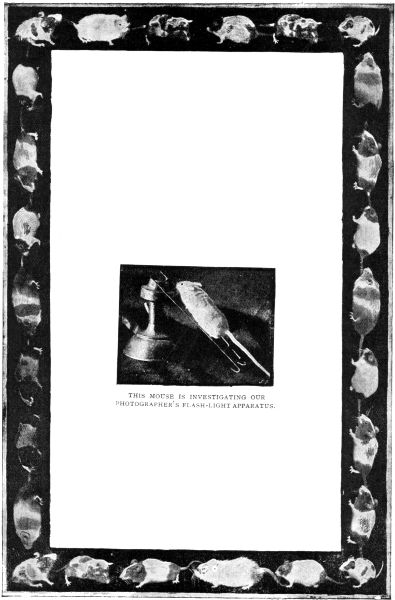
SOME EXTRAVAGANT PETS.
By Gavin Macdonald.
Most of us kept mice in the days of our childhood. They were always white with pink eyes, and our elders objected to them tooth and nail.
Without warning, the mouse fancy has sprung into general popularity, and the craze for rearing and showing the tiny creatures has assumed the proportions of an important and fashionable hobby.
There is a National Mouse Club, a National Mouse Show, and a hundred others of less importance. Nor is there lack of prizes. The Mouse Challenge Bowl is a trophy worthy of consideration by a Derby winner; and there are pots and medals and specials galore for competition by enthusiastic members of the fancy.
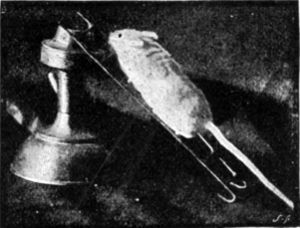 THIS MOUSE IS INVESTIGATING OUR PHOTOGRAPHER'S
FLASH-LIGHT APPARATUS.
THIS MOUSE IS INVESTIGATING OUR PHOTOGRAPHER'S
FLASH-LIGHT APPARATUS.
A first visit to a famous collection is likely to occasion considerable surprise to those who are only familiar with the white and pink-eyed variety and the common little grey-backed member of the household.
During the last two or three years various fanciers have been industriously endeavouring to improve the breed, and they have succeeded in producing the most beautiful specimens. The show mouse is larger than the common household specimen. The eye is much larger and fuller, and the coat would not disgrace a thoroughbred racer. But the chief points are colour and marking. These are simply wonderful. The self colours include not only black and white, but almost every shade between. The black specimens have rich silky coats. The white to be at all valuable must possess black eyes. The pink eye has been eliminated altogether.
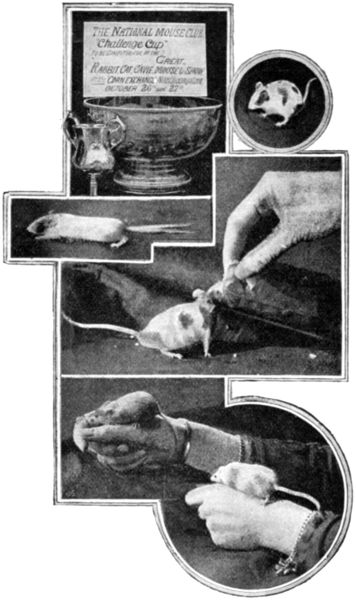 (1) MOUSE CHALLENGE CUP. (2) A MOUSE WITH TWO TAILS. (3)
HOW A LADY FANCIER FEEDS HER PETS, AND (4) HOW SHE PLAYS WITH THEM.
(1) MOUSE CHALLENGE CUP. (2) A MOUSE WITH TWO TAILS. (3)
HOW A LADY FANCIER FEEDS HER PETS, AND (4) HOW SHE PLAYS WITH THEM.
Sables exist in every possible shade, and some of them are of the richest and most beautiful quality. Silver grey is a fashionable colour this year, and I have seen some very perfect specimens with bluish-grey coats.
The marked mouse is a most popular fancy, and no wonder, for in this department the most wonderful results have been obtained, as our illustrations prove.
At the present moment a well-known lady fancier is striving to obtain a Dalmatian mouse. She has already a most wonderfully spotted specimen, and hopes before long to show a perfect example.
Apart from their great beauty, fancy mice pay, and pay well. At the National Mouse Show I was shown several specimens worth £5 apiece, and as much as £20 has been given for a champion. The two mice in our picture of judging are both £5 animals.
Another thing about them is that they are practically all profit. The bread and milk and occasional hemp seed upon which they live is used in such small quantities that an expenditure of 6d. per week will suffice to keep dozens.
Then there are many fanciers who make a lot of money out of their young mice. A working man in the North of England, who is an ardent fancier, makes no less than £15 per annum in this way, besides an occasional pound or two for an extra-promising specimen.
Many fanciers have very large collections. The secretary of the National Mouse Club possesses some 2,000 in his cages, and I know at least half a dozen others whose collections range between two and five hundred. At one day old the mice are little pink objects scarcely longer than a wax vesta, minus sight and minus coat. I saw a litter of this age in Staffordshire some time ago. A fortnight later they were in full war paint, and were winning prizes at a big show in the "under eight weeks" class. It is well that they develop so quickly, since at two years they get ill and out of condition and are usually destroyed.
There are many collections in this country valued at £30, and I know of one for which £100 has been offered and refused.
As with other fancy animals, the best specimens are selected from a litter and the rest are drowned. The selected mice are reared with the greatest care, and as soon as they are of the right size and age they commence the round of the shows. At home they are kept in immense tenement cages, divided into tiny compartments for two, but they travel to the shows singly in special exhibition cages.
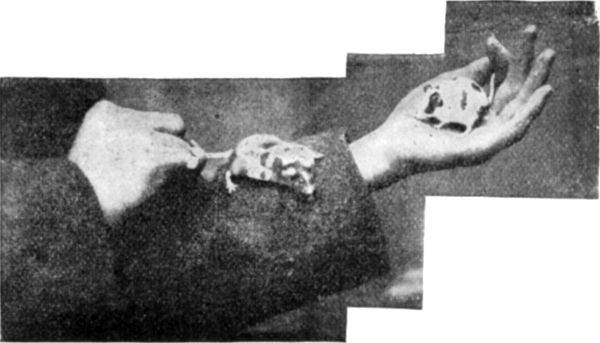 "MATCHLESS," THE CHAMPION MOUSE—SHOWING HOW THE JUDGING
IS DONE.
"MATCHLESS," THE CHAMPION MOUSE—SHOWING HOW THE JUDGING
IS DONE.
These exhibition cages are packed together in a live-stock box, and on their arrival at their destination are taken charge of by special stewards, who see to the feeding arrangements and place them in their right classes.
Great interest is taken in the judging of these tiny creatures, and the judge is always surrounded by an eager crowd of spectators. Usually he contents himself with a glance in the box, shaking it up if the occupant is of a lazy disposition. When it comes to taking stock of a particularly good exhibit the mouse is taken out of the cage and examined.
They are always lifted and held by their tails during this examination. In the case of it being necessary to compare two competitors, they are held on the sleeve as illustrated in our photograph of judging.
In this picture, Mr. Richards of Dursley, Gloucestershire, is seen judging two specially fine specimens, the mouse to the left being Mr. Singleton's famous champion "Matchless," one of the most perfect show mice living.
The border on the first page of this article is entirely composed of photographs of show animals, and gives a very good idea of the beautiful markings so much sought after by fanciers.
Miss Grimston owns a famous collection, which she keeps at her house in Mayfair. Each mouse is named, and the idiosyncrasies of its character are well known to its mistress. Two fine specimens are shown sitting on her hands. The mouse on the ladder is also hers.
This lady possesses a unique playground, fitted with a tiny gymnasium. The young mice are turned into this for exercise and play. It keeps them in health and coat, two very necessary conditions for show purposes.
Miss Grimston is a particularly successful exhibitor, having captured some dozens of prizes, including cups and medals. Her collection at the present time contains some forty show specimens. They are rarely home for long together. As soon as they return from one show they are off to another.
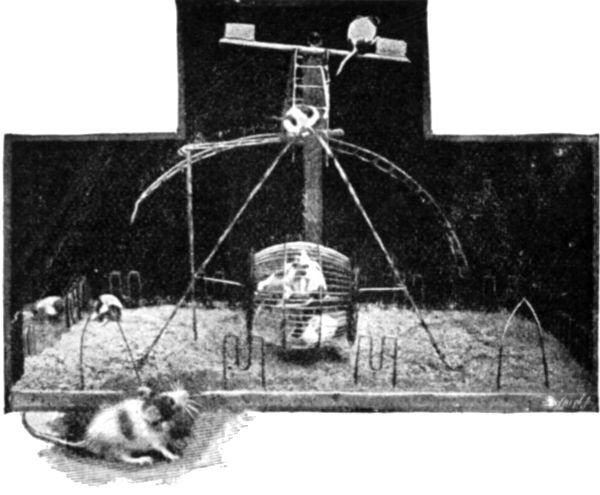 "WHEN THE CAT'S AWAY, THE MICE WILL PLAY."
"WHEN THE CAT'S AWAY, THE MICE WILL PLAY."
The exhibition cages shown in the illustration at the foot of this page are a representative collection.
Although more or less of regulation size, shape and ornamentation are left to the individual taste of the fancier.
As a result, many of them are extremely decorative, poker-work sketches and other novel methods of adornment being commonly resorted to.
Many fanciers make their own cages and live-stock boxes, and combine the mouse fancy with amateur carpentry. One fancier who is his own carpenter has received so many applications for the address of the maker of his exhibition cages, that he has taken up cage-making professionally, and makes over £50 per annum in his spare time by the sale of his handiwork.
It is needless to say that cats are unknown in the establishments of show mouse owners, and show committees have to exercise the greatest care in order to exclude cats from the exhibition rooms.
It is a capital hobby, full of interest and fascination.
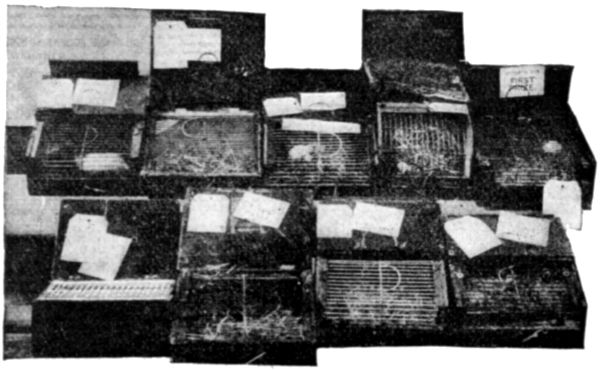 SOME OF THE MICE CAGES AT THE NATIONAL SHOW.
SOME OF THE MICE CAGES AT THE NATIONAL SHOW.
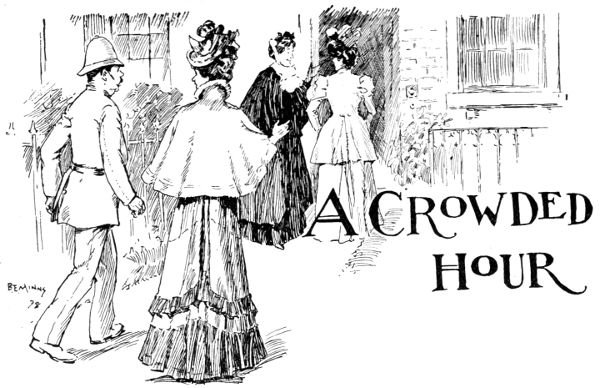
A COMEDY OF THE STREETS.
By Clarence Rook.
Illustrated by B. E. Minns.
Very few people knew what really caused the crowd which collected so suddenly one evening in front of a house in the neighbourhood of High Street, Kensington—to be precise, in Lower Phillimore Place—and practically blocked the traffic in that busy thoroughfare.
The crowd itself had no clear notion of the cause of its coming together. For in order to produce a crowd it is by no means necessary that the individuals who are to compose it should have any reason for their assembling more definite than the fact that there is an assembly.
Primarily, however, it was Esther who was the cause of the crowd.
Esther, who you must know is my sister, had been growing quite prosperous. After a year or so of hard and unremunerative work, Esther had gained a position on the staff of a leading ladies' newspaper; and thereafter, week by week, Esther produced pictures of attenuated ladies with crooked forefingers, attired in the height of fashion, and pretending that their waists did not hurt them the least bit.
So, finding herself with an assured income which, if not large, was adequate to her modest needs, Esther determined to quit her dingy lodgings in a Bloomsbury side-street and furnish a dwelling for herself. In this project she was encouraged by her bosom friend Susie, who, being a certificated nurse with a private practice, wanted a comfortable home in the intervals between her cases, and was willing to contribute some furniture and a share of the expenses.
After much search among the advertisements in the newspapers in the Free Library, followed by hurried rushes on her bicycle to the uttermost ends of London, Esther found a house in Lower Phillimore Place of which two floors and the basement were to be let unfurnished. It was precisely the sort of place the two girls wanted, and as the rent was reasonable Esther at once arranged to take it. Esther was to occupy the ground floor, the first floor would be reserved for Susie whenever she required it; in the basement a respectable woman would live, and cook, and sleep. Esther began to look about for the respectable woman.
It was only then that Esther suddenly bethought herself of the extreme danger of sleeping—a solitary and unprotected woman—upon the ground-floor of a London house. For an hour or so the difficulty seemed insurmountable, and it appeared to Esther that she must cancel the agreement. I suggested a dog. But, as Esther at once pointed out, a determined and unscrupulous murderer would not hesitate to poison a dog.
Then I proposed that a respectable[Pg 635] married couple should be engaged. Probably, in consideration of living rent free, the woman would do the housework during the day, and the husband would kill murderers at night. Esther considered a moment. The idea appealed to her.
"Why not a policeman and his wife?" said Esther.
With Esther to decide is to act. Within an hour she had laid her scheme before the Inspector in charge at the Police Station by St. Mary Abbott's, and enjoined upon him to search his division for a married constable of lofty character who would like to live rent free in a dry and roomy basement. Within twenty-four hours the constable was found.
Esther viewed him with approval, for he was large and serious; he had the highest of characters, and had married a cook from De Vere Gardens who had received a plated teapot from her late mistress as a mark of esteem. They both assured Esther that they would do their best by her and the other young lady, and an appointment was made for a view of the house in Phillimore Place.
And so it came about that, one evening, just as dusk was falling, Esther and Susie met the constable and his wife outside the house, and, after greeting each other on the pavement, entered together. At that moment an errand-boy was slowly propelling a carrier tricycle along by the kerb. His day's deliveries were accomplished, and, as he looked this way and that way with a mind receptive of stray impressions, his eye fell upon Esther and her companions. He was immediately conscious of something unusual.
There is nothing remarkable about a policeman in Kensington High Street; but a policeman being conducted into a house by a young lady, and closely followed by two other women, one of whom wears a nurse's uniform, affords matter for conjecture. The errand-boy applied the brake to his cycle, and came slowly to a standstill just below the house, at which he looked thoughtfully. Esther with the constable and the nurse and the constable's wife had disappeared through the front door, and for a minute or so nothing more happened.
The boy, disappointed of his expected sensation, was just bending forward to start his cycle again when he caught sight of an acquaintance who was carrying a basket containing a dozen of stout. A shrill whistle brought him to the side of the cycle.
"Wotcher!" he said.
"There's a copper gone in there," said the boy on the cycle, nodding towards the house. "And a 'orspital nurse."
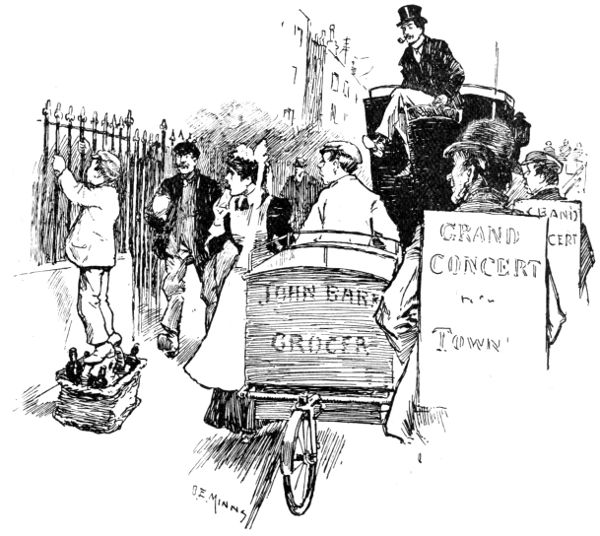 "'THERE'S A COPPER GONE IN THERE, AND A 'ORSPITAL
NURSE,' SAID THE BOY ON THE CYCLE."
"'THERE'S A COPPER GONE IN THERE, AND A 'ORSPITAL
NURSE,' SAID THE BOY ON THE CYCLE."
The other boy regarded the house critically.
"Was there a accident?" he asked.
The boy on the cycle, having no more information to give, said nothing, but nodded again towards the house. Someone within had struck a light, and the constable could be plainly seen standing in the middle of the empty ground-floor room.
A hansom driver, crawling from the westwards in the hope of picking up a fare to the Strand, paused in the act of lighting his pipe and pulled up just in front of the cycle. A servant girl who had been sent out to post a letter noticed an errand boy set down his basket upon the ground and balance himself upon the rim,[Pg 636] whereby he was enabled to peer over the top of the railings, and she stood still to watch him; while three sandwich men mournfully advertising a concert at the Town Hall halted in the roadway and looked with dull curiosity at the cabman, who had hitched himself round on his seat, and with one leg swinging in mid-air was wondering what he could charge for a really urgent case to St. George's Hospital.
"What's matter?" asked a homeward-bound workman who was vaguely conscious of an unusual obstruction, and found the railings a convenient support.
"Ain't nothing the matter," said the boy on the basket, looking round. "You tike that fice 'ome."
The workman, finding it easier to stand still by the railings than to walk, remained where he was.
"I stops where I am," he murmured; "see what's matter. All kinds things happen in mighty metrolo—metrolopus."
The old gentleman who takes the air every evening along a beat of a hundred yards or so of pavement in Phillimore Place halted and looked inquiringly at the boy on the basket, disgustedly at the workman clinging to the railings. Then, over the shoulder of the workman the old gentleman caught sight of the policeman, who was now standing in full light back to the window; while Susie, bending down with tape-measure to calculate the amount of carpet required, could be dimly seen by those outside to be busied with something on the floor.
"Dear me!" said the old gentleman.
"There's—body in there," said the workman. "That's what 'tis. Body."
"Bless my soul!" said the old gentleman, looking round at the group of people on the pavement. "Has there been a murder? Does anyone know?"
No one cared to admit that he did not know what he was looking at, whereas any positive statement might be controverted by someone with knowledge. So no one answered, but all stood watching.
By this time the pavement was pretty well blocked, and wayfarers had either to take to the roadway or to join the knot of people collected in front of the railings and waiting anxiously upon events.
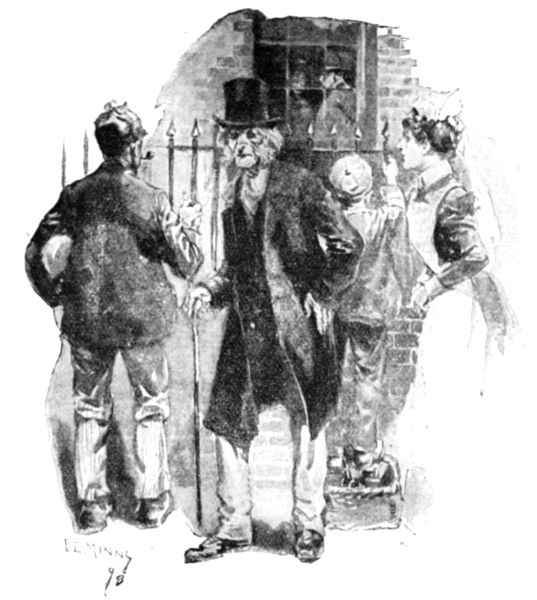 "'HAS THERE BEEN A MURDER? DOES ANYONE KNOW?' SAID THE
OLD GENTLEMAN."
"'HAS THERE BEEN A MURDER? DOES ANYONE KNOW?' SAID THE
OLD GENTLEMAN."
Most of them chose the latter course, assuring each other that there was really nothing to wait for.
"Oh, there's a 'orse down; let's go and look, Alf," said a young woman to her husband, who was carrying something tasty for supper in a piece of newspaper.
"Oh, kem on," said Alf. "You're always wanting to 'ang about for this, that, and the other."
"Well, I'm sure, Alf, it's little enough excitement I get, day in, day out, and—oh, wait a minute; I needn't reely wash biby to-night."
"'Taint a 'orse," said a seedy-looking man, whose height gave him a view over the heads of the crowd. "It's in that house, that's where it is."
"What is?" asked Alf, still incredulous.
"Oh, there's a pleeceman in there, Alf," said the young woman, delightedly.
"Then there ain't much the matter," said Alf, his good temper restored by the consciousness of a ready wit. "They're[Pg 637] 'andy enough when they ain't wanted to be, and when they are wanted——" He sought vainly for a means of elaborating his joke. "Now then, where yer shovin'?"
"Shovin' yerself," was the reply; "don't other people want to see same as what you do?"
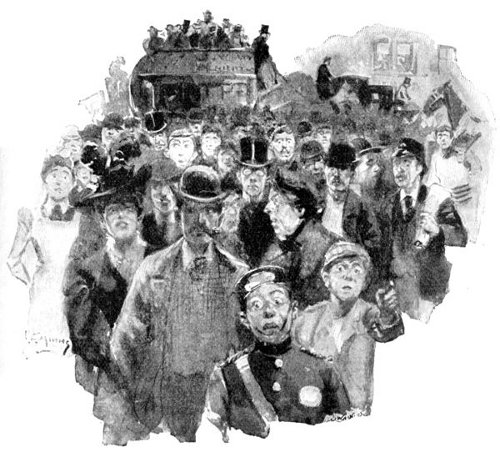 "THE CROWD STRETCHED NEARLY ACROSS THE ROADWAY, IMPEDING
THE TRAFFIC."
"THE CROWD STRETCHED NEARLY ACROSS THE ROADWAY, IMPEDING
THE TRAFFIC."
For the crowd had already begun to press behind, and, stretching nearly across the roadway, was impeding the traffic. One omnibus, indeed, which had stopped to set down a passenger, remained standing, and the inside passengers had crowded out upon the roof to see what was the matter. From the shops opposite came the assistants, and they stood in the doorways, asking in vain for explanations, which no one could give. Conjecture, however, was frequent; and a butcher's bookkeeper, being a man of action, went off to rouse the nearest fire station.
In a minute more, the nucleus formed by one errand boy on a carrier cycle had collected about it a solid mass, which completely stopped the omnibuses and cabs, and gathered volume and consistency from every wayfarer who came within its influence. Even the errand boy himself, impressed with the seriousness of the situation, was convinced of the nearness of tragedy, and was busily setting forth to those around him what he had seen.
"Stand back, can't you?" cried an officious man upon the outskirts of the crowd on the opposite pavement. "How ridiculously people do act in an emergency! What's the use of crowding round?"
His neighbours looked resentfully at him.
"Stand back, can't you; stand back and give her air."
"Give 'oo air? You keep your'n on," said an on-looker, elbowing him back.
"Why, it's a girl, isn't it? At least, they told me so," said the officious man. "Why do people push so? There's absolutely nothing to get excited about."
"Girl, I dessay. But she's in that house over there."
"Most extraordinary thing," said a tradesman, who was standing in his doorway. "That house is unoccupied. Been empty for three weeks or more."
"And they've only just found the poor girl inside," exclaimed the officious man. "Well, of all the useless, incompetent people in the world, I really do think the London police bear away the palm. And why on earth don't they keep the crowd away? Where are the police? Here, someone go and call a constable."
No one showed any desire to resign his point of view; and the cabs going town-wards in a hurry turned down a side street to save time.
"'Ear that, Emmer?" said a woman in a shawl, who was standing in a group of dishevelled companions. "The poor gal's been lyin' in that empty 'ouse for three weeks; ain't it a shime?"
"Ah, it's jest like 'em," said another, vaguely.
"Well, I ain't what yer might call soft-'earted," said the first, "but think of me[Pg 638] livin' 'andy all that time, and the pore girl——"
"Yes, you can lay and rot for all they care," said the other. "I might die in me bed time and time again, and no one any the wiser. Not but what I've got any right to becall you, Mrs. Robins. Think she's dead?"
"Dead? No. Can't you see the 'orspital nurse stoopin' down over 'er? They wouldn't 'a 'ad a 'orspital nurse if she was dead."
Just then the door of the house opened, and the crowd swayed excitedly as Susie appeared with the constable, and stood for a moment in surprise on the top step.
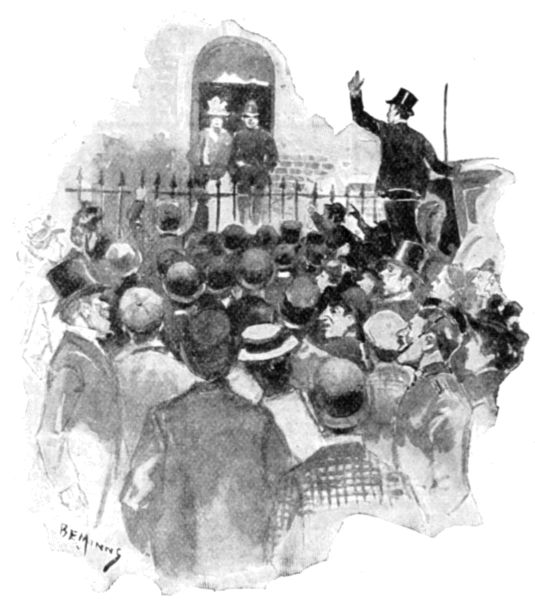 "THE CROWD SWAYED EXCITEDLY AS SUSIE APPEARED WITH THE
CONSTABLE."
"THE CROWD SWAYED EXCITEDLY AS SUSIE APPEARED WITH THE
CONSTABLE."
"Where's the ambulance," cried the officious man. "Why don't they send for the ambulance? What is the good of the police if they can't——"
"Now then, what's all this? Pass along, please, pass along."
Five or six policemen appeared simultaneously from different directions.
"Over there, in that house. That's where it is," cried several voices.
"Stand back there! let the police through!" cried others.
The constables pushed their way through the throng to the point where Susie and the policeman were standing, and the crowd stood in intense silence while a hurried consultation took place. A moment or two later Esther and Susie entered the hansom, which was still waiting in the hope of a case for St. George's, and drove off through the passage cleared by the police.
"Now then, pass along 'ere, pass along," said the police. "There ain't nothing to look at 'ere."
"Well, but aren't you going to bring the girl out?" asked the officious man of a constable.
"Pass along, if you please."
"What is the good of making such a mystery of it?" said the officious man. "That's the way half the crimes go undetected. I daresay it's all simple enough if the truth were known. I maintain the public has a right to be taken into the confidence of the authorities."
"'Ushing of it up," said the woman in a shawl. "'Ushing of it up."
"And I dessay they're well paid to do it," said her companion.
"Well, that's another added to the unsolved mysteries of London," said the respectable-looking working-man, addressing his neighbours, "but it's another nail in the coffin of——"
"Now then, your supper's gettin' cold," said the constable.
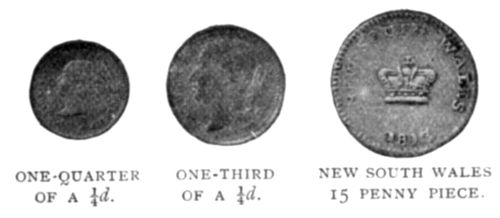 ONE-QUARTER OF A 1/4d.
ONE-QUARTER OF A 1/4d.By Robert Machray.
There seems to be scarcely any nation or tribe, no matter how savage and barbarous, but has a money, or some kind of currency equivalent to money, with which it discharges its debts and pays for the articles it requires or covets.
Many of the specimens shown in the illustrations accompanying this article of moneys "current with the merchant" will seem strange enough, but it must be remembered that it was from the use of just such objects long ago that the highly developed monetary systems of the Western world have come.
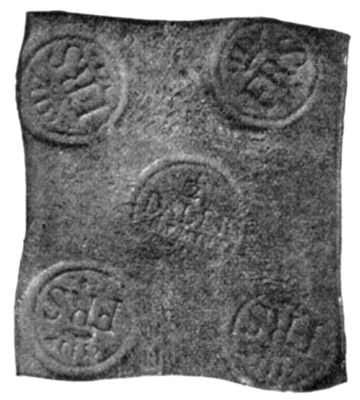 A HALF-DALER PIECE, WHICH MEASURES THREE INCHES SQUARE.
A HALF-DALER PIECE, WHICH MEASURES THREE INCHES SQUARE.
Amongst the most civilised races gold and silver coin, or "bank-notes," secured by deposits of gold and silver or by Government guarantees, are the recognised media of exchange. Modern coinages exhibit many specimens of beautiful and artistic moneys, and the notes—bills, as they are called in America—issued by the Bank of England, the French, United States, and other Governments, are, if not exactly artistic, wonderfully ingenious devices for baffling the skill of the forger. But in savage countries the forger has no place, for the moneys there in use could not possibly be counterfeited.
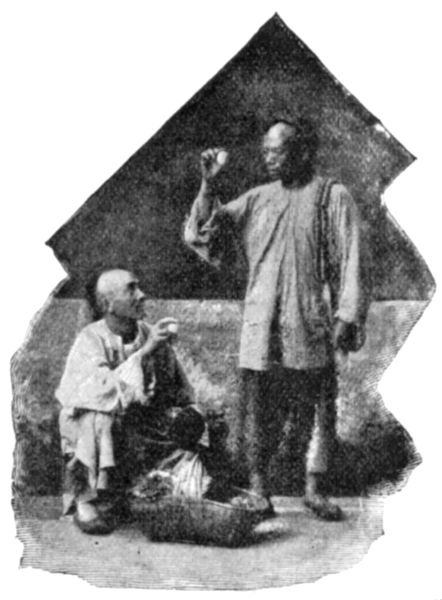 CHINAMAN BUYING EGGS, WITH THE "CASH" OVER HIS SHOULDER.
CHINAMAN BUYING EGGS, WITH THE "CASH" OVER HIS SHOULDER.
Amongst the commonest of all currencies is the shell, and at the present time it is quite extensively used in various parts of the world—in Africa, in the Pacific, and in parts of Asia. In Africa, the Shell-Money is the cowry, and it is customary for the natives to adorn their gods, fetiches, and other objects of veneration with ropes of these shells. In British Columbia, Haikwa shells were used as money.
 CHINESE SILVER WILLOW-LEAF-MONEY.
CHINESE SILVER WILLOW-LEAF-MONEY.
One of our illustrations shows the form shell-money takes in the Solomon Islands, the shells being strung in ropes a fathom long. Another picture shows a satchel belonging to a native of New Caledonia with a quantity of shell-money in it. Sometimes the shells used are of quite a large size; at other times again they are exceedingly minute. Their[Pg 640] value appears to depend on their colour and shape, the most valuable being those which were most suitable for the adornment of the person.
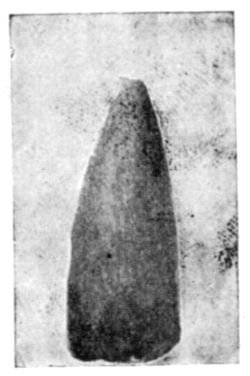 ADZE-MONEY, THE PRICE OF A FAT MAN FOR CANNIBALS.
ADZE-MONEY, THE PRICE OF A FAT MAN FOR CANNIBALS.
The next group of currencies is of a somewhat different class. In this case feathers take the place of shells, and three examples are given of this Feather Currency. In one example we see a specimen of what is known as the Red Feather Currency. Over a band of vegetable fibre is woven a material composed of red parrot feathers, held in place by two boards placed in the middle above and below the band; the whole was carried in a bag.
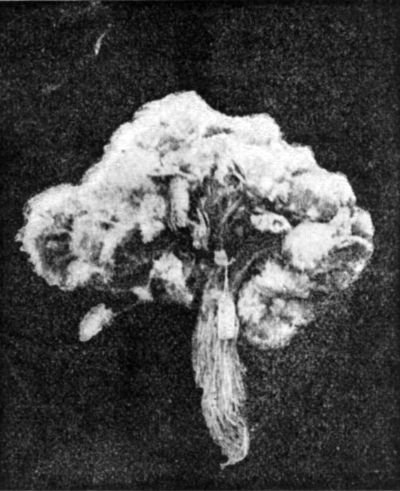 FEATHER-BRUSH-MONEY FROM THE SANDWICH ISLES.
FEATHER-BRUSH-MONEY FROM THE SANDWICH ISLES.
In another instance, the feathers are arranged to form something like a brush, the brush itself being made of the coloured tufts or portions of birds' plumage, while the handle is composed of strands of plaited grass. This sort of money was obtained in rather a cruel way, for the birds who were despoiled of their brilliant feathers were not killed before the operation; their bright plumage was plucked from their living bodies, and then the birds were allowed to fly away again. No doubt in the course of time the feathers grew again, when the birds would be caught and the operation performed once more.
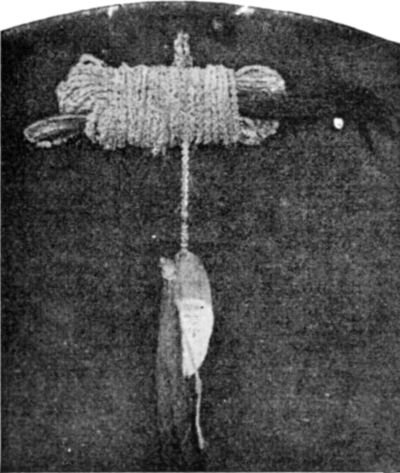 MONEY BY FATHOMS—A FATHOM OF SHELL-MONEY.
MONEY BY FATHOMS—A FATHOM OF SHELL-MONEY.
The particular home of the feather currency was the Sandwich Islands, the natives of which made gorgeous robes and helmets for their chiefs and kings out of these much-prized feathers. A third example is of what is known as Flying-Fox-Money. The fur of the flying-fox is made into cords, as shown in the illustration, and is very good "money" indeed in the Loyalty Islands.
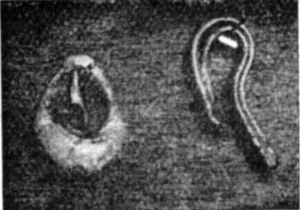 COWRY-SHELL-MONEY | FISH-HOOK-MONEY.
COWRY-SHELL-MONEY | FISH-HOOK-MONEY.
One of the most elementary forms of currency is Adze-Money, and the specimen selected for presentation here comes from these same Loyalty Islands. This adze blade is of jade, and I am told that it represents "the price of a fat man for cannibal purposes."
How enormously valuable such adzes as these are is shown by a statement that any native who becomes possessed of one is regarded by his fellows as a millionaire, and in a certain tribe which possessed but one such adze the coveted object was passed at the end of each week from one native to another. Its lucky possessor for the time being was regarded as the richest man in the world by all the others, who waited impatiently to become in their turn millionaires "for one week only."
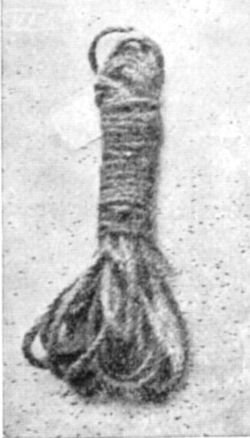 CORD MADE FROM FLYING-FOX USED AS CASH.
CORD MADE FROM FLYING-FOX USED AS CASH.
Amongst other queer kinds of money in use in the South Seas may be mentioned the "Tabua" or whale's tooth of Fiji; the Mat-Money—small mats[Pg 641] made of grass, curiously woven in quaint patterns, current in various parts of Melanesia (a somewhat similar currency is to be found amongst the Thlinket Indians of Alaska); and rings of quartzite, of which an illustration, taken from a specimen from the New Hebrides, is given above.
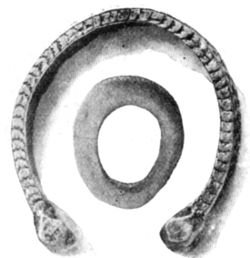 QUARTZITE RING AND MADAGASCAR BANGLE.
QUARTZITE RING AND MADAGASCAR BANGLE.
It may be noticed that there is much of the artistic about these Pacific Islands moneys; those current in Africa do not exhibit any characteristic of the kind; they are simply barbaric. Here, for instance, is a rough ingot of copper of cruciform shape, which was used as money in East Central Africa, and represents what would be equivalent to a very heavy balance at an English bank account.
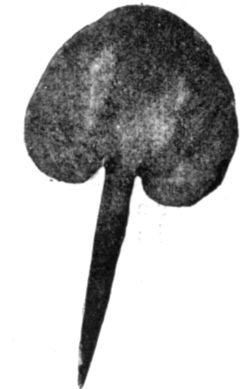 SPADE-HEAD.
SPADE-HEAD.
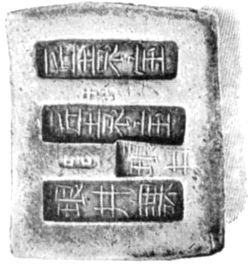 SQUARE INGOT MONEY. WEIGHS 1-1/2 LBS.
SQUARE INGOT MONEY. WEIGHS 1-1/2 LBS.
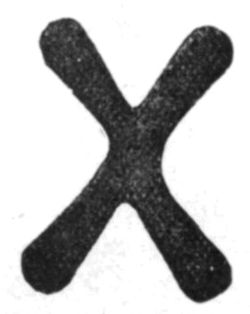 INGOT OF COPPER FROM EAST CENTRAL AFRICA.
INGOT OF COPPER FROM EAST CENTRAL AFRICA.
Implements of iron, such as iron spades and the heads of hoes, and so on, were widely circulated as valuable consideration for the purchase of ivory, and ivory itself was, and still is, one of the most valuable of African currencies. From the spade to the spear is but a step, so we need not be surprised to find that the shaped spear-head is equal to a great many pounds sterling on the higher waters of the Congo.
Another form of African money is the armlet or bangle made of metal—bronze most commonly, silver sometimes, gold very rarely; and these are classed under the head of what is known as Ring-Money or "Manillas." However, it must be said that the use of bracelets and bangles as currency was quite common in ancient times before the invention of stamped or coined money.
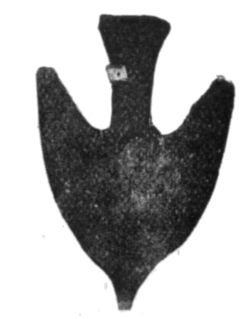 IRON SPADE.
IRON SPADE.
Everyone is probably aware that beads have played a large part as a currency when Western merchants have been trading with savage tribes; but few people, I imagine, can have any idea how Bead-Money was systematised by Englishmen in their dealings with the natives of Africa. What I am about to say seems beyond belief, but yet it is true. There was one sort of beads used for the purchase of palm oil, a second for ivory, a third for gold, and a fourth for slaves.
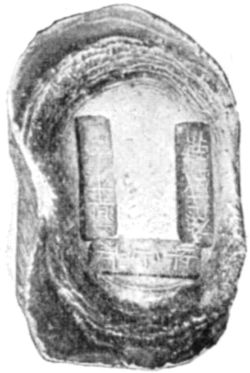 CHINESE BOAT MONEY
CHINESE BOAT MONEY
Our illustrations on p. 644 show the different shapes and sizes of these beads, which were made in London, but they do not exhibit the colours, which were an important feature. These bright and shining baubles tickled the savage fancy, and the same love of bright objects has been already noticed with respect to shell-money.
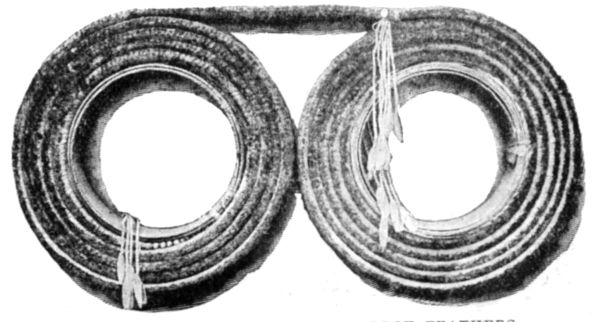 FEATHERS AS MONEY—RED PARROT FEATHERS.
FEATHERS AS MONEY—RED PARROT FEATHERS.
One of the quaintest of all currencies is that known as the Fishhook-Money, which can hardly be said to have even yet died out of use along the shores of the Persian Gulf. It is supposed that these Larins, as they are termed, originally came from Ceylon, and they consist of thin pieces of silver bent into the shape of a hook about an inch in length. In some cases copper is used instead of silver, but each piece is stamped with its value.
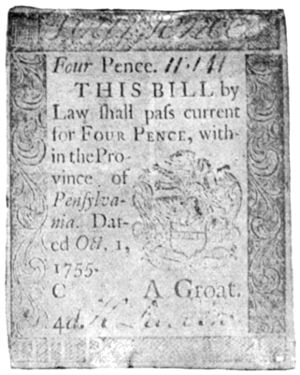 A PAPER BILL FOR 4d.
A PAPER BILL FOR 4d.
 CONGO SPEAR HEAD AS CASH. THE BARB IS JOINED TO THE SPEAR.
CONGO SPEAR HEAD AS CASH. THE BARB IS JOINED TO THE SPEAR.
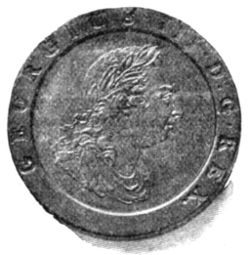 ENGLISH 2d. PIECE, WEIGHS 2 OZS.
ENGLISH 2d. PIECE, WEIGHS 2 OZS.
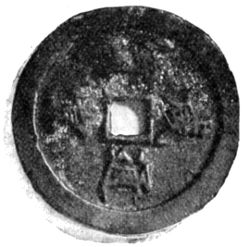 CHINESE CASH, CARRIED ON STRINGS. 1,000 = 3s.
CHINESE CASH, CARRIED ON STRINGS. 1,000 = 3s.
The great merchants of the East are the Chinese, and the different forms of money they have brought into use do not strike us as being particularly convenient. The commonest of all Chinese moneys is the cash—a round metal disc with a square hole in the middle, the value of a thousand cash not being much more than three shillings. These cash are carried about in long strings, and the hole in the middle receives the string. This form of currency is developed from what is generally termed "key-money" or "knife-money."
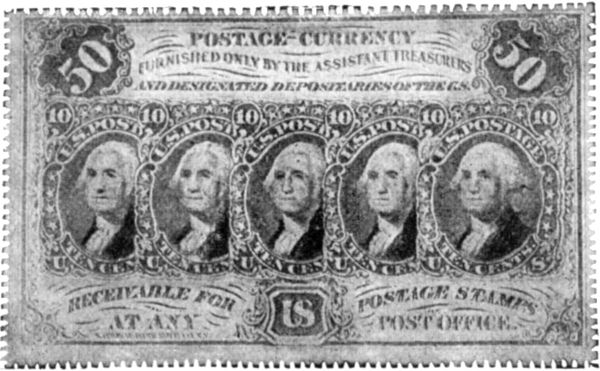 PAPER POSTAGE-MONEY FOR BUYING STAMPS.
PAPER POSTAGE-MONEY FOR BUYING STAMPS.
Silver is the great medium of exchange in China and elsewhere in the East; and a regular feature of all cities and towns and even villages in China is the money-changer, who in return for so much weight of silver will hand out so many strings of cash. The silver used in these exchanges is called Sycee silver, and is apparently of any shape or size.
Sometimes the silver takes the bar or ingot shape, and is then termed Nen. The specimen on page 643 is an unusually large one, and weighs nearly a pound and a half. It was used as currency in Upper Cambodia, and is stamped on one side with a Chinese inscription which specifies the weight of the silver and also the name of the merchant who weighed it and affirmed how much it was worth.
But besides the ingot shape, this Chinese silver currency is found in many forms, not only in China, but in Singapore, in Ceylon, and wherever the Chinese trader is found, such as Hat-Money, Shoe-Money, Boat-Money, Snailshell-Money,[Pg 643] Willow-leaf-Money—terms which are all derived from the actual form the silver has taken after it has come out of the mould and received the stamp of the particular Chinese merchant who makes himself responsible for its quality and weight. Some of these pieces are very small, and consequently are of little value.
 THESE SHELLS WERE USED AS MONEY IN BRITISH COLUMBIA.
THESE SHELLS WERE USED AS MONEY IN BRITISH COLUMBIA.
The oddest of them is certainly the Snailshell-Money, which is really a bubble of silver solidified into the shape of a shell. It is characteristic of this sort of money that the silver shows the marks of the crucible in which it was melted on the side opposite to that which has received the inscription. To the same class of currency belongs the Bullet-Money of Siam—lumps of silver of various sizes stamped on one side. This currency is generally about an ounce in weight, but there are in existence specimens of it as small as fine shot.
 BURMESE GAMBLERS' PORCELAIN-MONEY.
BURMESE GAMBLERS' PORCELAIN-MONEY.
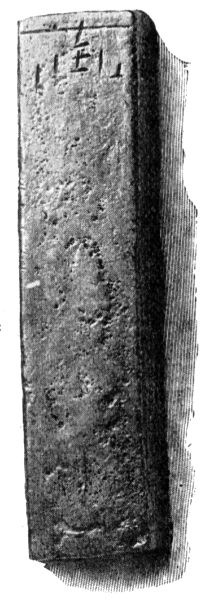 BAR-MONEY USED IN CHINA.
BAR-MONEY USED IN CHINA.
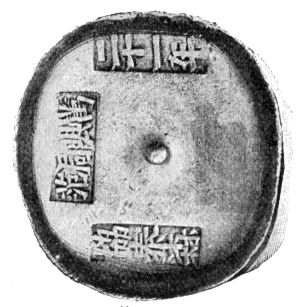 SILVER "SHOE-MONEY."
SILVER "SHOE-MONEY."
One of our illustrations exhibits what is probably the least valuable currency in the world—the porcelain currency used among the gamblers of Burmah and Siam. Originally intended as nothing more than counters, they have come to be regarded as money, but of very small value. They are of various shapes and sizes, with a figure or emblem of some sort on one side, and on the other an inscription in Chinese, stating how much such and such a merchant will give for them. I fancy it takes about a barrelful of them to make a "trade."
Probably the largest pieces of money that have ever been brought into existence are those known as "Money of Necessity." During the Stuart wars Charles I. and James II. both coined money of this sort out of silver plate, gun metal, or anything else that came handy. You will find such pieces in any museum, and they are of all shapes and sizes.
 SIAMESE BULLET-MONEY—WEIGHING AN OUNCE DOWNWARDS.
SIAMESE BULLET-MONEY—WEIGHING AN OUNCE DOWNWARDS.
The most remarkable specimens which I have been able to find of Money of Necessity are Swedish in their origin. The half-daler piece on page 639 is a mere baby, although it is three inches square. A four-daler piece was rather more than a foot square, and weighed nearly seven pounds. There is a specimen of an eight-daler piece in the British Museum, which is nearly a yard long and a foot broad. Just fancy carrying a few such pieces about in one's purse![Pg 644] Perhaps the largest piece of money in circulation in this country in recent years was the two-penny copper piece known as the "cartwheel," issued in 1797. It was quite a chunk of metal, and weighed exactly two ounces. A few years ago a gentleman collected a very large number of these two-penny pieces, and paved the floor of his smoking-room with them. No doubt they made better bricks than coins.
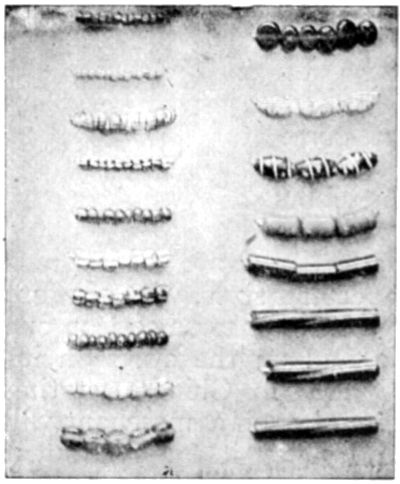 BEADS TO BUY PALMS.
BEADS TO BUY PALMS.
The smallest pieces of British money have been issued for Malta and Ceylon, and are of such microscopic values as one-third and one-fourth of a farthing. The illustrations show the full size of the coins.
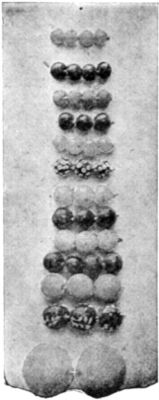 BEADS TO BUY IVORY.
BEADS TO BUY IVORY.
The history of the fifteen-penny piece illustrated at the top of this article is certainly curious. It was good money in New South Wales some seventy years ago. In those days there was a great scarcity of "change" in the colony, and the piece of money in general circulation was the Spanish dollar. To make it go further, the centre of the dollar was punched out, and the bit of silver thus obtained was christened "fifteen pence," and put into circulation as of that value. The mutilated dollar still retained its original value, and was known as the "Holy Dollar"—from the round hole in it.
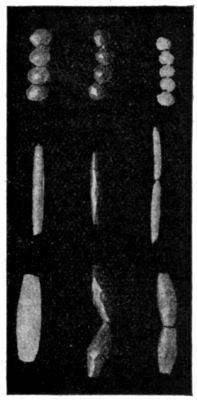 BEADS IN EXCHANGE FOR SLAVES.
BEADS IN EXCHANGE FOR SLAVES.
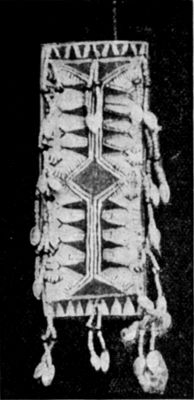 NEW CALEDONIA PURSE COVERED WITH SHELLS.
NEW CALEDONIA PURSE COVERED WITH SHELLS.
Amongst other examples of small currencies I have selected the Groat-Bill issued in the States before the Revolution, and also a specimen of the small postage-currency in use in the States immediately after the Civil War.
For the loan of all the Queer Cash which illustrate this article, we are indebted jointly to Messrs. Spink, of Piccadilly, and to the authorities of the British Museum.
They are not a tithe of those which we might have published, but they are among the most interesting, and show that the money instinct is prevalent the world over. "Hard" cash it can scarcely be called, for the feather currency at least is deliciously soft.
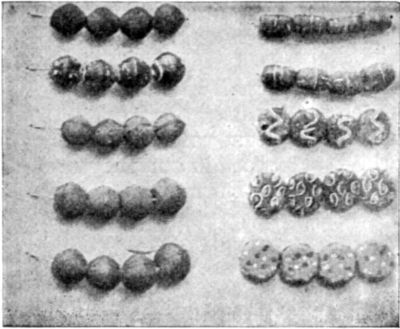 BEADS TO GET GOLD.
BEADS TO GET GOLD.
AN ACCOUNT OF A BIT OF STRATEGY.
By E. Burrowes.
Illustrated by Sydney Cowell.
No one ever disputed the fact that Mrs. Bladon was a distinctly clever woman. And it proved to be an equally undisputable fact that when Ted Lumsden managed to outwit her he became the hero of the hour. It happened on this wise:
Colonel and Mrs. Bladon had a daughter—and a pretty daughter.
Ted Lumsden was young, good-looking, sufficiently well possessed of this world's goods to be able to regard matrimony as quite a necessary and probably pleasant experiment. Given two young people with youth, beauty, and power of attraction, and the solution of the problem is quite simple.
Ted Lumsden loved Nancy Bladon, whilst Nancy—well, she just tolerated him. That was what she said to him; what her real feelings on the subject were is quite another question.
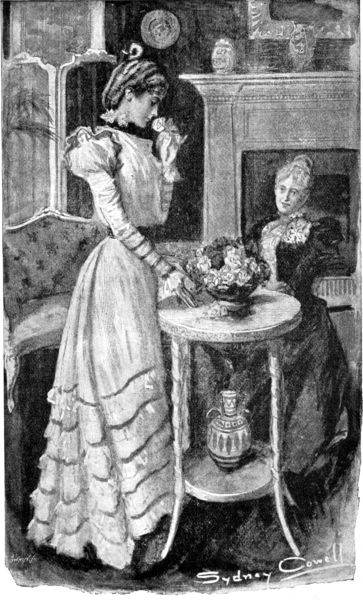 "'I HATE GOING ABROAD. MOTHER, YOU HAVE SOME OTHER
REASON.'"
"'I HATE GOING ABROAD. MOTHER, YOU HAVE SOME OTHER
REASON.'"
But there was Mrs. Bladon in the matter, and she, like the clever woman she was, said nothing, but thought[Pg 646] the more, until one day when for ten minutes she opened her heart to her husband, and for those ten minutes spoke concisely and to the point.
"You understand, Roger," she concluded, "it is not that I object to Lumsden at all; far from it. But what I do object to is the fact that for years—now don't laugh—years, I repeat, this has been going on, and nothing definite has ever come of it. Either he is in no hurry, or else he means nothing, after the fashion of young men of the present day. Enfin, I do not intend Nancy to be kept in a kind of suspense any longer. If she cares for the boy—well, I am sorry; but my mind is quite made up on one point: I shall not encourage Ted to haunt our house any longer. And I shall make it a good excuse to give Nancy three months on the Continent."
"Après cela—le déluge," muttered Colonel Bladon, lazily. "Well, you know best, my dear; only I don't see why Nancy should be exiled."
"Nonsense; it is no exile to travel for a bit and see a little of the world. At any rate, it will simplify matters, and that is everything."
So it came to pass that a decree went forth which, like the laws of the Medes and Persians, altered not. Miss Bladon, chaperoned by Lady Forsyth, would spend the winter abroad.
"A slight delicacy of chest," murmured clever Mrs. Bladon in answer to inquiries. "No, nothing serious; still, we think a winter abroad advisable, under the circumstances."
And the world took its cue very adroitly, and immediately detected a "transparency" about Nancy's pretty face and round, soft cheeks.
The first inkling of the plot reached Ted Lumsden one sunny afternoon in December when he called at the big house in Berkeley Square in his usual casual way.
"Not at home, sir," said the butler, with immovable countenance; and there was nothing for it but to leave cards and depart. But to her intimate friend, Lady Forsyth, Mrs. Bladon was rather more explicit.
"A little affaire du cœur, my dear Frances, for which there is nothing like change of air and scene. And, I beg of you, let Nancy flirt as much as she pleases. I am delighted you are really going by the Orient to Naples; a delightful voyage, and then there are so many facilities for harmless flirtation in mid-ocean."
Lady Forsyth laughed gaily.
"My good Theresa, no one could be better than I to chaperon Nancy on an ocean voyage. Till we pass Gibraltar I shall be visible to no one but my maid and the stewardess, such is the effect Neptune has upon me. And as for flirtation, your pretty daughter may do that as much as she likes. I shall be none the wiser, and you know how vague and dreamy George is."
The subject of all this commotion rebelled somewhat at this summary measure. But Mrs. Bladon quelled the revolt gently.
"Travel, dearest, will do you a world of good, and you will enjoy the complete change of scene. Besides—your health."
Nancy frowned.
"I am not ill. I hate going abroad. Mother, you have some other reason."
Mrs. Bladon laughed.
"Only for your good, darling. By the way, remember we are dining out to-night; wear your pink dress, dear."
There was no more said on either side, though more than once Miss Bladon was much tempted to reopen the argument.
Curiously enough, she did not see Lumsden again. Fate seemed to be against her, and when the day came on which she was to join Lady Forsyth at Paddington en route for Plymouth, from whence they were to sail in the Orotava, it brought to Nancy a very heavy heart.
Five minutes after she had left the house Lumsden arrived at the hall door.
"Just gone, sir. Miss Bladon's going abroad for her 'ealth, sir."
"Going abroad! What station?"
"Paddington, sir."
The man's grim face relaxed into a smile as Lumsden dashed down the square and jumped into a passing hansom.
"Double fare if you reach Paddington in five minutes," he shouted, thoroughly roused out of his normal state of lazy contentment by this unexpected move on the enemy's part.
He understood Mrs. Bladon perhaps better than that astute lady imagined.
At Paddington he espied the party—Sir George and Lady Forsyth, with valet and maid and a mass of baggage; Mrs. Bladon calm and serene, with Nancy lovelier than ever in her dark blue travelling costume with a touch of vivid scarlet at the throat.
She was looking anxiously about her, and as her eyes lighted on Lumsden's dark[Pg 647] handsome face and tall lithe figure she smiled—a little, quick, flashing smile, mingled with a tinge of pink colour in her soft cheeks.
He made his way towards her as she was borne towards the Plymouth express in a vortex of people and baggage.
There was only five minutes, and she was going abroad.
Perhaps he had never realised all she was to him till that moment, and in the instant when Mrs. Bladon was saying last words to Lady Forsyth he reached Nancy's side. Their hands met in a long and close clasp.
"I could not believe it—that you were going away," he said, in quick, eager tones; "why did you not tell me?"
"I never saw you," she began, quickly. "You never came, and——"
"Good morning," broke in Mrs. Bladon, not one whit disconcerted at the unwelcome arrival of Lumsden on the scene. "Yes, Nancy is going abroad. Lucky girl, to escape cold, dreary England; and now, remember, dearest, to wrap up on the voyage, and don't stay up on deck after dinner till you get used to the chilly air. Good-bye, Frances; send me a line from Gibraltar. How I envy you! Yes, the Orotava is a fine boat. Bon voyage. Good-bye, darling."
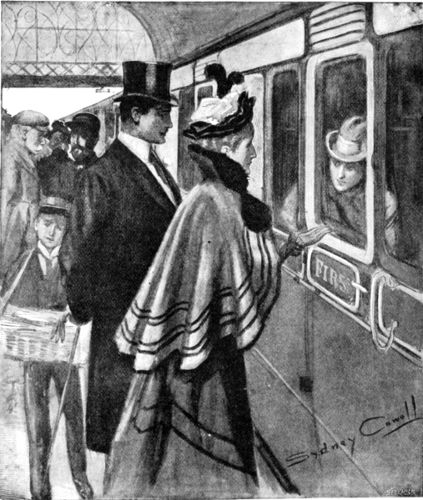 LUMSDEN COULD ONLY SAY, "WHY DID YOU NOT TELL ME YOU
WERE GOING AWAY?" WHEN MRS. BLADON BROKE IN—
LUMSDEN COULD ONLY SAY, "WHY DID YOU NOT TELL ME YOU
WERE GOING AWAY?" WHEN MRS. BLADON BROKE IN—
The train began to glide out of the station, and only a last sweet smile remained to Lumsden as Mrs. Bladon and he were left standing together on the gloomy platform. Then, when the train had passed out of sight, he swung round and faced Mrs. Bladon with a half-contemptuous smile in his dark, keen eyes.
"Well?" he said, coolly.
She laughed.
"Is it well?" she said, lightly. "You were hardly in time, were you? Nancy will have a delightful time with the Forsyths. Italy, perhaps Algiers; a charming tour away from this fog."
He threw up his head with a sudden characteristic gesture.
"Yes—of course. It was sudden, though. Why was I not told of it?"
They were walking out of the station, and Mrs. Bladon fastened her furs closely round her. It was bitterly cold.
"My dear Mr. Lumsden," she said, airily, as he opened the door of her carriage, "am I answerable to you for my doings? And you know it is best."
"Are you sure of that?" he said, coolly. "Perhaps there are two opinions about it. I am a fatalist, Mrs. Bladon."
"Really? I envy you. Can I give you a lift? No? Then home, James."
Lumsden walked quickly away, his pulses beating fast.
Stay. He had an idea—a brilliant idea. He would not accept defeat so easily. It was early in the day, and he was free for a month. In a month one may do wonders.
The sun was shining with dazzling brilliance as the Orotava dropped her anchor between the lightships in Gibraltar Harbour, in the shadow of the great grey rock; and as Nancy Bladon looked over the side, eagerly scanning the fascinating scene around her, something of the witchery of that sunny Southern air stirred her young blood, and made her pulses beat madly.
The Forsyths were going ashore, and, driving through the narrow streets, Nancy, viewing everything in the light of her own joyous youth, felt enchanted with the picturesque Moors.
As they returned to the ship, and ascended out of the heavy, flat-bottomed boat, another came alongside with several passengers. Lady Forsyth had gone into the saloon, leaving Nancy leaning against the rail in the dancing sunshine. Presently she half turned round, and—found herself face to face with Ted Lumsden!
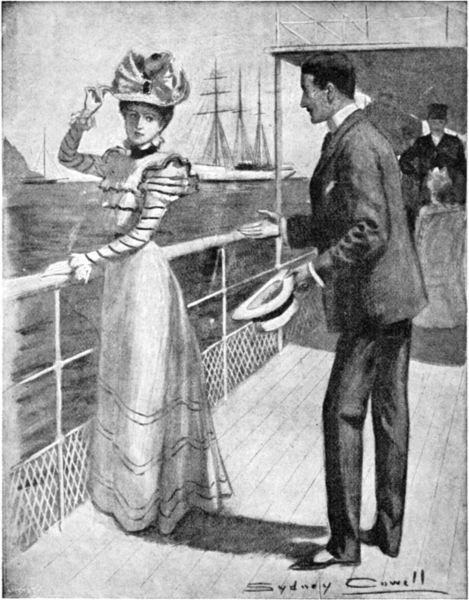 "SHE HALF TURNED ROUND AND FOUND HERSELF FACE TO FACE
WITH TED LUMSDEN."
"SHE HALF TURNED ROUND AND FOUND HERSELF FACE TO FACE
WITH TED LUMSDEN."
He, cool, nonchalant as ever, took her hand, with a quick smile.
"Well, so you see I am also going abroad—for my health."
There was a significance in the words which made the warm blood leap to Nancy's cheeks.
"But how did you come?" she said, in tones of the utmost astonishment.
"Overland—to Algeciras," he returned, coolly. "Caught the Orotava nicely, and had a day to spare in Gibraltar. Now that I am here, you will not send me away?"
"Why should I?"
In that moment she understood her mother's tactics. Why should she run away from Fate in the shape of Lumsden?
Lady Forsyth, returning to her charge as they steamed away into the Mediterranean, found her engaged in what appeared to be a very promising flirtation, such as would surely have delighted the heart of clever Mrs. Bladon.
She was secretly charmed with Lumsden, whom she had not noticed at Paddington, and to her letter to Mrs. Bladon, which she was writing to post at Naples, she added a postscript which filled that lady with unholy joy:
"Be quite easy about Nancy; I think all danger is over. A flirtation is in grand progress, and, between ourselves, the man is charming."
She quite forgot to mention his name, which, perhaps, was quite as well for that lady's peace of mind.
To Nancy and Lumsden there ensued a period of bliss. Steaming down the Mediterranean, with very little motion to disturb the equanimity even of Lady Forsyth, what halcyon days those were when, after dinner, in secluded corners of the deck, under the brilliant Southern moon, they walked up and down—silent very often, with the silence of a perfect understanding—till one fateful evening when Lumsden resolved to know his fate.
"Do you know, Nancy," he began (he had never called her Nancy before), "before you came away I think your mother took a dislike to me?"
"Oh, no—how could she?" said Nancy. "She always said she liked you. Besides——"
She paused abruptly, and Lumsden stole a glance at her half-averted face, which in the moonlight looked strangely sweet.
"Well, I called to see you several times, and you were always 'not at home.'"
Nancy started.
"Then that day at the station—well, I began to see," he continued, "and I resolved to wait no longer. Nancy, I[Pg 650] followed you. I never knew till then how much you were to me; and now can you trust me more and love me a little? I have loved you—always—darling."
Then the inevitable question arose—what would Lady Forsyth say? and further, what about Mrs. Bladon?
Nancy suggested, and her suggestion was accepted, that Lady Forsyth should be confided in. So it came to pass that the following morning Lumsden and Lady Forsyth sauntered up and down the deck for some time together, and for ten minutes Lumsden spoke, in cool, level tones, at the end of which time Lady Forsyth laughed and shook her head reprovingly.
"Oh, you men!" she said. "Well, I suppose I can say and do nothing. It only remains for you to have it out with Mrs. Bladon. I have my own opinions."
Lumsden laughed.
Their eyes met with a look of mutual understanding.
"So have I," he said, drily. "Mrs. Bladon is a clever woman. If this sudden voyage had not taken place, who knows but that we might still have been in the throes of uncertainty?"
"Ah!"
It was very clear now to Frances Forsyth that Mrs. Bladon's manœuvre had been well timed.
For a few short happy days they lingered in Naples, revelling in its beauty.
Then it was arranged that Lumsden should return to England alone, and see Mrs. Bladon. He felt he could not spare so long a holiday abroad, and now that his journey had not been in vain he found himself once more in foggy London, light of heart, cheerful, and cool as ever.
The lamps were lit when he was shown into the drawing-room where Mrs. Bladon was busy at her writing-table, and he noticed with some inward mirth that there was a distinct increase of cordiality in Mrs. Bladon's manner.
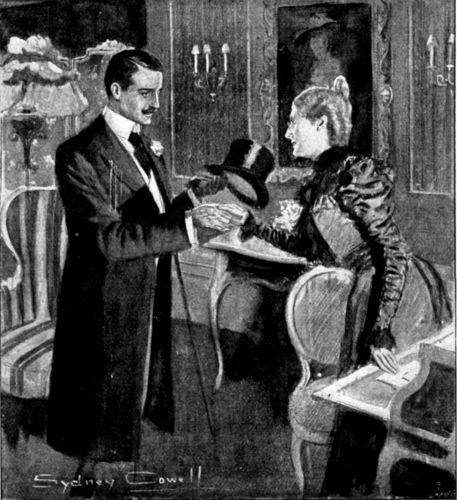 "LUMSDEN NOTICED WITH INWARD MIRTH AN INCREASED
CORDIALITY IN MRS. BLADON'S MANNER."
"LUMSDEN NOTICED WITH INWARD MIRTH AN INCREASED
CORDIALITY IN MRS. BLADON'S MANNER."
"You're quite a stranger, Mr. Lumsden," she began; "surely you've been out of town. Wise man! If I could only leave these terrible fogs and bitter winds!"
"Yes, Italy now is delightful."
Mrs. Bladon smiled unconsciously.
"Delicious, so Nancy says. Dear child, this trip is doing her a world of good. She writes such bright, happy letters; and indeed—you are an old friend of hers, Mr. Lumsden, and there is no harm in telling you—I think, from what Lady Forsyth has told me, that our dear child has found her fate. I know nothing definite, but one can read between the lines."
"Quite so," said Lumsden, with praiseworthy gravity, "Miss Nancy is looking very blooming, I assure you, and we have had a delightful trip. I found that a short holiday was quite necessary for my health, and, oddly enough, I just hit off the Orotava at Gibraltar. That overland service is very useful. So I thought I would come in and let you know how Nancy was."
There was a moment's tense silence, during which they looked at each other steadily, Lumsden with a touch of cold mirth twinkling in his handsome eyes.
"Well?" she said, with a half-mocking smile, while a great triumph swelled within her.
Lumsden laughed.
"Well, shall I tell you how Nancy found her fate—and I mine? But that is a stale story. I found mine long ago, but somehow I never quite realised it till——"
"Yes?"
"That day at Paddington."
"Ah! Well, Ted—I suppose I may call you Ted?—of course you must speak to Colonel Bladon. For myself, Nancy must always please herself, and her choice is mine. Now I can see how delightful the voyage must have been to you both. You are very clever, Ted."
He laughed happily.
"Is all the credit mine, Mrs. Bladon? I fancy not. Perhaps I may see Colonel Bladon and ask you for a cup of tea."
To Colonel Bladon the whole thing seemed inexplicable.
"You sent the child away from the fellow," he said, sleepily, after Lumsden had left, "and now that they have fallen into each other's arms you are delighted. The inconsistencies of woman! Their name is legion."
"How dense you are, Roger! Don't you see that things might have hung fire if it hadn't been for that trip abroad?"
Colonel Bladon sat up and looked at his wife.
"By Jove! You're a clever woman."
And she was.
 THE START—HOW THE AMERICAN ENGINE LOOKED AT 7 A.M.
THE START—HOW THE AMERICAN ENGINE LOOKED AT 7 A.M.
A WORLD'S RECORD FOR ENGLAND.
By Frederick A. Talbot.
That anomalous principle, friendly rivalry, which exists between the various railway companies of the world, is responsible for many extraordinary performances.
One of the most interesting, and certainly one of the most curious, of these has been the attempt by three different companies—two on this side of the water, and one on the other—to erect a locomotive in less than twenty-four hours, and so far the palm has to be awarded to an English company.
By building is simply meant the assembling of the thousand and one intricacies that constitute the iron steed of to-day, and not the manufacture of these innumerable parts, as it is perfectly obvious, even to the most uninitiated, that such a feat is absolutely impossible, under the present circumstances, in such a brief space of time. The accomplishment of such brilliant performances, however, speaks volumes for the skill, efficiency, and pride of the men engaged in such herculean tasks; the organisations of the railroads; the good feeling prevalent between the masters and the men; and lastly, but by no means least, the splendid standard of perfection attained by the gigantic machinery for the execution of the work with precision and thorough regard to gauge, thus enabling the parts to fit as accurately, and move as smoothly, as the cog-wheels of a watch.
The first record-breaking in this direction was attempted so far back as February 1878, by J. Deans, the well-known engineer of the London and North-Western Railway, and the engineering works of this company at Crewe. The class of engine selected for the operations was one of their standard coupled six-wheeled goods engines.
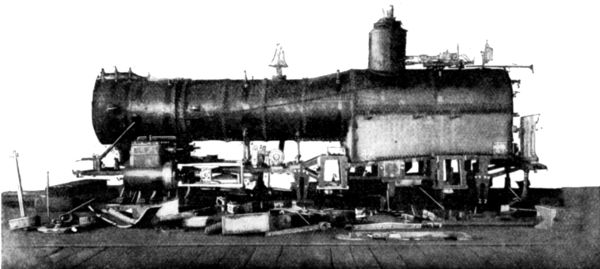 THE ENGINE AT 12 O'CLOCK, AFTER 5 HOURS' WORK.
THE ENGINE AT 12 O'CLOCK, AFTER 5 HOURS' WORK.
The engine was taken out of the erecting shop, complete in every detail, having been erected in the extremely short time of 25 hours 30 minutes. It may be as well to mention that only the actual working[Pg 652] time devoted to the engines is considered, and although about two and a half days elapsed before the engine was completed, only 25-1/2 hours were really occupied in its erection. That same day the engine ran a trial trip, and was afterwards sent back to the shops for a final coat of paint.
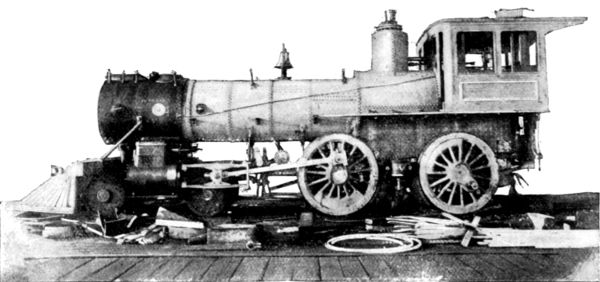 RESULT OF 10 HOURS' WORK ON THE ENGINE.
RESULT OF 10 HOURS' WORK ON THE ENGINE.
Some ten years elapsed after the establishment of this record before another effort was made to erect an engine within twenty-four hours. On this occasion it was the Pennsylvania Railroad Company, one of the largest railroad companies in the United States, possessing over 8,000 miles of railway track, which is about equal in extent to almost three of our leading railway systems combined. The engine selected on this occasion was also a tank of the light passenger type, with cylinders 17 inches in diameter and a 24-inch stroke, driving wheels 62 inches in diameter, and with a total weight when in complete working order of 96,300 lbs., or about 43 tons. It was erected under the supervision of Mr. F. L. Sheppard, General Superintendent of the Pennsylvania Railroad Company, at the company's works at Altoona, Pennsylvania.
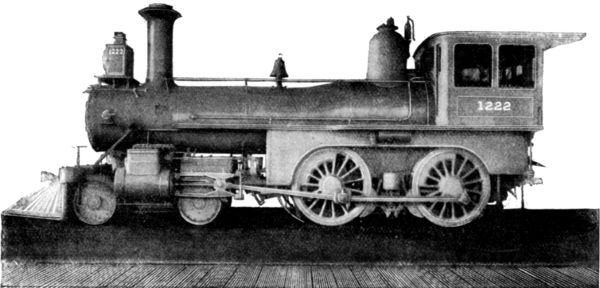 FINISHED!—THIS ENGINE WAS BUILT IN 16 HOURS 50 MINUTES.
FINISHED!—THIS ENGINE WAS BUILT IN 16 HOURS 50 MINUTES.
Although in this instance the engine was a little more complicated than that erected at Crewe, owing to the bogie-wheel provision in the fore part of the engine, it cannot be said, on the whole, to have been such a brilliant performance as that accomplished at Crewe; for whereas in the London and North-Western sheds, when the commencement was made, the frame plates were simply lying on the trestles without any attachments of any description whatever, at the Altoona works, when operations were commenced at 7 a.m. on Monday, June 18th, 1888, not only were the[Pg 653] frame plates in position, duly riveted or bolted, and complete with cross bars, but the cylinders were also accurately placed.
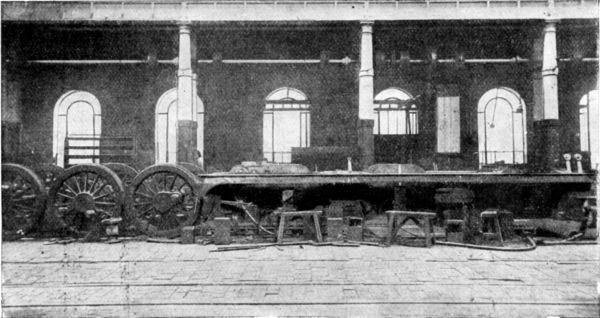 GREAT EASTERN RAILWAY ENGINE AFTER 3 HOURS 52 MINUTES' WORK.
GREAT EASTERN RAILWAY ENGINE AFTER 3 HOURS 52 MINUTES' WORK.
Now, considering that in the effort at Crewe these operations alone occupied over six hours, it is absolutely impossible to place the Altoona experiment on all fours with the London and North-Western performance of 1878.
In the case of the American engine the foundations were practically completed before it entered the erecting shed.
Under these circumstances the first thing that the workmen had to do was to place the boiler in position upon the prepared frame, which had the majority of the tubes and fittings in position before it was placed in the hands of the engine-erectors. At twelve o'clock noon, however, after five hours' work, it was safely fixed, and the hardest part of the undertaking was thus successfully accomplished. Up to this stage, as will be seen from the illustrations, the whole of the engine so far erected was resting upon those little unpretentious, though indispensable, mechanical contrivances—jacks. These had now to be removed to make way for the wheels which were ready waiting to be inserted. Part of the motion was also installed, as well as the cow-catcher and cab.
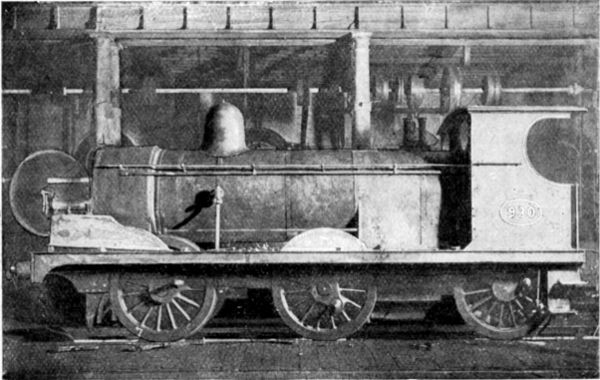 GREAT EASTERN RAILWAY ENGINE BUILT IN 8 HOURS 22
MINUTES.
GREAT EASTERN RAILWAY ENGINE BUILT IN 8 HOURS 22
MINUTES.
While these operations were in progress, an army of painters had entered upon the scene with their pots and brushes, and soon were displaying the arts of[Pg 654] their craft upon the barrel of the boiler. The change of colour between the painted and unpainted portions is easily distinguishable in our illustration on page 652.
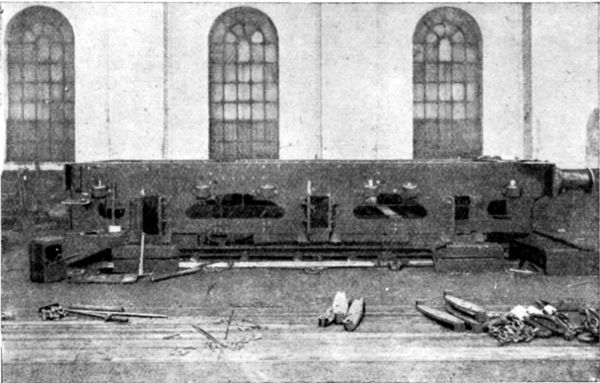 A FOUR HOURS OLD TENDER.
A FOUR HOURS OLD TENDER.
When the men arrived at their work at seven o'clock on the following morning, they had only to put the finishing touches to the engine, such as the funnel, dome, the remainder of the motion, and other minor adjustments, while the painters gave the entire engine a complete coat of paint. At ten minutes to three in the afternoon of the same day the engine was completed, with steam up ready for trial, having been erected in 16 hours 50 minutes, thus beating the London and North-Western record by some eight and a half hours; and although it cannot be contrasted with the accomplishment at Crewe, yet it is still a wonderful performance.
The English locomotive builders, however, were determined to wrest the laurels away from the American company, and thus retrieve their paramount position. In December 1891, the Great Eastern Railway Company, which has been the pioneer in many ramifications pertaining to railway matters, entered the field of the competition, and succeeded in establishing a record which completely eclipses the wonderful performances at Crewe and Altoona. In this last instance an engine was erected in the phenomenally short time of ten hours. The Great Eastern, however, besides lowering one record, created another at the same time. In the previous efforts, the engines erected had been only tanks, but the latest competitors beat the record with an engine and tender!
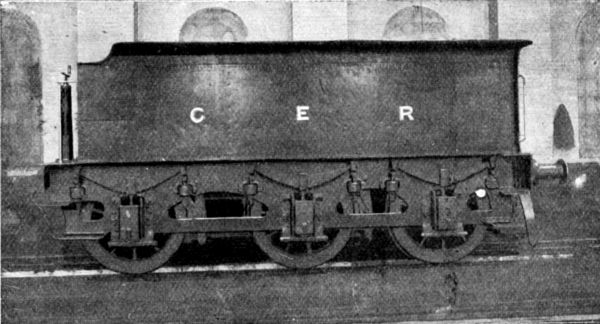 THIS TENDER WAS BUILT IN NINE HOURS.
THIS TENDER WAS BUILT IN NINE HOURS.
The engine erected was one of the six-wheel coupled goods type, of which there are between two and three hundred in existence already upon the Great Eastern Railway system. The cylinders are 17-1/2 inches in diameter, with a stroke of 24 inches, while the coupled wheels are 57 inches in diameter. When running in[Pg 655] complete working order, the engine itself weighs 37 tons 2 cwt., augmented to 67 tons 12 cwt. with the tender. The latter has a capacity for 2,640 gallons of water, and three tons of coal.
The engineering works of the company at Stratford was the scene of the remarkable engineering feat conducted under the superintendence of Mr. James Holden, the designer of the style of engine selected, and also the chief engineer to the Great Eastern Railway.
The commencement was made at eight minutes past nine on the morning of Thursday, December 10th. The start was similar to that at Crewe, with the frame plates lying on the ground with nothing more attached to them than the horn blocks and spring brackets. The number of men employed in constructing the engine was 85, including 39 fitters, assisted by 3 boys, 2 smiths, and 44 boiler makers, riveters, etc.
At eleven minutes after the word was given to commence, the first rivet was driven into the frames; nine minutes later, the foot-plate casting was fixed, and at twenty-six minutes after the start the motion plate was placed in position. The cylinders came next, and occupied another fifty minutes for their insertion in the requisite place.
At twelve o'clock, when the men left off work for their dinner, they had been four hours all but eight minutes upon the task.
It will be seen in our illustration that the fundamental parts of the base of the engine are completed, while the wheels are standing on the rails at the foremost end ready for adjustment. These were inserted soon after the men resumed operations after dinner, the frame of the engine being raised by means of the jacks to a height sufficient to allow the wheels being rolled along to the necessary position. The axle boxes, connecting-rod, and coupling-rod brasses were shortly afterwards fixed.
Previous to the installation of the wheels, the boiler was brought into the shed and mounted upon the frame. It was without the smoke-box, cab, or copings, which had to be fixed subsequently. At 4.15 p.m. the men were engaged in setting the valves, which task was still incomplete when they ceased work for the day, after 8 hours 22 minutes had been expended upon the engine. The engine at this stage is represented in our illustration, being, as will be seen, almost complete.
The next morning, when work was recommenced at six o'clock, the valve setting was continued, not being completed until seven o'clock. The painters now appeared, the engineers placed the finishing touches, and at ten minutes past nine, 9 hours 47 minutes from the start, the engine was complete.
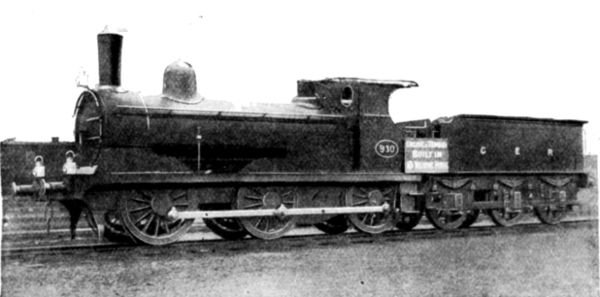 THE GREAT EASTERN RAILWAY BEAT THE WORLD'S RECORD BY
PUTTING THIS ENGINE AND TENDER TOGETHER IN 9 HOURS 47 MINUTES.
THE GREAT EASTERN RAILWAY BEAT THE WORLD'S RECORD BY
PUTTING THIS ENGINE AND TENDER TOGETHER IN 9 HOURS 47 MINUTES.
While this hive of workmen were engaged upon the engine, another army of workers were just as busily engaged upon the erection of the tender.
The men worked away with a will, and in four hours they had the tender half completed, and succeeded in finishing their entire task three-quarters of an hour before their fellow workmen engaged on the engine. Fifty-two men were engaged upon the erection of the tender, comprising sixteen fitters, the same number of boiler-makers, and twenty labourers, riveters, etc.
As soon as the engine was finished it was connected with the tender and taken out of the shops to be photographed. Meanwhile, steam had been supplied, and later in the same day the trial trip was performed. This being satisfactory in every particular, the engine was immediately placed upon the regular goods service running between Peterborough and London.
A STUDY OF THE FACES OF MURDERERS.
By J. Holt Schooling.
[Member of Lord Egerton of Tatton's Committee on the Mental and Physical Condition of Children.]
If you walk along the Strand from Charing Cross to Temple Bar, and back to Charing Cross on the other side of the street, any day at an hour when London hums with life, you probably meet at least one man who has either done a murder or who will do murder before he dies. Perhaps his shoulder rubs yours, or, in the jostle, you kick his heel; perhaps you catch a passing glance from a pair of sinister eyes that somehow causes you to feel a moment's vague uneasiness, or, as is more likely, you walk unconscious of a possible contact with murder—but it's there.
I do not now refer to persons tricked into committing murder by the perfidy of circumstances (such persons, for example, as the old man Viney and the young woman Shoosmith, both lately respited), to many of whom a fatal provocation has come at a moment of weakness or of passion, and who, but for that unsought provocation, would have been free from murder; but I do now refer to those men and women who are by nature and inclination callous, scheming, unscrupulous, and insensitive to any pain or injury inflicted by them upon their fellow-creatures, and who are merely human beasts of prey.
The sense of self-preservation possessed by all animals, but not possessed in such a high degree, perhaps, by human beings as it is possessed by many of the lower animals, carries with it an instinctive recognition of approaching danger from some other animal. Nature does in many cases, perhaps in all, hold up to us certain danger-signals, and if we were to let our natural instinct guide us—as dogs and young children are instinctively guided—we might often avoid grave evils that come to us from the human beasts of prey: cunning fraud, no less than actual murder, is not allowed by Nature to walk through the world without tell-tale evidences of its approach that ought to warn us. But, as adults, we usually ignore the finer and more delicate suggestions of our natural instinct, and we are guided much too often by what we think is "reason," or by what we believe to be our "best interests"—and then we are more or less mauled, in our pocket or in our person, by one of the many human beasts of prey, when prompt obedience to our instinct would have saved us.
Look at these faces. There is not one of them which cannot easily be more or less closely matched as you walk about the streets of a big city, or even, but naturally with less frequency, as you notice faces in country districts. There is, of course, no typical murderer's face. But all of these faces are bad faces; they warn you off. In some instances (Nos. 1, 2, 3, 6, and 8, for example) the danger-signal is so plain that not even the most casual observer can fail to see it; each of these faces speaks for itself. In[Pg 657] other instances, the warning is not so plainly shown, especially as in these photographs you cannot see the colour of the eye and its exact expression; but in no instance does any one of these faces inspire you with sympathy, they all cause a feeling of aversion or of distrust; and we, if we are wise, should not put aside as fanciful that instinct in us which gives to us similar warnings in everyday life.
Look at No. 5. The points which constitute a danger-signal in this callous villain's face, occurring as they do in one face, are the massive lower jaw, the thick "blubber" mouth destitute of a shade of sensitiveness, backed up by the massive and long upper lip, the great width between the cheek-bones, the broad insensitive nostrils, the angry forceful shape and angle of the eyebrows, and last, but not of least importance, a pair of hard, cold, blue eyes without a spark of feeling in them. All these things, coming as they do in one face, fit in well with this cold-blooded and insensitive murderer, who, while in prison on his trial, wrote an order for his dinner: "Pig to-day, and plenty of plum sauce."
In No. 7, there are, amongst other bad signs, a coarse and cruel mouth, great prominence of cheek-bones, and again those terrible hard blue eyes, as cold as flint.
No. 8 speaks for itself, and you see in No. 9 an abnormal animal development of the lower jaw, very great width between the cheek-bones, and the eyes are a cold, treacherous, hard blue.
No. 10 was a French peasant, who, with his wife (see No. 18), lived by decoying young women, under the pretence of getting them situations, into a wood near Lyons. When the victims came, Dumollard and his wife killed them by garrotting, and after taking all valuables, these wretches put the bodies of the young women into a new-made grave, previously prepared. This man's face is a dreadful face, and the brow reminds one of a gorilla. Look at the two faces (Nos. 10 and 18), and imagine the degree of denseness of perception of approaching danger that must have been present in the poor victims who would negotiate with such wretches as these Dumollards.
The danger-signal is shown plainly enough in No. 11. This wretch poisoned a large number of persons for the sake of petty gains with the unconcern of a farm girl who wrings the necks of poultry. She had thick-looking, dark brown eyes, muddy and hard.
No. 12 is a shocking bad face. The lower jaw runs back a long way and is then very pronounced—always a sign of animality, although in men of intellect and feeling this same quality may often be innocuous, and even useful as supplying energy; the mouth, especially when seen full-face, is very coarse, and the lips thick and heavy; the nostrils are very wide at their base, the ears are noticeably bad, and the eyes are light blue and as hard as a flint.
By the way, and in order to avoid a possible misconception on the part of my readers who may think I am bringing an indictment against blue eyes generally, I ought to expressly state that this is not the case. Many of the kindest and best people living have blue eyes, but their eyes are not the same sort of blue eyes that nearly all deliberate murderers have (of the twenty-two persons here included, fourteen have blue eyes, six brown, and two have hazel eyes): the blue eyes I refer to must have been noticed by everyone, and must have inspired aversion, or at any rate a lack of sympathy, for, of all eyes, the hard, cold, blue eye is perhaps the least human or humane. Some of the finest soldiers and men of practical affairs have blue eyes, which, without being in any way unpleasant, are yet those of men who, rightly enough, never let an undue sensitiveness interfere with their actions. These men may be honourable and excellent men, but they are essentially practical, and are guided by their head rather than by their heart, and they are often of immense service to the nation. Lord Kitchener has splendidly resolute blue eyes of this sort, but they are entirely different from the sinister blue eyes that are in nearly all the faces now shown. The one sort inspires you with confidence, the other with aversion.
No. 13 is the face of one of the most cold-blooded poisoners that ever lived. Under the guise of love or friendship he killed his many victims for the sake of gold, coolly smiling at the torture he inflicted, and nicely calculating the effect of each dose of poison. How could anyone have trusted such a face as this? The immense development of the face below the brow, its enormous width between the cheek-bones, the absolute and sickening plausibility of the whole expression, the great lower jaw, the cruel callous mouth (look at this mouth closely), and the peculiarly uncanny light blue eyes, are a collection of danger-signals that are rarely seen in one face. But his victims were probably deceived by this wretch's fat, easy, and bland manner—they stifled their instinct, and were duly poisoned.
The lower jaw of No. 14 is quite Napoleonic in its strength and unscrupulousness, and this face carries its warning with it. So also does No. 15, which has a specially cruel and brutal mouth, widely-placed[Pg 659] cheek-bones, coarse wide nostrils, great width of head between the ears, and cruel blue eyes.
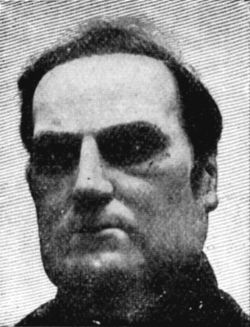 14. MANNING, WHO, WITH HIS WIFE, KILLED AND ROBBED A
FRIEND, WHOSE BODY THEY BURIED UNDER THE HEARTHSTONE IN THEIR KITCHEN.
14. MANNING, WHO, WITH HIS WIFE, KILLED AND ROBBED A
FRIEND, WHOSE BODY THEY BURIED UNDER THE HEARTHSTONE IN THEIR KITCHEN.
No. 16 carries a warning in his eyes, and No. 17 shows several of the danger-signals already pointed to; he also has those terrible hard blue eyes. The woman's face in No. 18 speaks for itself, and the face in No. 19 is one that instinctively creates aversion, although this man was perhaps the least atrocious of any of the persons here chosen on account of their deliberate wickedness. As is mentioned at the commencement of this article, I have picked out only deliberately wicked faces, not those of persons who have become murderers through a moment's passion, or through provocation.
There is a particularly ruthless expression in the mouth of No. 20, again the great lower jaw-bone going right back nearly square to the ear, and again the wide cheek-bones, with hard blue eyes, destitute of any flicker of softness or kindliness.
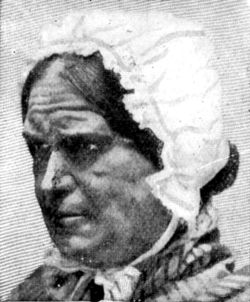 18. MADAME DUMOLLARD, WHO, WITH HER HUSBAND, DECOYED,
ROBBED, AND MURDERED NEARLY TWENTY YOUNG WOMEN.
18. MADAME DUMOLLARD, WHO, WITH HER HUSBAND, DECOYED,
ROBBED, AND MURDERED NEARLY TWENTY YOUNG WOMEN.
No. 21 is another of the impassive, mask-like faces, but it has a most sinister surface; the great bulging cheek-bones are very significant, and the eyes are treacherous and menacing. This man was so callous that he suggested that the place where he had buried his numerous victims should be called "Troppmann Cemetery."
One of the worst faces of the lot is No. 22, although the tell-tale mouth is hidden by hair. The eyes are very bad; they would by themselves give sufficient warning to most of us. Here, again, you see the development of cheek-bones and of the lower jaw at the back, which so often goes with a brutal nature, and the eyebrows are very threatening.
The last of these danger-signals is the face of Henry Benson, the remarkable swindler and forger who was mixed up with the "Great Turf Frauds" of some years ago (see No. 23). This man, who, after conviction, gave evidence against the detectives Druscovitch, Meiklejohn, and Palmer, was subsequently released on ticket-of-leave,[Pg 660] and later, being arrested for fresh frauds, committed suicide.
Looking at this face, one can scarcely conceive how the man succeeded as he did in deluding people—some of them of good social position. For example, in 1870 Benson personated the Mayor of Châteaudun in France, and nearly swindled the Lord Mayor of London out of charitable contributions for the benefit of sufferers from the Franco-German war. Benson was well educated, very clever, and inveterately wicked—he looks it. Notice the great bulge at the "hinge" of the lower jaw, and the cynically bad mouth; surely, this face plainly shows the absolute unscrupulousness of the man, backed up by plenty of resolute energy to make that unscrupulousness effectively dangerous.
There are many men now going about whose entire want of scruple is as plainly shown in their faces as it is in the face of Benson, but a passable exterior, a plausible manner, seems in many cases to put people quite off their guard. We are, I suppose, so accustomed to regard as sufficient a due attention to social conventions, that we have lost the more primitive sense of self-protection that, in more primitive conditions of society than our own, would be actively used by us for our own protection. Moreover, we have become accustomed to look to the law for protection, and this is, perhaps, another reason why our instinctive recognition of Nature's danger-signals has become dulled, and is now so much less effective than the instinct for danger which some of the lower animals possess in a high degree.
As I have already suggested, one or more bad signs may often be seen in the faces of persons who are good rather than bad, kind rather than brutal, honourable rather than treacherous. In such instances, the bad point is dominated by the good ones, and it may indeed be converted into a useful quality. For example, the animal brutality of a murderer may become in a good face the resolute energy of the man of action.
But where you see many bad signs collected in one face, and when you feel a certain instinctive aversion for a face, even though your reason or your supposed self-interest gives you no warning, then I say let your instinct have its way, and take the warning that Nature is holding up to you as a danger-signal.
This reliance upon instinct works both ways, moreover. It is equally foolish to distrust all men, as the cynics do, as it is to trust all men, as the imprudent do. In giving these necessarily scanty notes upon faces which contain some of Nature's most obvious danger-signals, my purpose is to warn people off the bad faces, and at the same time to encourage a belief in good faces; but in both instances, I suggest, let instinct be your guide, for in this matter instinct is often a far surer guide than reason.
Note.—These photographs have been specially taken from the models in Madame Tussaud's Exhibition. In expressing my thanks to Mr. John Tussaud for the facilities thus given, I must also express admiration of the art which produces these life-like models.—J. H. S.
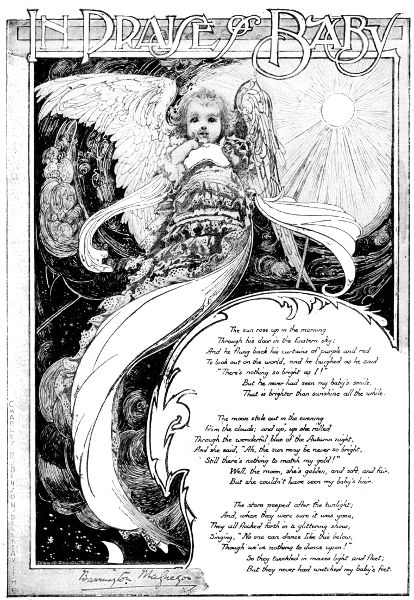
AN EPISODE OF THE RED SEA.
By Winston Spencer Churchill.[A]
Illustrated by Henry Austin.
It was a little after half-past nine when the man fell overboard. The mail steamer was hurrying through the Red Sea in the hope of making up the time which the currents of the Indian Ocean had stolen. The night was clear, though the moon was hidden behind clouds. The warm air was laden with moisture. The still surface of the waters was only broken by the movement of the great ship, from whose quarter the long, slanting undulations struck out, like the feathers from an arrow shaft, and in whose wake the froth and air bubbles churned up by the propeller trailed in a narrowing line to the darkness of the horizon.
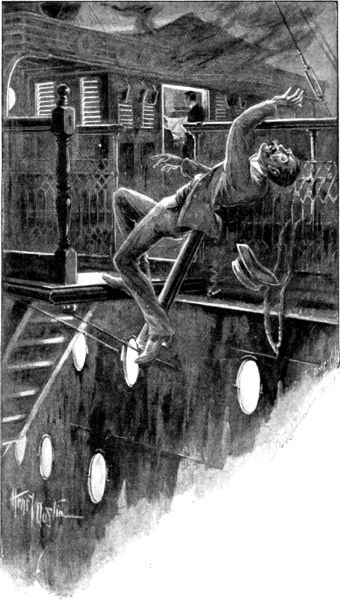 "THE RAILING GAVE WAY, AND HE FELL BACKWARDS INTO THE
SEA WITH A SPLASH."
"THE RAILING GAVE WAY, AND HE FELL BACKWARDS INTO THE
SEA WITH A SPLASH."
There was a concert on board. All the passengers were glad to break the monotony of the voyage, and gathered around the piano in the companion-house. The decks were deserted. The man had been listening to the music and joining in the songs. But the room was hot, and he came out to smoke a cigarette and enjoy a breath of the wind which the speedy passage of the liner created. It was the only wind in the Red Sea that night.
The accommodation-ladder had not been unshipped since leaving Aden, and the man walked out on to the platform, as on to a balcony. He leaned his back against the rail and blew a puff of smoke into the air reflectively. The piano struck up a lively tune, and a voice began to sing the first verse of "The Rowdy Dowdy Boys." The measured pulsations of the screw were a subdued but additional accompaniment. The man knew the song. It had been the rage at all the music halls, when he had started for India seven years before. It reminded him of the brilliant and busy streets he had not seen[Pg 663] for so long, but was soon to see again. He was just going to join in the chorus, when the railing, which had been insecurely fastened, gave way suddenly with a snap, and he fell backwards into the warm water of the sea amid a great splash.
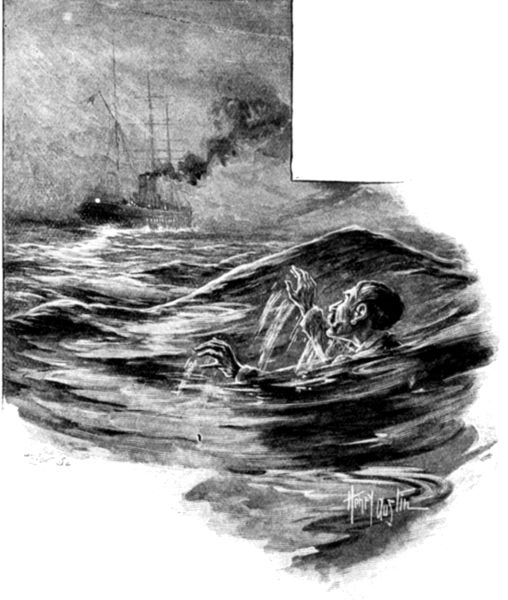 "THE LIGHT OF THE SHIP GOT SMALLER AND SMALLER AS HE
THREW UP HIS HANDS AND SANK."
"THE LIGHT OF THE SHIP GOT SMALLER AND SMALLER AS HE
THREW UP HIS HANDS AND SANK."
For a moment he was physically too much astonished to think. Then he realised that he must shout. He began to do this even before he rose to the surface. He achieved a hoarse, inarticulate, half-choked scream. A startled brain suggested the word "Help!" and he bawled this out lustily and with frantic effort six or seven times without stopping. Then he listened.
The chorus floated back to him across the smooth water, for the ship had already passed completely by. And as he heard the music a long stab of terror drove through his heart. The possibility that he would not be picked up dawned for the first time on his consciousness. The chorus started again—
"Help! help! help!" shrieked the man, in desperate fear.
The last words drawled out faint and fainter. The vessel was steaming fast. The beginning of the second verse was confused and broken by the ever-growing distance. The dark outline of the great hull was getting blurred. The stern light dwindled.
Then he set out to swim after it with furious energy, pausing every dozen strokes to shout long wild shouts. The disturbed waters of the sea began to settle again to their rest. The widening undulations became ripples. The aërated confusion of the screw fizzed itself upwards and out. The noise of motion and the sounds of life and music died away.
The liner was but a single fading light on the blackness of the waters and a dark shadow against the paler sky.
At length full realisation came to the man, and he stopped swimming. He was alone—abandoned. With the understanding his brain reeled. He began again to swim, only now instead of shouting he prayed—mad, incoherent prayers, the words stumbling into one another.
Suddenly a distant light seemed to flicker and brighten. A surge of joy and hope rushed through his mind. They were going to stop—to turn the ship and come back. And with the hope came gratitude. His prayer was answered. Broken words of thanksgiving rose to his lips. He stopped[Pg 664] and stared after the light—his soul in his eyes. As he watched it, it grew gradually but steadily smaller. Then the man knew that his fate was certain. Despair succeeded hope. Gratitude gave place to curses. Beating the water with his arms, he raved impotently. Foul oaths burst from him, as broken as his prayers—and as unheeded.
The fit of passion passed, hurried by increasing fatigue. He became silent—silent as was the sea, for even the ripples were subsiding into the glassy smoothness of the surface. He swam on mechanically along the track of the ship, sobbing quietly to himself, in the misery of fear. And the stern light became a tiny speck, yellower but scarcely bigger than some of the stars, which here and there shone between the clouds.
Nearly twenty minutes passed, and the man's fatigue began to change to exhaustion. The overpowering sense of the inevitable pressed upon him. With the weariness came a strange comfort. He need not swim all the long way to Suez. There was another course. He would die. He would resign his existence since he was thus abandoned. He threw up his hands impulsively and sank. Down, down he went through the warm water. The physical death took hold of him and he began to drown. The pain of that savage grip recalled his anger. He fought with it furiously. Striking out with arms and legs he sought to get back to the air. It was a hard struggle, but he escaped victorious and gasping to the surface. Despair awaited him. Feebly splashing with his hands he moaned in bitter misery—
"I can't—I must. O God! let me die."
The moon, then in her third quarter, pushed out from behind the concealing clouds and shed a pale, soft glitter upon the sea. Upright in the water, fifty yards away, was a black triangular object. It was a fin. It approached him slowly.
His last appeal had been heard.
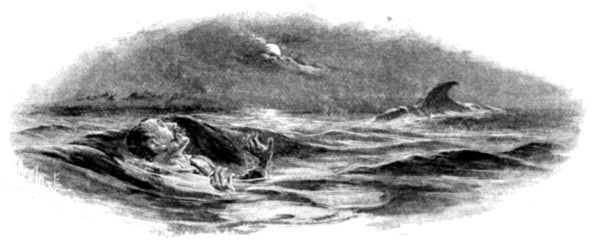 "UPRIGHT IN THE WATER, FIFTY YARDS AWAY, WAS A BLACK
TRIANGULAR OBJECT—A FIN."
"UPRIGHT IN THE WATER, FIFTY YARDS AWAY, WAS A BLACK
TRIANGULAR OBJECT—A FIN."
[A] As by a very remarkable coincidence there are two Winston Churchills, both writers, we may mention that this Mr. Churchill is the son of the late Lord Randolph Churchill.
NOW READY.
With the present January number Six Numbers of the Harmsworth Magazine have now been published, and they compose
Our First Volume.
Bound in the Elegant and Charming Cover,
of which a facsimile is given on page 594, its 672 pages form the most sumptuous Magazine Volume ever published. This First Volume of the Harmsworth Magazine is
ISSUED AT 4s. 6d.
and at that price it STANDS WITHOUT A RIVAL in Contents, in Attractiveness, and in Size.
Nearly every page of this volume is illustrated. Among its contents are over 60 Full Page Reproductions of famous and interesting pictures. The Stories number 39, and the Articles 53, and these are so varied as to suit all readers.
This Volume can be obtained from any bookseller or newsman, or it will be sent post free for 5s. 1d. on application to the Publisher, Harmsworth Magazine, 24. Tudor St., London, E.C.
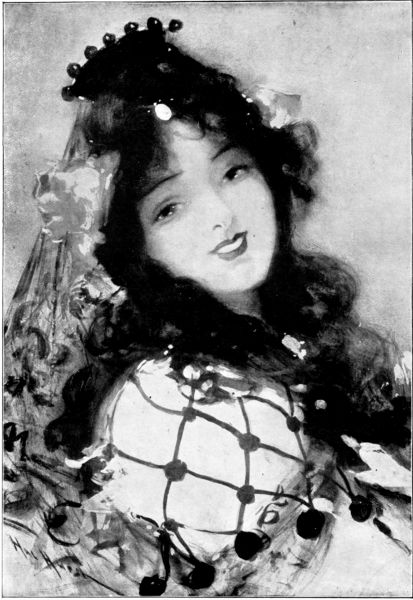 A SPANISH PEACE COMMISSIONER.
A SPANISH PEACE COMMISSIONER.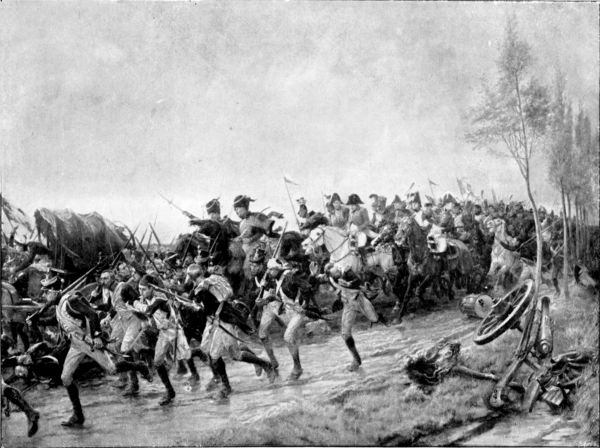 NAPOLEON'S FLIGHT AFTER WATERLOO—"SAUVE QUI PEUT!"
NAPOLEON'S FLIGHT AFTER WATERLOO—"SAUVE QUI PEUT!"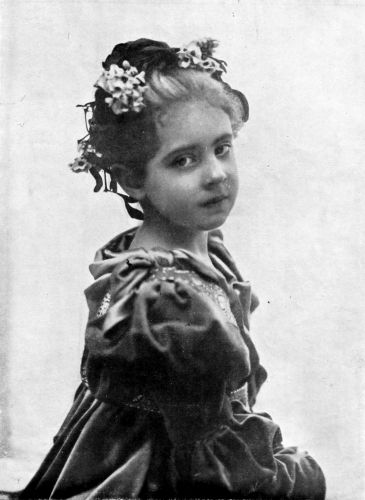 A LITTLE DEAR.
A LITTLE DEAR.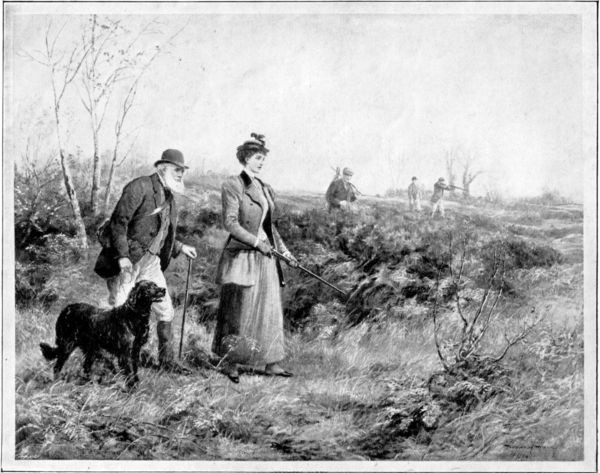 THE GIRL OF THE PERIOD.
THE GIRL OF THE PERIOD.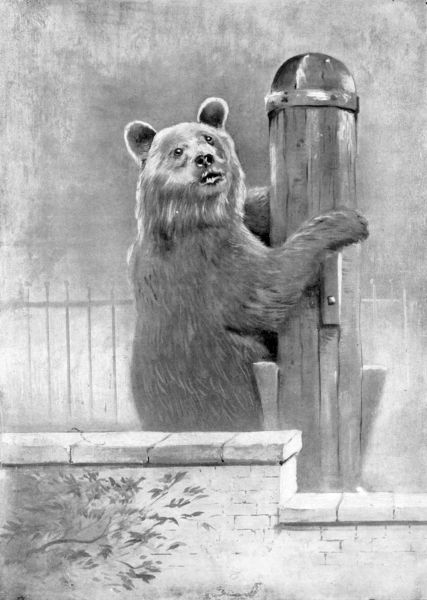 "ANDRÉE, INDEED! I WAS THERE LONG AGO!"
"ANDRÉE, INDEED! I WAS THERE LONG AGO!"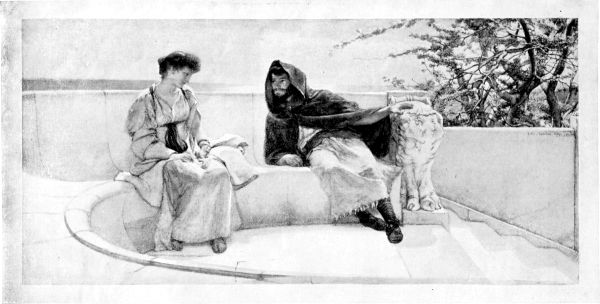 A VERY OLD, OLD STORY.
A VERY OLD, OLD STORY.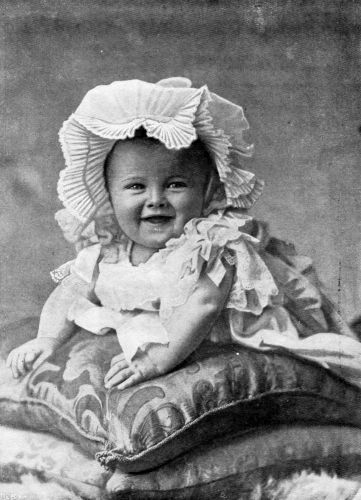 HAPPY AS A KING.
HAPPY AS A KING.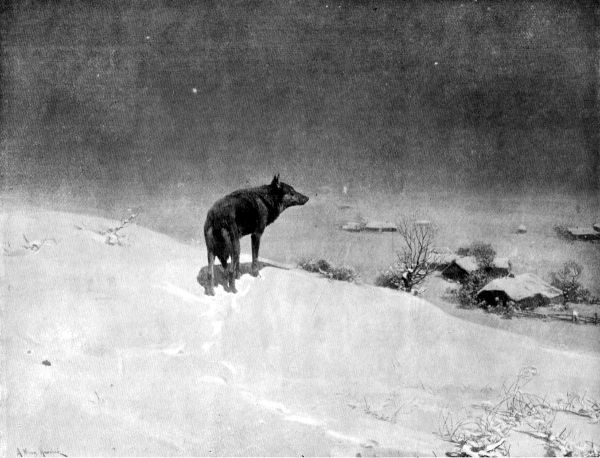 IN RUSSIA—THE TERROR OF THE PLAIN.
IN RUSSIA—THE TERROR OF THE PLAIN.Transcriber's Notes
The beginning title and Table of Contents were not part of the original
magazine. Some illustrations have been moved from their original positions in order
to avoid breaking up paragraphs of text.
Page 626: Retained "passed" although author meant "past".
(Orig.: I did not speak, but looked towards her, looked passed her)
Page 660: Corrected illustration number from 32 to 23.
(Orig.: 32. HENRY BENSON, SWINDLER AND FORGER.)